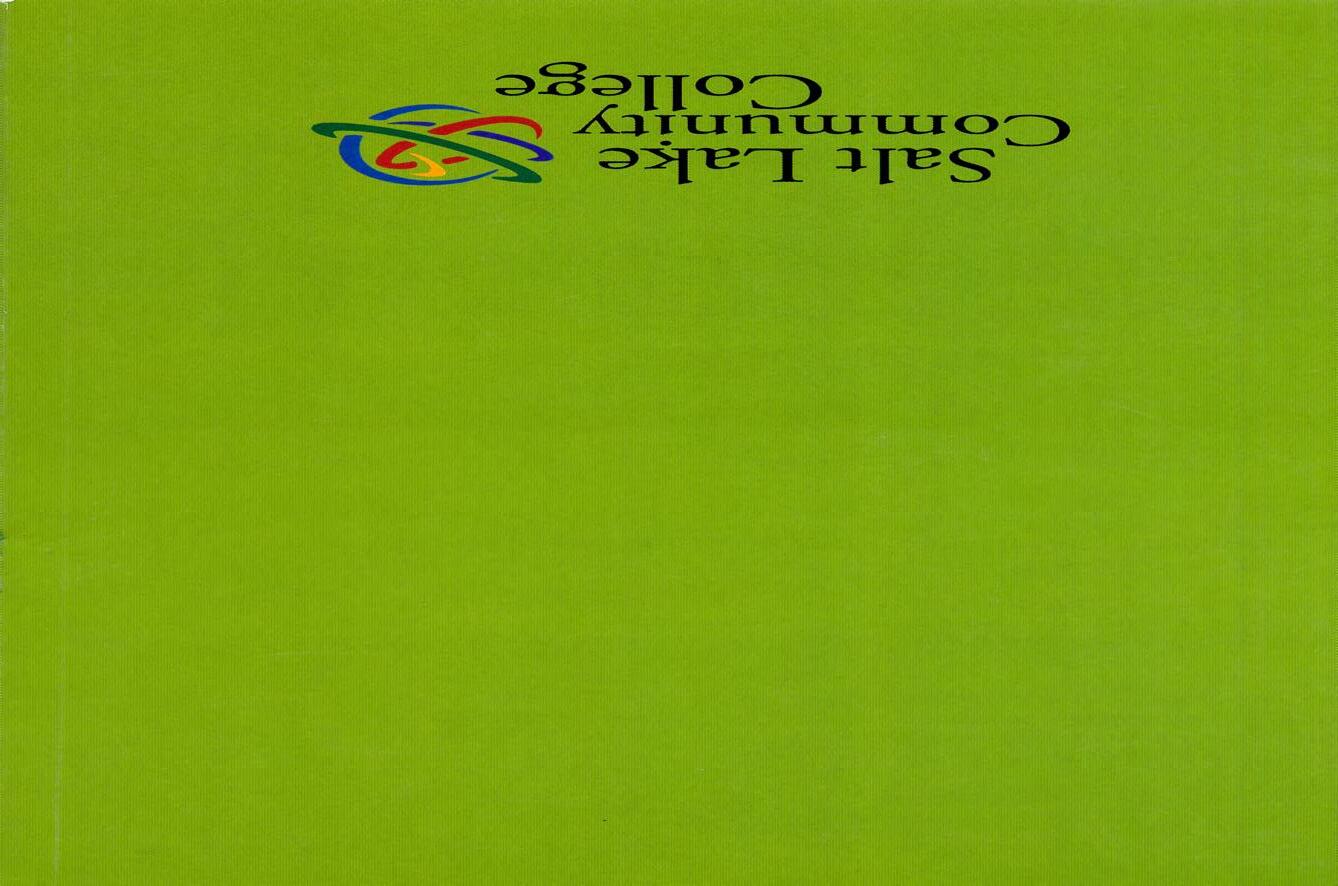




Editors:
Lauren Colucci
Dan Vincent
Writing Center Liaison: Clint Gardner
Faculty Advisor: Melissa Helquist
Cover Art: "Buy Me" Vanessa Bertagnole
Support provided by the School of Humanities and Social Sciences and the Student Media Council at Salt Lake Community College.
The Globe Media are open campus forums, and we encourage written expression of diverse points of view. Opinions expressed in Folio do not necessarily represent the views or opinions of Salt Lake Community College, the Student Media Council, or the Globe Media. Please send all submissions to folio@slcc.edu. Final publication decisions rest with the editors of Folio.
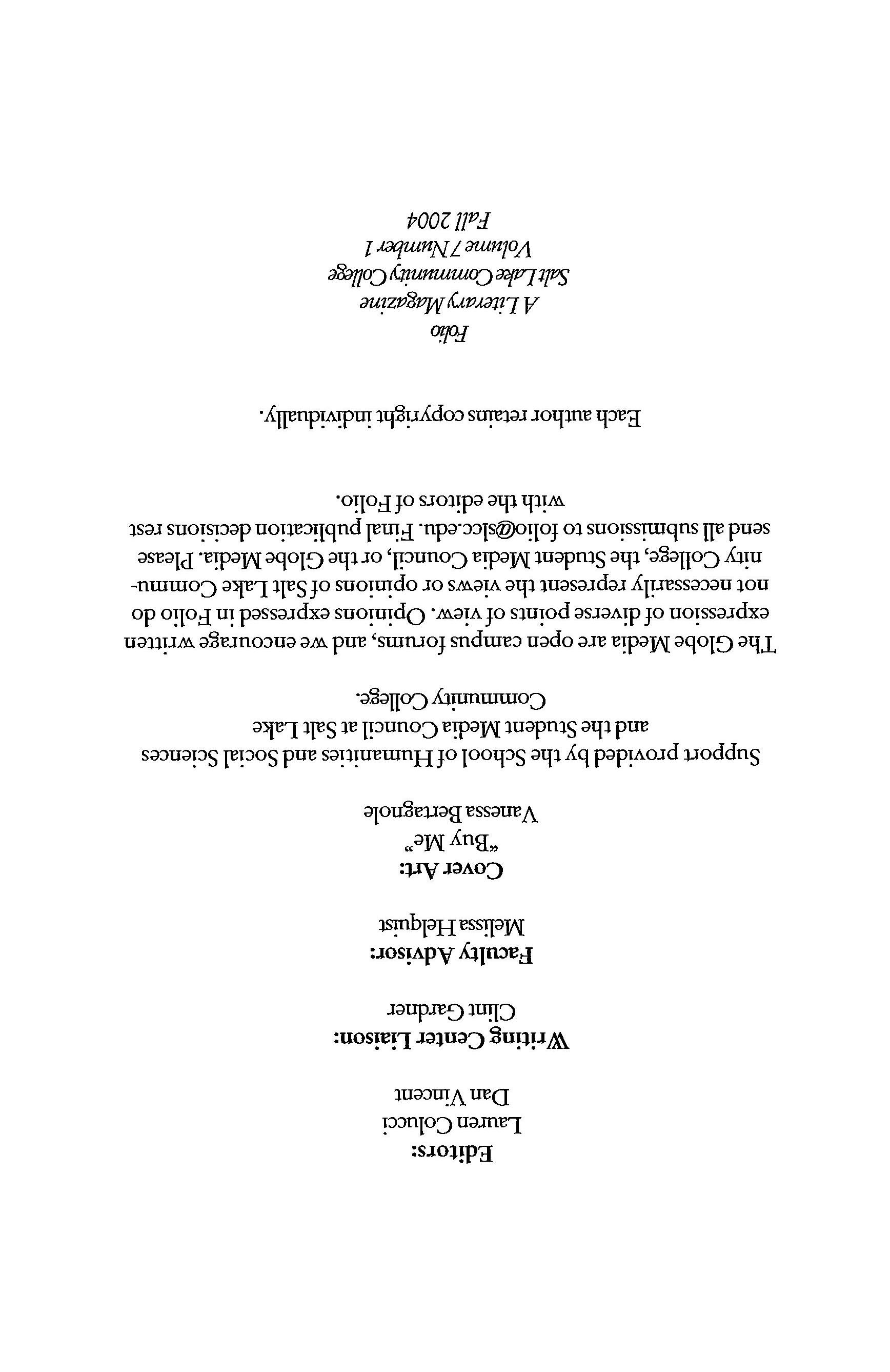
Each author retains copyright individually.
Folio
A Literary Magazine
SahLttkeCommunity Colkge
Volume 7Number 1 Fall2004
Submissions:
Folio publishes fiction, poetry, drama, essays and art. Submissions are accepted August-May from Salt Lake Community College students, and may be sent via e-mail.
Send literature in Microsoft Word and art in 300 dpi, CMYK format, to folio@slcc.edu.
Editorial Contacts:
Clint Gardner
Melissa Helquist
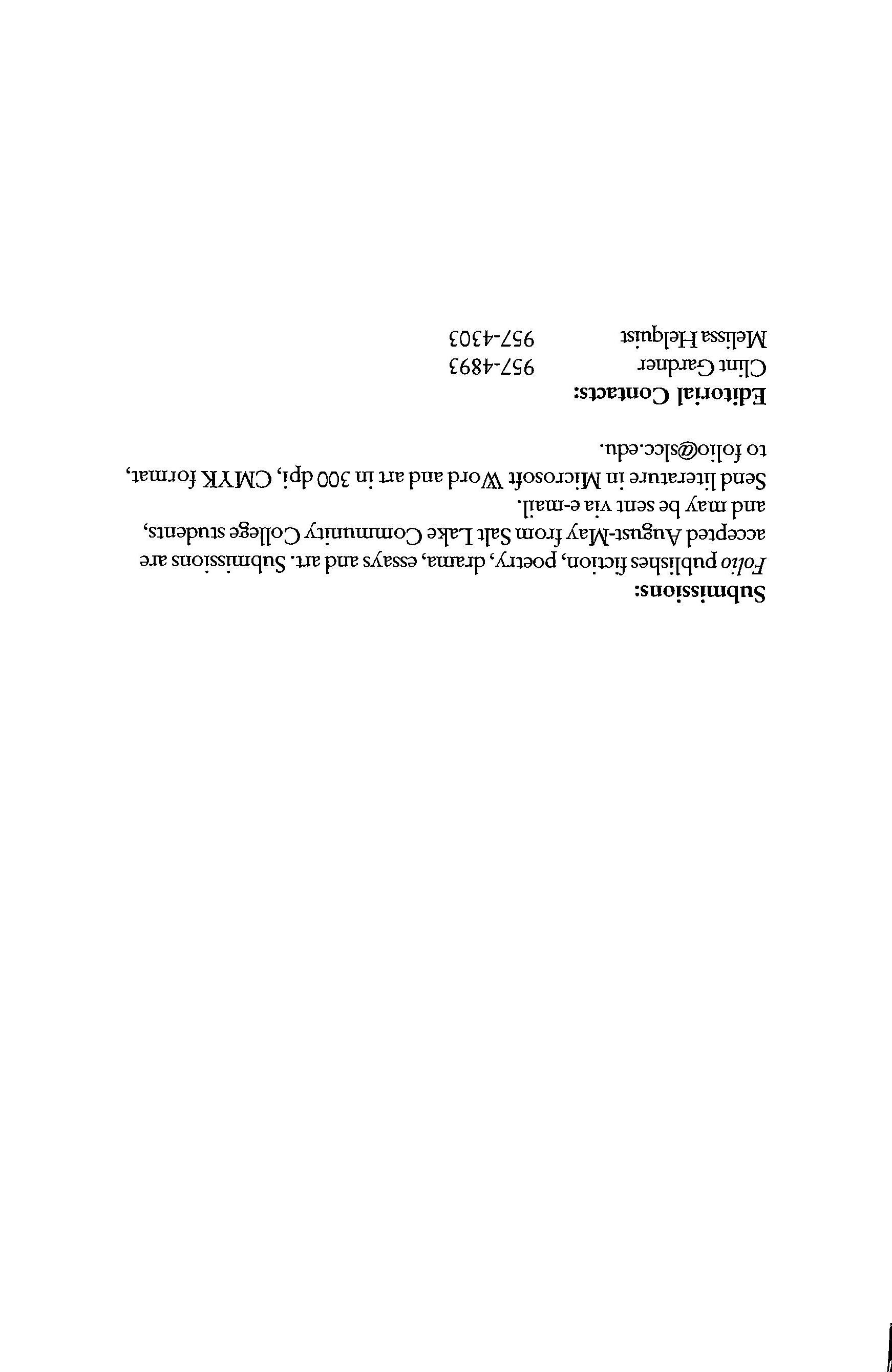
957-4893
957-4303
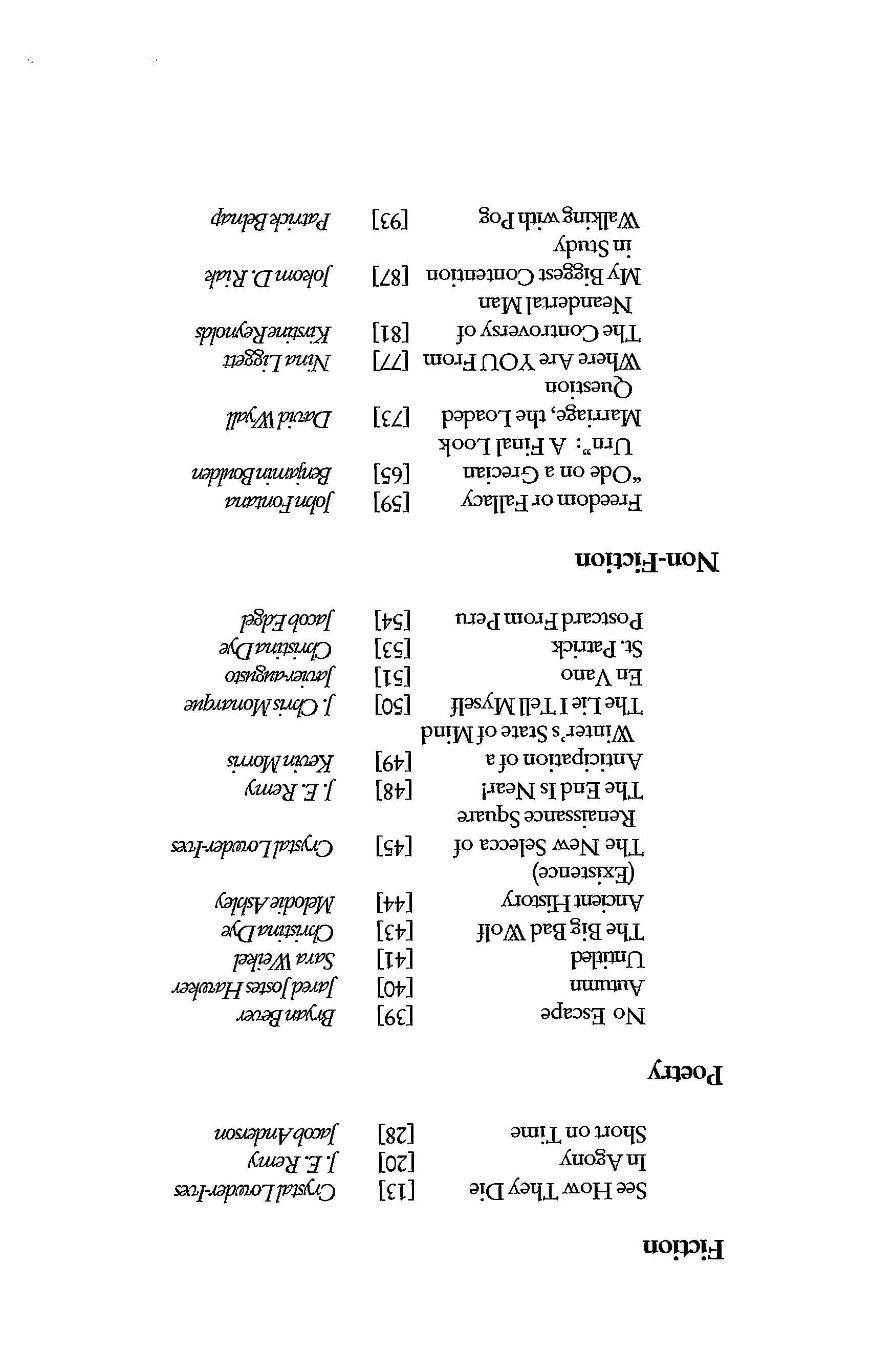
See How They Die [13] Crystal Lowder-Ives
InAgony [20] ].E.Remy
Short on Time [28] JacobArulersan
Poetry
No Escape [39] BryanBecer
Autumn [40] JaredJostes Hawker
Untitled [41] Sara Weikel
The Big Bad Wolf [43] ChristinaDye
Ancient History [44] MdodieAshky (Existence)
The New Selecca of [45] Crystal Lowder-Ives Renaissance Square
The End Is Near! [48] ].E.Remy
Anticipation of a [49] KevinMorris
Winter's State of Mind
The Lie ITell Myself [50] ]. CbrisManarque
EnVano [51] ]ctuier-augµst,o
St.Patrick [53] ChristinaDye
Postcard From Peru [54] Jacob Edge!,
Non-Fiction
Freedom or Fallacy [59] JolmFantana
"Ode on a Grecian [65] &njctminl3oulden
Urn": AFinalLook
Marriage, the Loaded [73] DavidW~ Question
Where Are YOU From [77] NinaLi?J!,ett
The Controversy of [81] KirstineReyndds
Neandertal Man
My Biggest Contention [87] ]olwmD. Riak in Study
WalkingwithPog [93] PatrickBel:nap
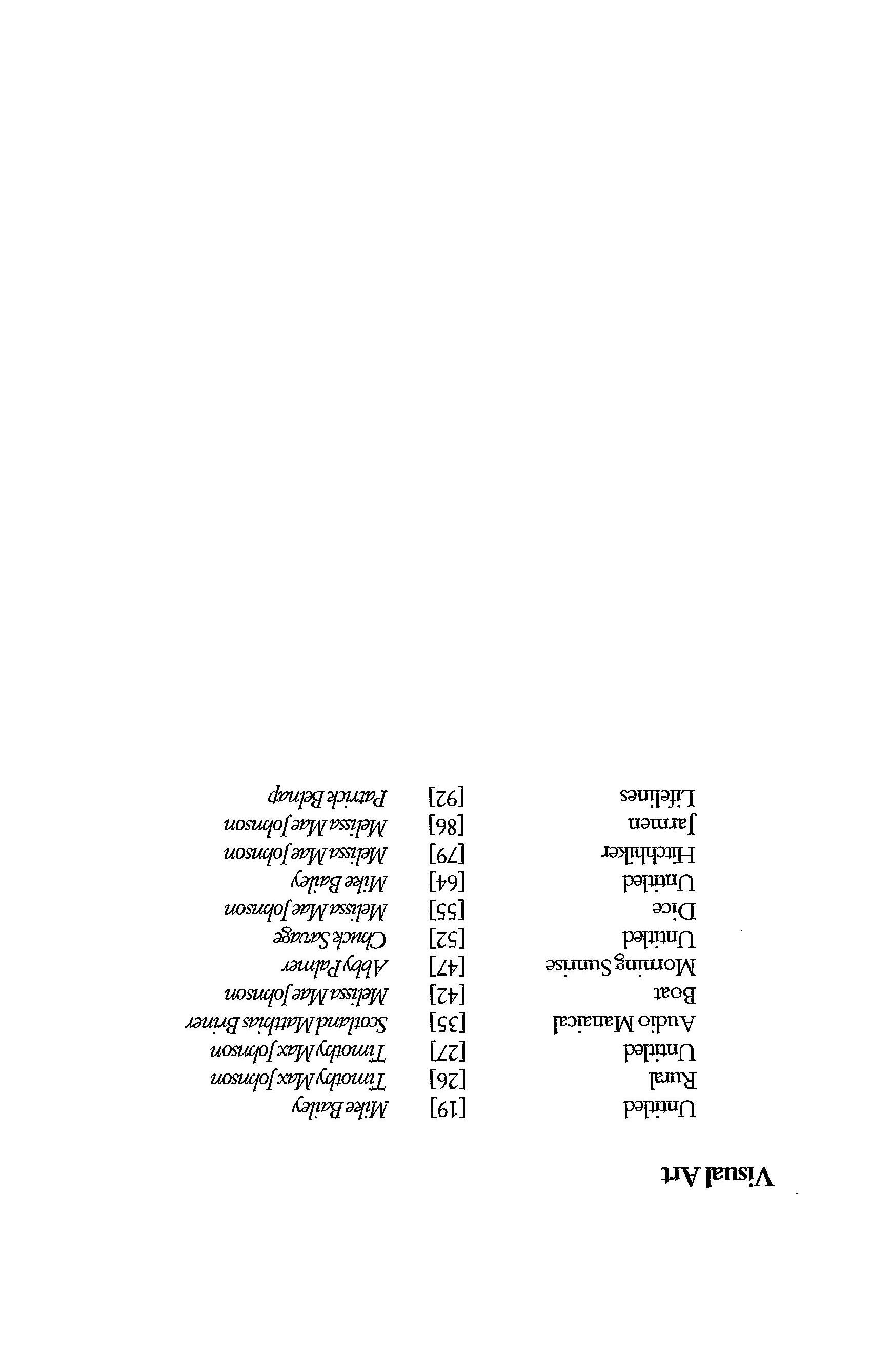
Untitled [19] MikeBailey
Rural [26] Timothy MaxJohnson
Untitled [27] Timothy MaxJohnson
Audio Manaical [35] ScotlandMatthi,as Briner
Boat [42] MelissaMaeJohnson
Morning Sunrise [47] AhbyPalmer
Untitled [52] Chuck Savage
Dice [55] MelissaMaeJohnson
Untitled [64] MikeBailey
Hitchhiker [79] MelissaMaeJohnson
Jarmen [86] Melissa MaeJohnson
Lifelines [92] PatrickBe/,nap
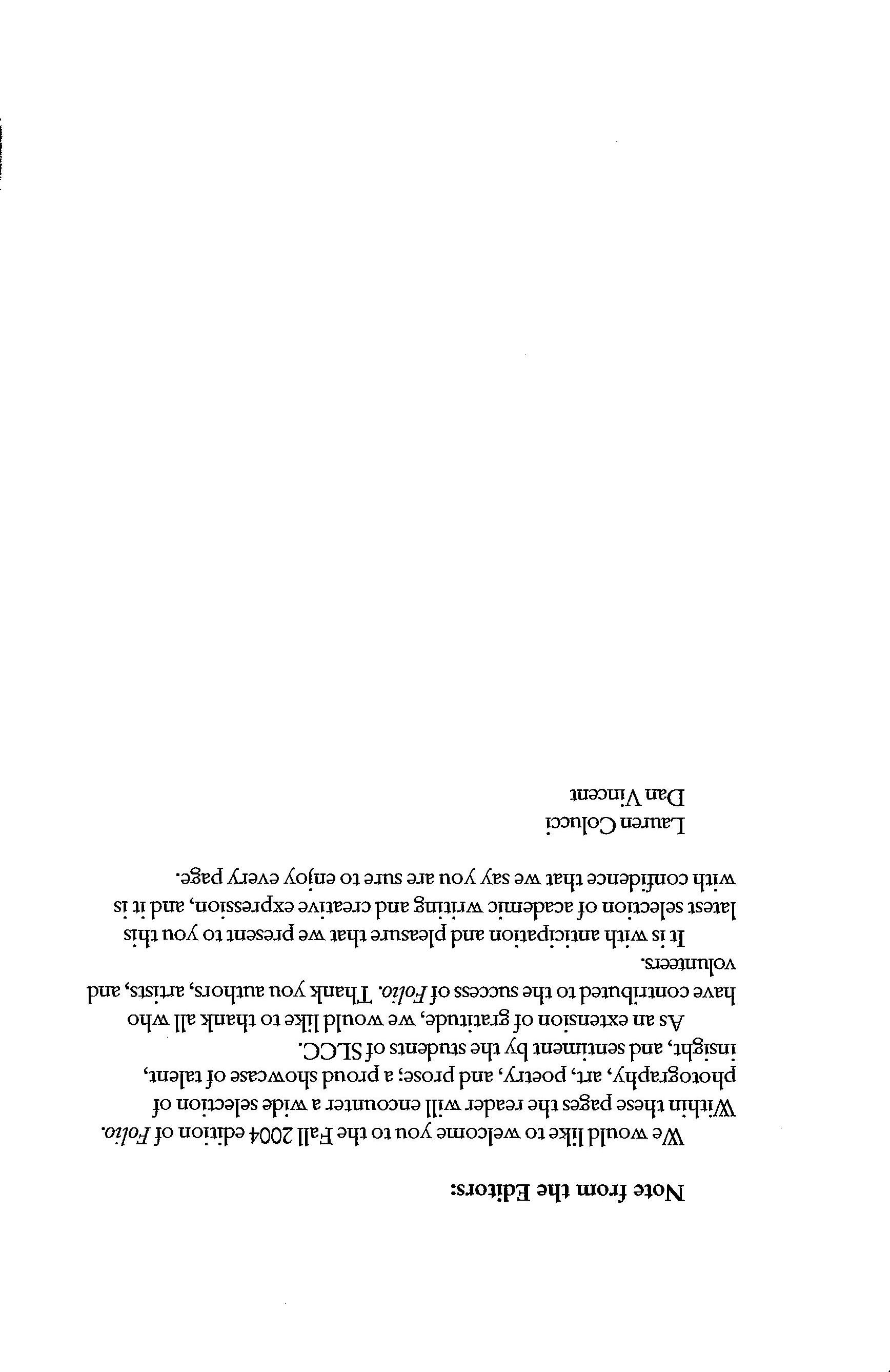
We would like to welcome you to the Fall 2004 edition of Folio. Within these pages the reader will encounter a wide selection of photography, art, poetry, and prose; a proud showcase of talent, insight, and sentiment by the students of SLCC.
As an extension of gratitude, we would like to thank all who have contributed to the success of Folio. Thank you authors, artists, and volunteers.
It is with anticipation and pleasure that we present to you this latest selection of academic writing and creative expression, and it is with confidence that we say you are sure to enjoy every page.
Lauren Colucci
Dan Vincent
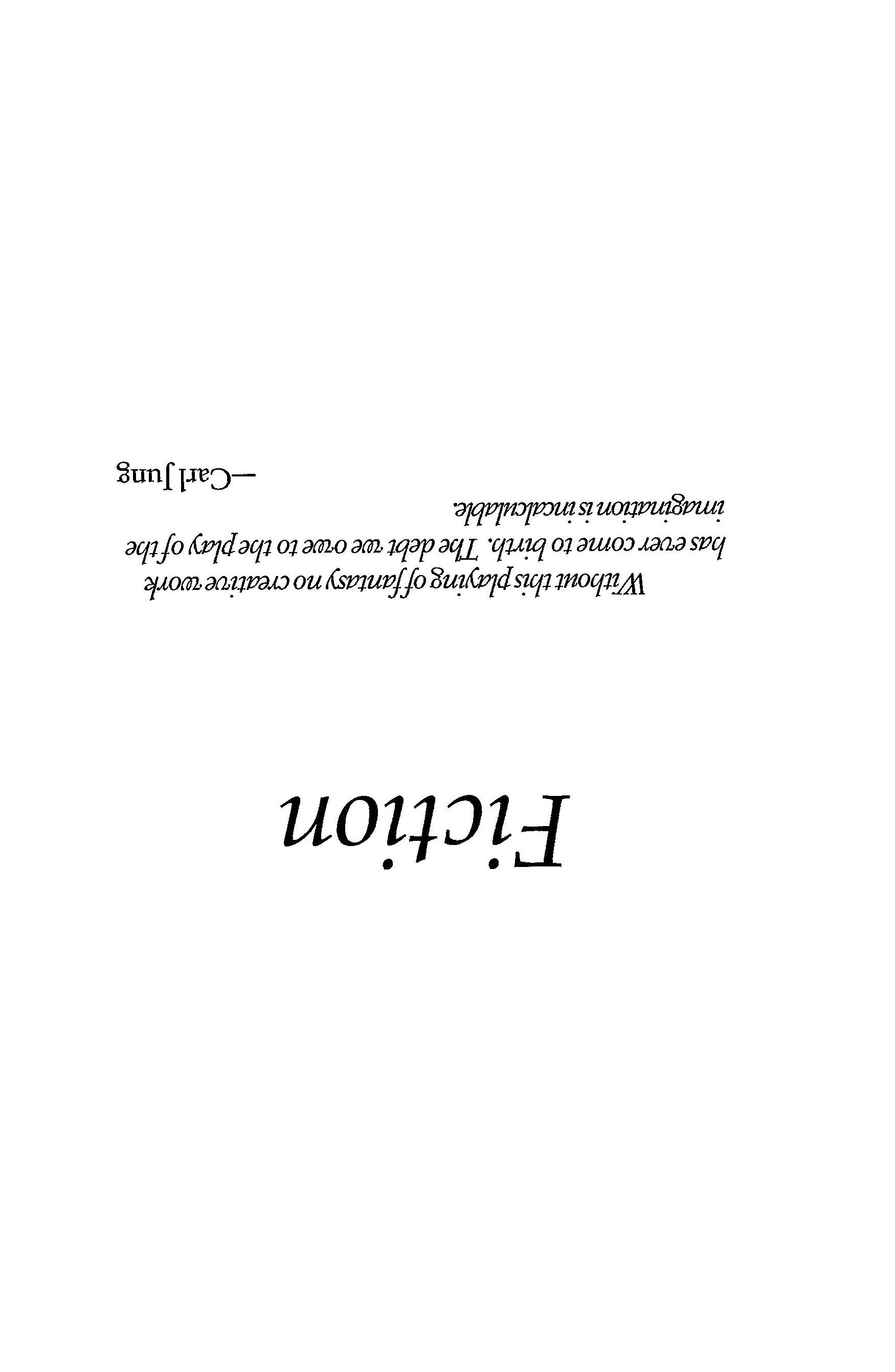
Without this playing offantasy no creative work has ever come to birth. 1be debt we owe to the play ofthe imaginatinn is incalculabk.
-CarlJung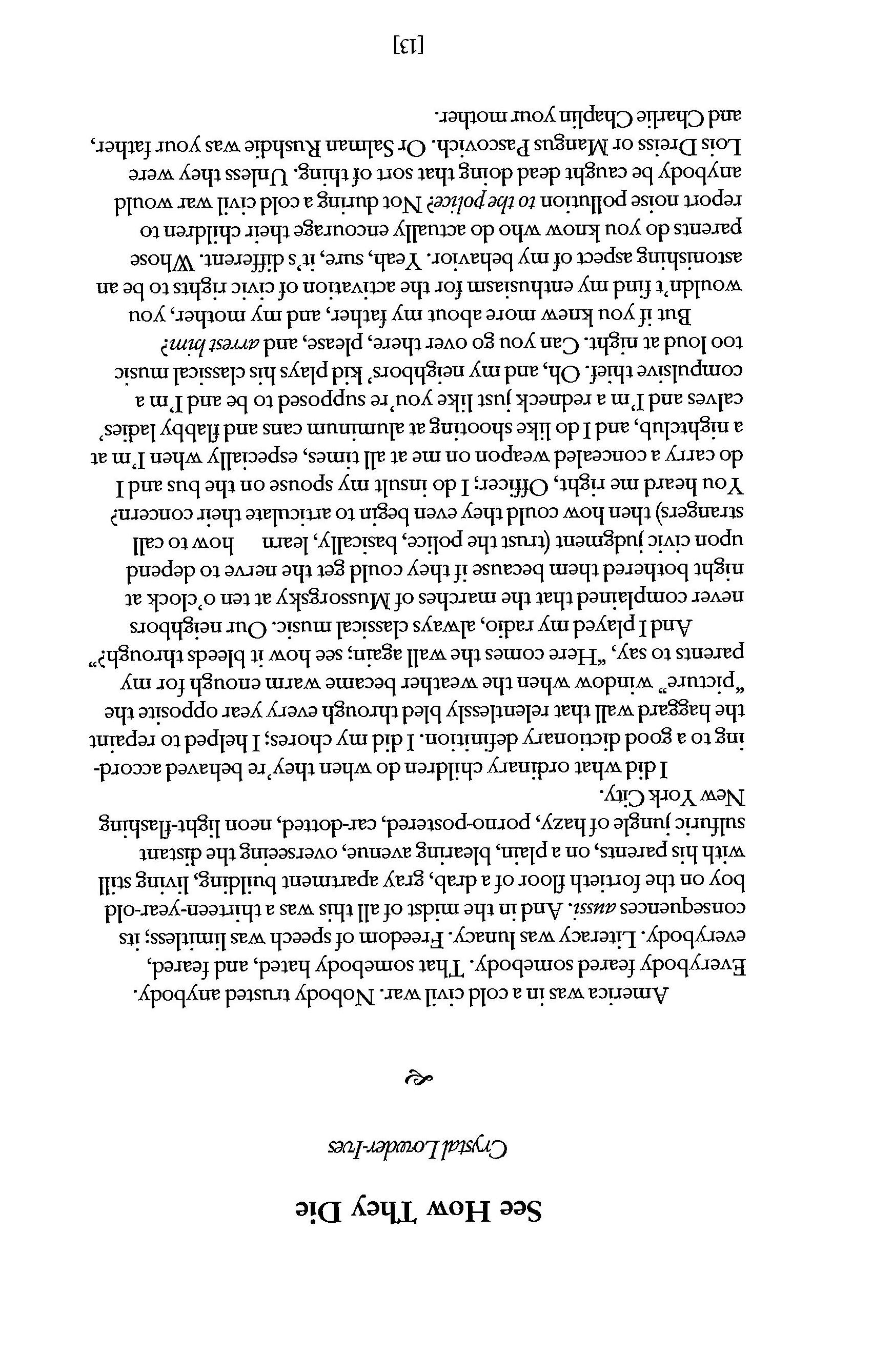
America was in a cold civil war. Nobody trusted anybody. Everybody feared somebody. That somebody hated, and feared, everybody. Literacy was lunacy. Freedom of speech was limitless; its consequences aussi. And in the midst of all this was a thirteen-year-old boy on the fortieth floor of a drab, gray apartment building, living still with his parents, on a plain, blearing avenue, overseeing the distant sulfuric jungle of hazy, porno-postered, car-dotted, neon light-flashing New York City.
I did what ordinary children do when they're behaved according to a good dictionary definition. I did my chores; I helped to repaint the haggard wall that relentlessly bled through every year opposite the "picture" window when the weather became warm enough for my parents to say, "Here comes the wall again; see how it bleeds through?"
And I played my radio, always classical music. Our neighbors never complained that the marches of Mussorgsky at ten o'clock at night bothered them because if they could get the nerve to depend upon civic judgment (trust the police, basically, learn how to call strangers) then how could they even begin to articulate their concern?
You heard me right, Officer; I do insult my spouse on the bus and I do carry a concealed weapon on me at all times, especially when I'm at a nightclub, and I do like shooting at aluminum cans and flabby ladies' calves and I'm a redneck just like you' re supposed to be and I'm a compulsive thief. Oh, and my neighbors' kid plays his classical music too loud at night. Can you go over there, please, and arrest him?
But if you knew more about my father, and my mother, you wouldn't find my enthusiasm for the activation of civic rights to be an astonishing aspect of my behavior. Yeah, sure, it's different. Whose parents do you know who do actually encourage their children to report noise pollution to the police? Not during a cold civil war would anybody be caught dead doing that sort of thing. Unless they were Lois Dreiss or Mangus Pascovich. Or Salman Rushdie was your father, and Charlie Chaplin your mother.
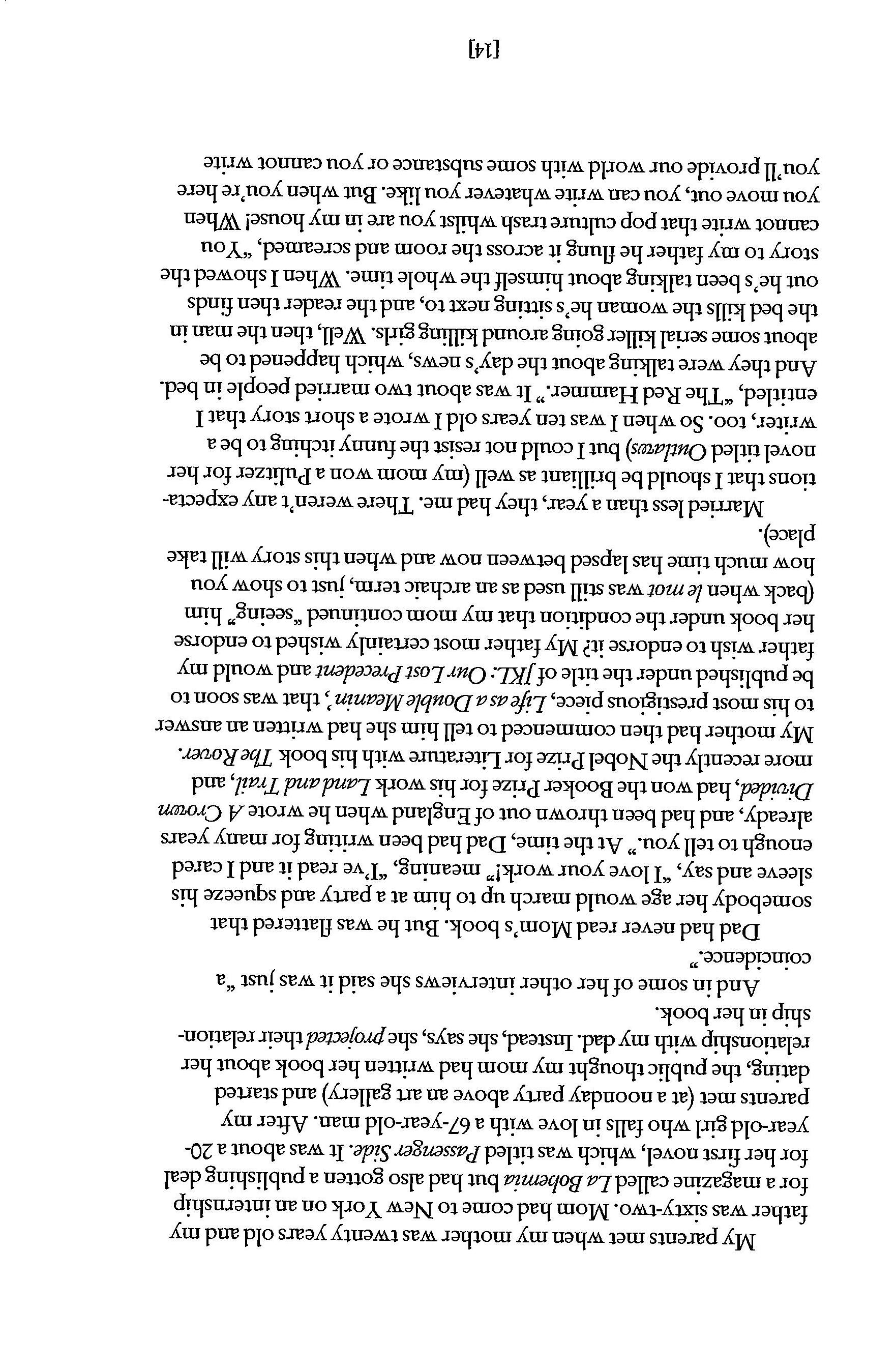
My parents met when my mother was twenty years old and my father was sixty-two. Mom had come to New York on an internship for a magazine called La Bohemia but had also gotten a publishing deal for her first novel, which was titled Passenger Side. It was about a 20year-old girl who falls in love with a 67-year-old man. After my parents met (at a noonday party above an art gallery) and started dating, the public thought my mom had written her book about her relationship with my dad. Instead, she says, she projected their relationship in her book.
And in some of her other interviews she said it was just "a coincidence."
Dad had never read Mom's book. But he was flattered that somebody her age would march up to him at a party and squeeze his sleeve and say, "I love your work!" meaning, "I've read it and I cared enough to tell you." At the time, Dad had been writing for many years already, and had been thrown out of England when he wrote A Crown Divided, had won the Booker Prize for his work Land and Trail, and more recently the Nobel Prize for Literature with his book The Rover. My mother had then commenced to tell him she had written an answer to his most prestigious piece, Life as a Double Meanin that was soon to be published under the title of ]KL: Our Lost Precedent and would my father wish to endorse it? My father most certainly wished to endorse her book under the condition that my mom continued "seeing" him (back when le mot was still used as an archaic term, just to show you how much time has lapsed between now and when this story will take place).
Married less than a year, they had me. There weren't any expectations that I should be brilliant as well (my mom won a Pulitzer for her novel titled Outlaws) but I could not resist the funny itching to be a writer, too. So when I was ten years old I wrote a short story that I entitled, "The Red Hammer." It was about two married people in bed. And they were talking about the day's news, which happened to be about some serial killer going around killing girls. Well, then the man in the bed kills the woman he's sitting next to, and the reader then finds out he's been talking about himself the whole time. When I showed the story to my father he flung it across the room and screamed, "You cannot write that pop culture trash whilst you are in my house! When you move out, you can write whatever you like. But when you' re here you'll provide our world with some substance or you cannot write
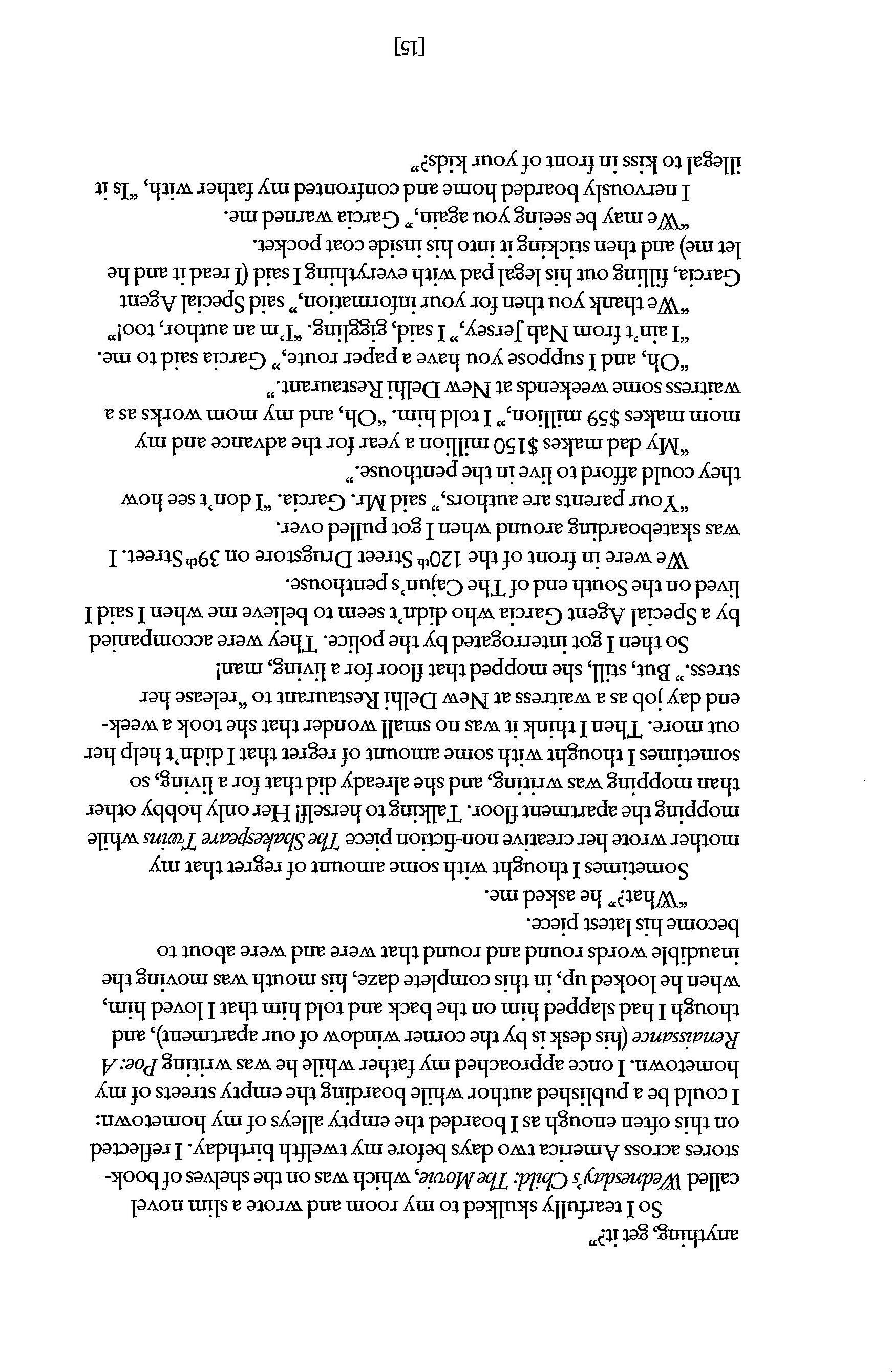
anything, get it?"
So I tearfully skulked to my room and wrote a slim novel called Wednesday's Child: The Movie, which was on the shelves of bookstores across America two days before my twelfth birthday. I reflected on this often enough as I boarded the empty alleys of my hometown: I could be a published author while boarding the empty streets of my hometown. I once approached my father while he was writing Poe: A Renaissance (his desk is by the corner window of our apartment), and though I had slapped him on the back and told him that I loved him, when he looked up, in this complete daze, his mouth was moving the inaudible words round and round that were and were about to become his latest piece.
"What?" he asked me.
Sometimes I thought with some amount of regret that my mother wrote her creative non-fiction piece 1be Shakespeare Twins while mopping the apartment floor. Talking to herself! Her only hobby other than mopping was writing, and she already did that for a living, so sometimes I thought with some amount of regret that I didn't help her out more. Then I think it was no small wonder that she took a weekend day job as a waitress at New Delhi Restaurant to "release her stress." But, still, she mopped that floor for a living, man!
So then I got interrogated by the police. They were accompanied by a Special Agent Garcia who didn't seem to believe me when I said I lived on the South end of The Cajun's penthouse.
We were in front of the 120th Street Drugstore on 39th Street. I was skateboarding around when I got pulled over.
"Your parents are authors," said Mr. Garcia. "I don't see how they could afford to live in the penthouse."
"My dad makes $150 million a year for the advance and my mom makes $59 million," I told him. "Oh, and my mom works as a waitress some weekends at New Delhi Restaurant."
"Oh, and I suppose you have a paper route," Garcia said to me.
"I ain't from NahJersey," I said, giggling. "I'm an author, too!"
"We thank you then for your information," said Special Agent Garcia, filling out his legal pad with everything I said (I read it and he let me) and then sticking it into his inside coat pocket.
"We may be seeing you again," Garcia warned me.
I nervously boarded home and confronted my father with, "Is it illegal to kiss in front of your kids?"
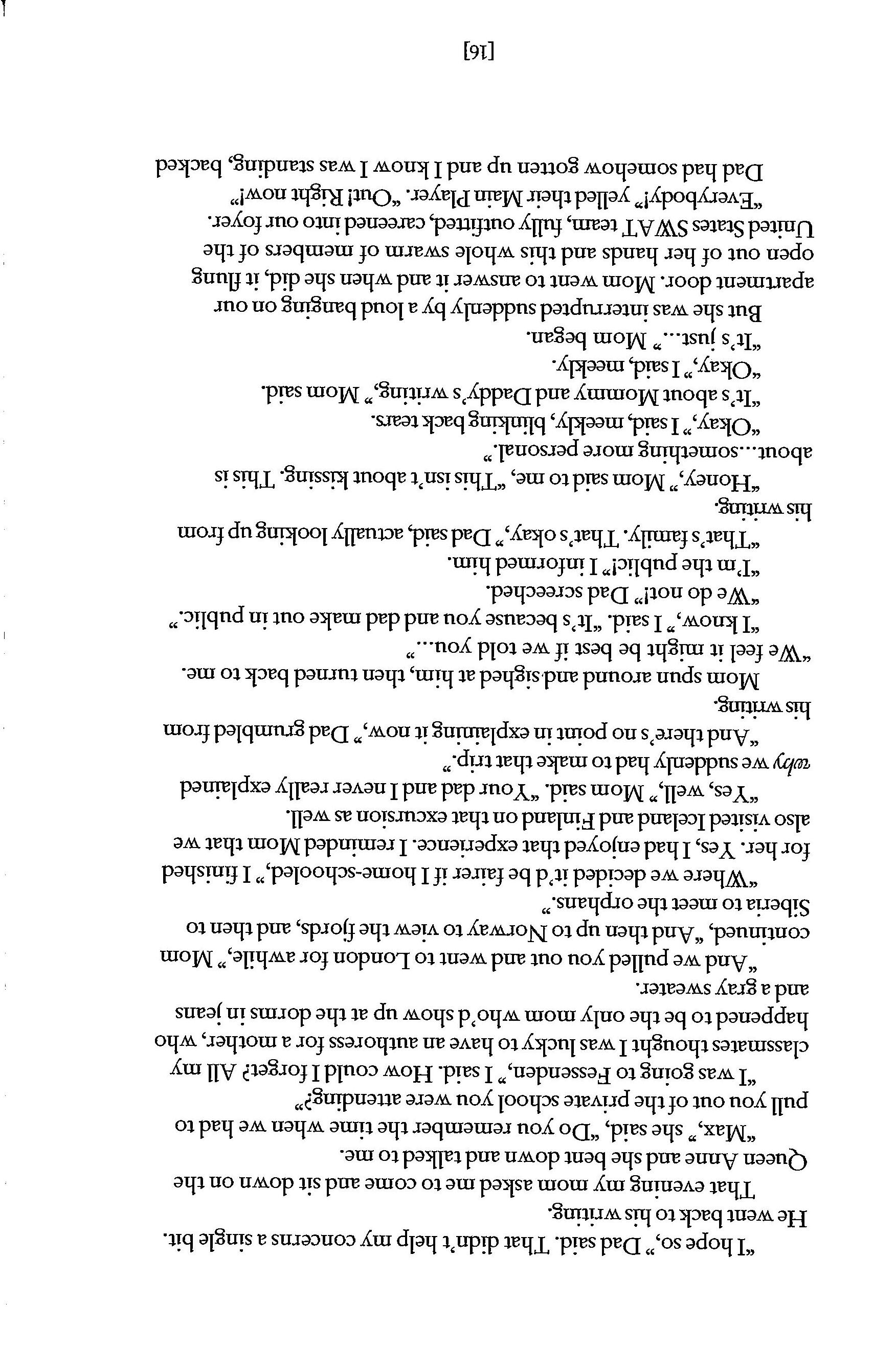
"I hope so," Dad said. That didn't help my concerns a single bit. He went back to his writing.
That evening my mom asked me to come and sit down on the Queen Anne and she bent down and talked to me.
"Max," she said, "Do you remember the time when we had to pull you out of the private school you were attending?"
"I was going to Fessenden," I said. How could I forget? All my classmates thought I was lucky to have an authoress for a mother, who happened to be the only mom who'd show up at the dorms in jeans and a gray sweater.
"And we pulled you out and went to London for awhile," Mom continued, "And then up to Norway to view the fjords, and then to Siberia to meet the orphans."
"Where we decided it'd be fairer if I home-schooled," I finished for her. Yes, I had enjoyed that experience. I reminded Mom that we also visited Iceland and Finland on that excursion as well.
"Yes, well," Mom said. "Your dad and I never really explained why we suddenly had to make that trip."
"And there's no point in explaining it now," Dad grumbled from his writing.
Mom spun around and.sighed at him, then turned back to me. "We feel it might be best if we told you "
"I know," I said. "It's because you and dad make out in public."
"We do not!" Dad screeched.
"I'm the public!" I informed him.
"That's family. That's okay," Dad said, actually looking up from his writing.
"Honey," Mom said to me, "This isn't about kissing. This is about ... something more personal."
"Okay," I said, meekly, blinking back tears.
"It's about Mommy and Daddy's writing," Mom said.
"Okay," I said, meekly.
"It's just ... " Mom began.
But she was interrupted suddenly by a loud banging on our apartment door. Mom went to answer it and when she did, it flung open out of her hands and this whole swarm of members of the United States SWAT team, fully outfitted, careened into our foyer.
"Everybody!" yelled their Main Player. "Out! Right now!"
Dad had somehow gotten up and I know I was standing, backed
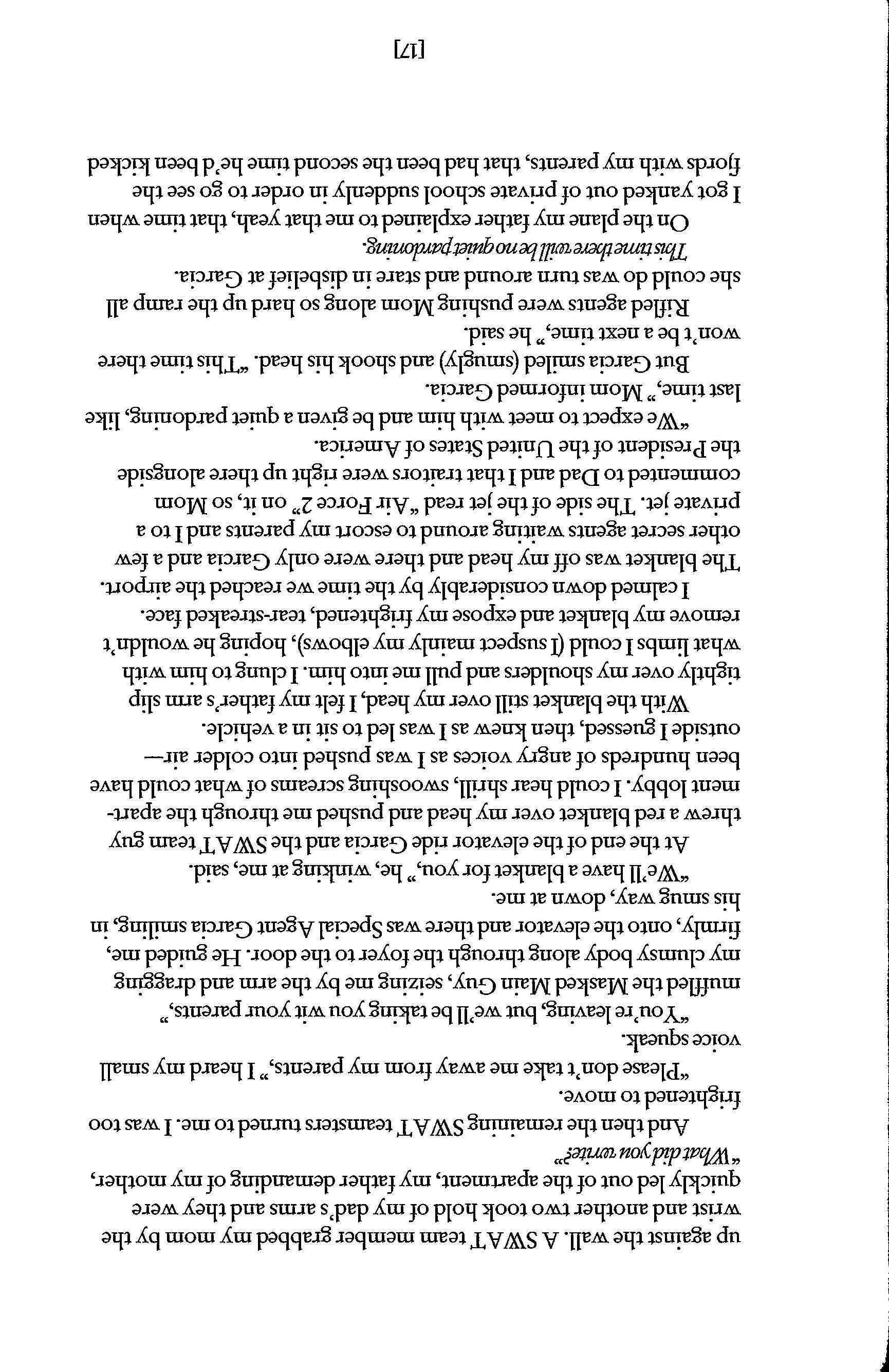
up against the wall. A SWAT team member grabbed my mom by the wrist and another two took hold of my dad's arms and they were quickly led out of the apartment, my father demanding of my mother, "What did you write?"
And then the remaining SWAT teamsters turned to me. I was too frightened to move.
"Please don't take me away from my parents," I heard my small voice squeak.
"You're leaving, but we'll be taking you wit your parents," muffled the Masked Main Guy, seizing me by the arm and dragging my clumsy body along through the foyer to the door. He guided me, firmly, onto the elevator and there was Special Agent Garcia smiling, in his smug way, down at me.
"We'll have a blanket for you," he, winking at me, said.
At the end of the elevator ride Garcia and the SWAT team guy threw a red blanket over my head and pushed me through the apartment lobby. I could hear shrill, swooshing screams of what could have been hundreds of angry voices as I was pushed into colder airoutside I guessed, then knew as I was led to sit in a vehicle.
With the blanket still over my head, I felt my father's arm slip tightly over my shoulders and pull me into him. I clung to him with what limbs I could (I suspect mainly my elbows), hoping he wouldn't remove my blanket and expose my frightened, tear-streaked face.
I calmed down considerably by the time we reached the airport. The blanket was off my head and there were only Garcia and a few other secret agents waiting around to escort my parents and I to a private jet. The side of the jet read "Air Force 2" on it, so Mom commented to Dad and I that traitors were right up there alongside the President of the United States of America.
"We expect to meet with him and be given a quiet pardoning, like last time," Mom informed Garcia.
But Garcia smiled (smugly) and shook his head. "This time there won't be a next time," he said.
Rifled agents were pushing Mom along so hard up the ramp all she could do was turn around and stare in disbelief at Garcia. 7histimetherewillbertoquietpardoning.
On the plane my father explained to me that yeah, that time when I got yanked out of private school suddenly in order to go see the fjords with my parents, that had been the second time he'd been kicked
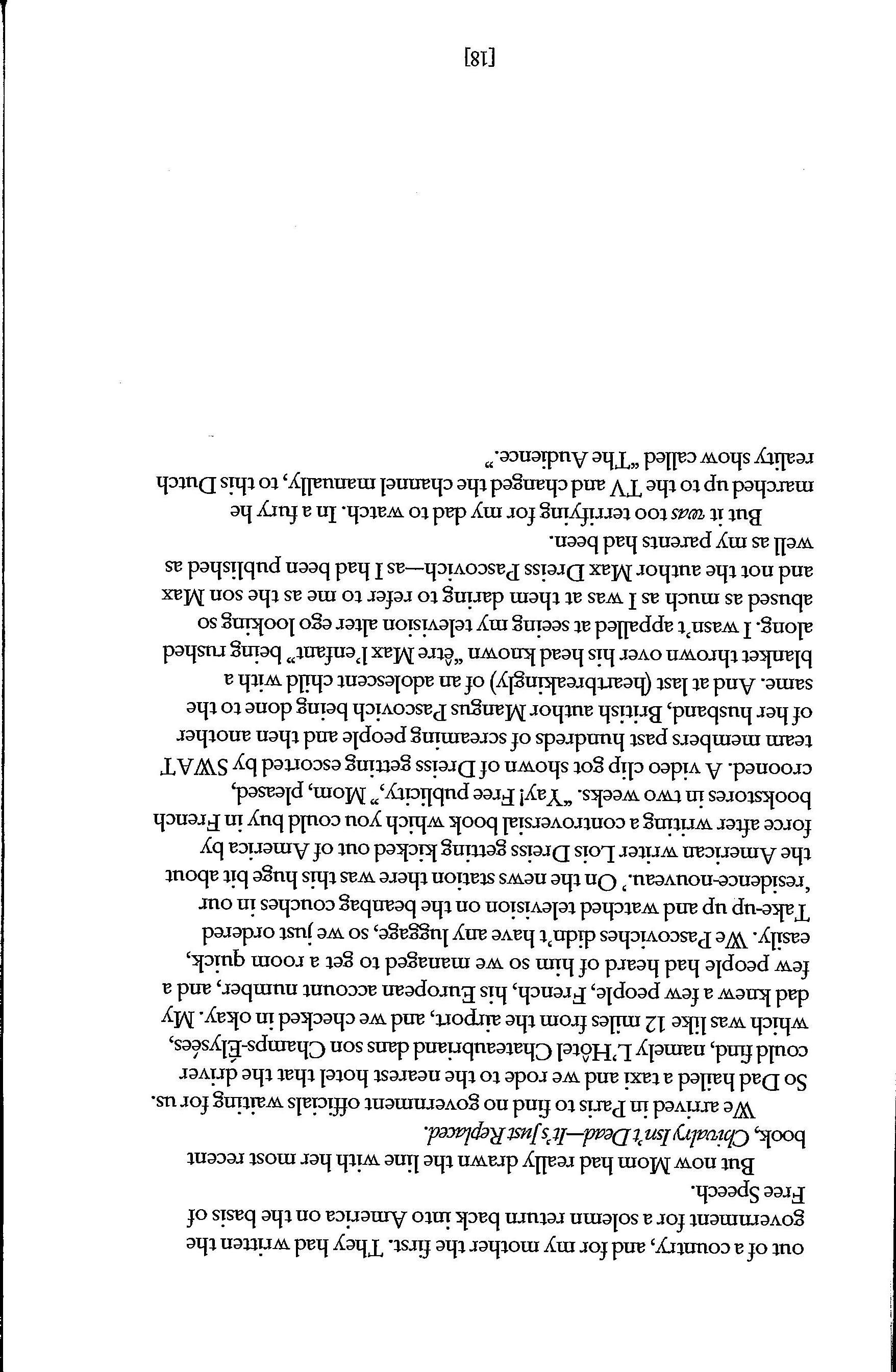
out of a country, and for my mother the first. They had written the government for a solemn return back into America on the basis of Free Speech.
But now Mom had really drawn the line with her most recent book, Chivalry Isn't Dead-ItsJust Replaced.
We arrived in Paris to find no government officials waiting for us. So Dad hailed a taxi and we rode to the nearest hotel that the driver could find, namely L'H6tel Chateaubriand dans son Champs-Elysees, which was like 12 miles from the airport, and we checked in okay. My dad knew a few people, French, his European account number, and a few people had heard of him so we managed to get a room quick, easily. We Pascoviches didn't have any luggage, so we just ordered Take-up up and watched television on the beanbag couches in our 'residence-nouveau.' On the news station there was this huge bit about the American writer Lois Dreiss getting kicked out of America by force after writing a controversial book which you could buy in French bookstores in two weeks. "Yay! Free publicity," Mom, pleased, crooned. A video clip got shown of Dreiss getting escorted by SWAT team members past hundreds of screaming people and then another of her husband, British author Mangus Pascovich being done to the same. And at last (heartbreakingly) of an adolescent child with a blanket thrown over his head known "&tre Max I' enfant" being rushed along. I wasn't appalled at seeing my television alter ego looking so abused as much as I was at them daring to refer to me as the son Max and not the author Max Dreiss Pascovich-as I had been published as well as my parents had been.
But it was too terrifying for my dad to watch. In a fury he marched up to the TV and changed the channel manually, to this Dutch reality show called "The Audience."
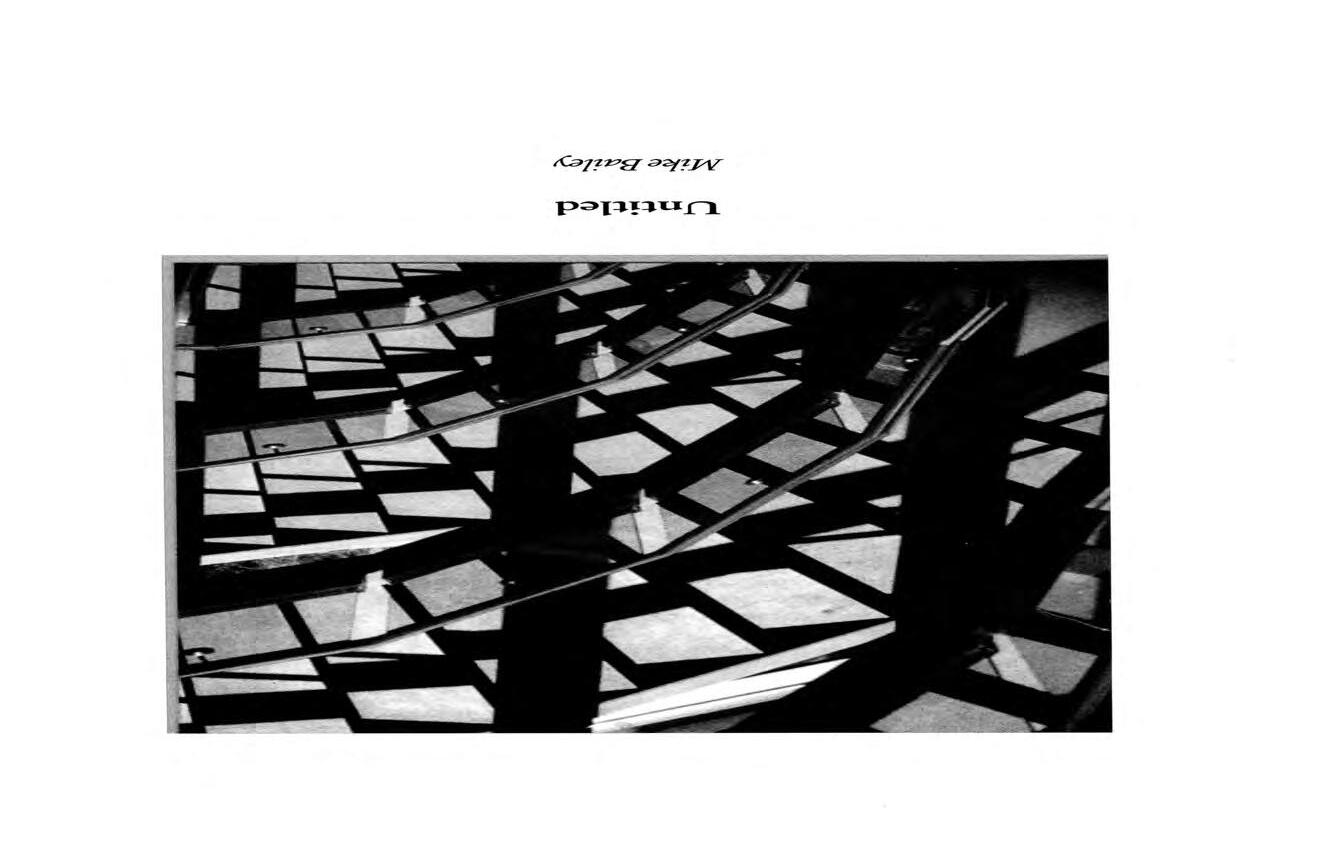
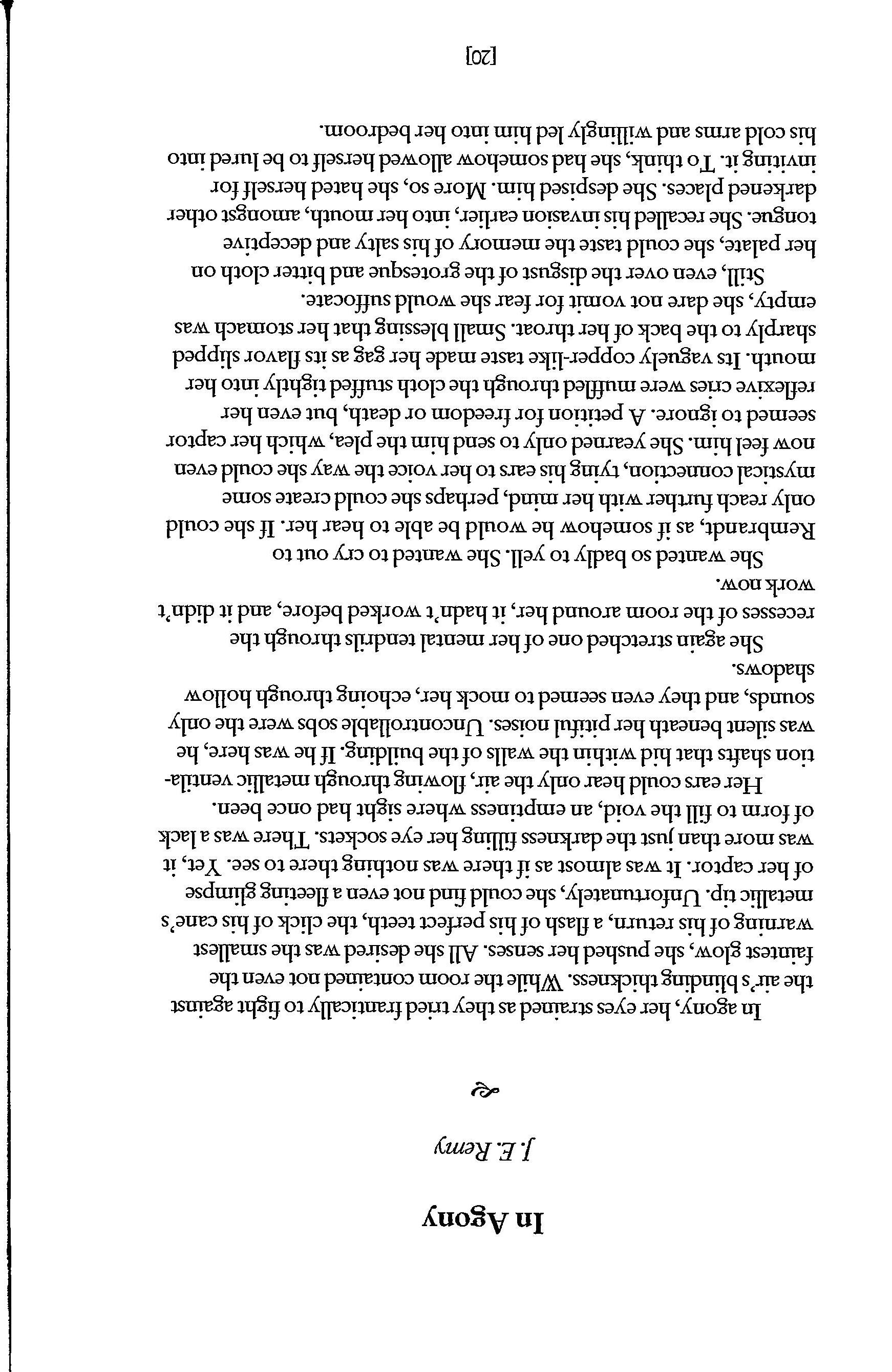
In agony, her eyes strained as they tried frantically to fight against the air's blinding thickness. While the room contained not even the faintest glow, she pushed her senses. All she desired was the smallest warning of his return, a flash of his perfect teeth, the click of his cane's metallic tip. Unfortunately, she could find not even a fleeting glimpse of her captor. It was almost as if there was nothing there to see.Yet, it was more than just the darkness filling her eye sockets. There was a lack of form to fill the void, an emptiness where sight had once been.
Her ears could hear only the air, flowing through metallic ventilation shafts that hid within the walls of the building. If he was here, he was silent beneath her pitiful noises. Uncontrollable sobs were the only sounds, and they even seemed to mock her, echoing through hollow shadows.
She again stretched one of her mental tendrils through the recesses of the room around her, it hadn't worked before, and it didn't worknow.
She wanted so badly to yell. She wanted to cry out to Rembrandt, as if somehow he would be able to hear her. If she could only reach further with her mind, perhaps she could create some mystical connection, tying his ears to her voice the way she could even now feel him. She yearned only to send him the plea, which her captor seemed to ignore. A petition for freedom or death, but even her reflexive cries were muffled through the doth stuffed tightly into her mouth. Its vaguely copper-like taste made her gag as its flavor slipped sharply to the back of her throat. Small blessing that her stomach was empty, she dare not vomit for fear she would suffocate. Still, even over the disgust of the grotesque and bitter doth on her palate, she could taste the memory of his salty and deceptive tongue. She recalled his invasion earlier, into her mouth, amongst other darkened places. She despised him. More so, she hated herself for inviting it. To think, she had somehow allowed herself to be lured into his cold arms and willingly led him into her bedroom.
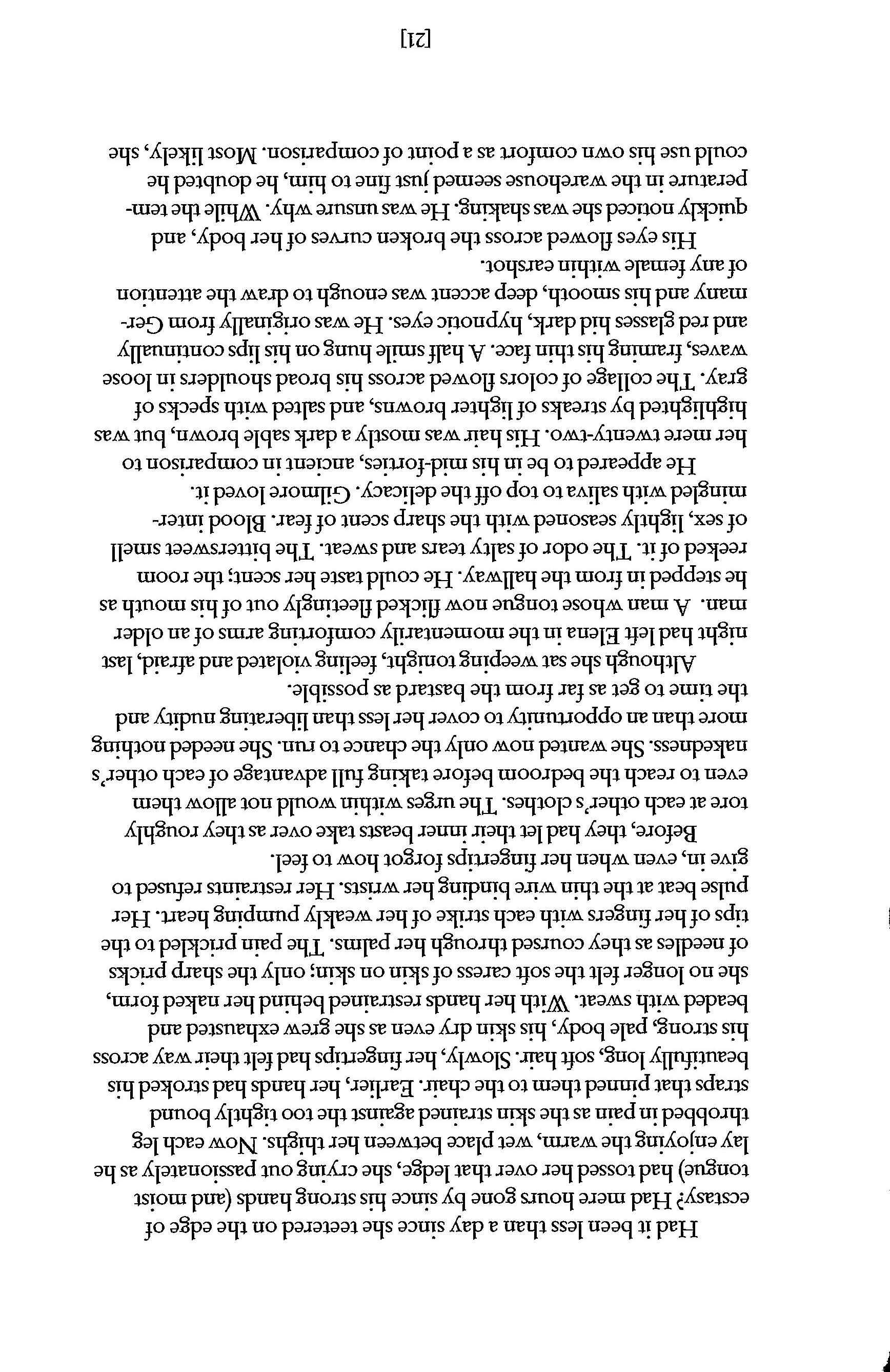
Had it been less than a day since she teetered on the edge of ecstasy? Had mere hours gone by since his strong hands (and moist tongue) had tossed her over that ledge, she crying out passionately as he lay enjoying the warm, wet place between her thighs. Now each leg throbbed in pain as the skin strained against the too tightly bound straps that pinned them to the chair. Earlier, her hands had stroked his beautifully long, soft hair. Slowly, her fingertips had felt their way across his strong, pale body, his skin dry even as she grew exhausted and beaded with sweat. With her hands restrained behind her naked form, she no longer felt the soft caress of skin on skin; only the sharp pricks of needles as they coursed through her palms. The pain prickled to the tips of her fingers with each strike of her weakly pumping heart. Her pulse beat at the thin wire binding her wrists. Her restraints refused to give in, even when her fingertips forgot how to feel. Before, they had let their inner beasts take over as they roughly tore at each other's clothes. The urges within would not allow them even to reach the bedroom before taking full advantage of each other's nakedness. She wanted now only the chance to run. She needed nothing more than an opportunity to cover her less than liberating nudity and the time to get as far from the bastard as possible.
Although she sat weeping tonight, feeling violated and afraid, last night had left Elena in the momentarily comforting arms of an older man. A man whose tongue now flicked fleetingly out of his mouth as he stepped in from the hallway. He could taste her scent; the room reeked of it. The odor of salty tears and sweat. The bittersweet smell of sex, lightly seasoned with the sharp scent of fear. Blood intermingled with saliva to top off the delicacy. Gilmore loved it.
He appeared to be in his mid-forties, ancient in comparison to her mere twenty-two. His hair was mostly a dark sable brown, but was highlighted by streaks of lighter browns, and salted with specks of gray. The collage of colors flowed across his broad shoulders in loose waves, framing his thin face. A half smile hung on his lips continually and red glasses hid dark, hypnotic eyes. He was originally from Germany and his smooth, deep accent was enough to draw the attention of any female within earshot.
His eyes flowed across the broken curves of her body, and quickly noticed she was shaking. He was unsure why. While the temperature in the warehouse seemed just fine to him, he doubted he could use his own comfort as a point of comparison. Most likely, she
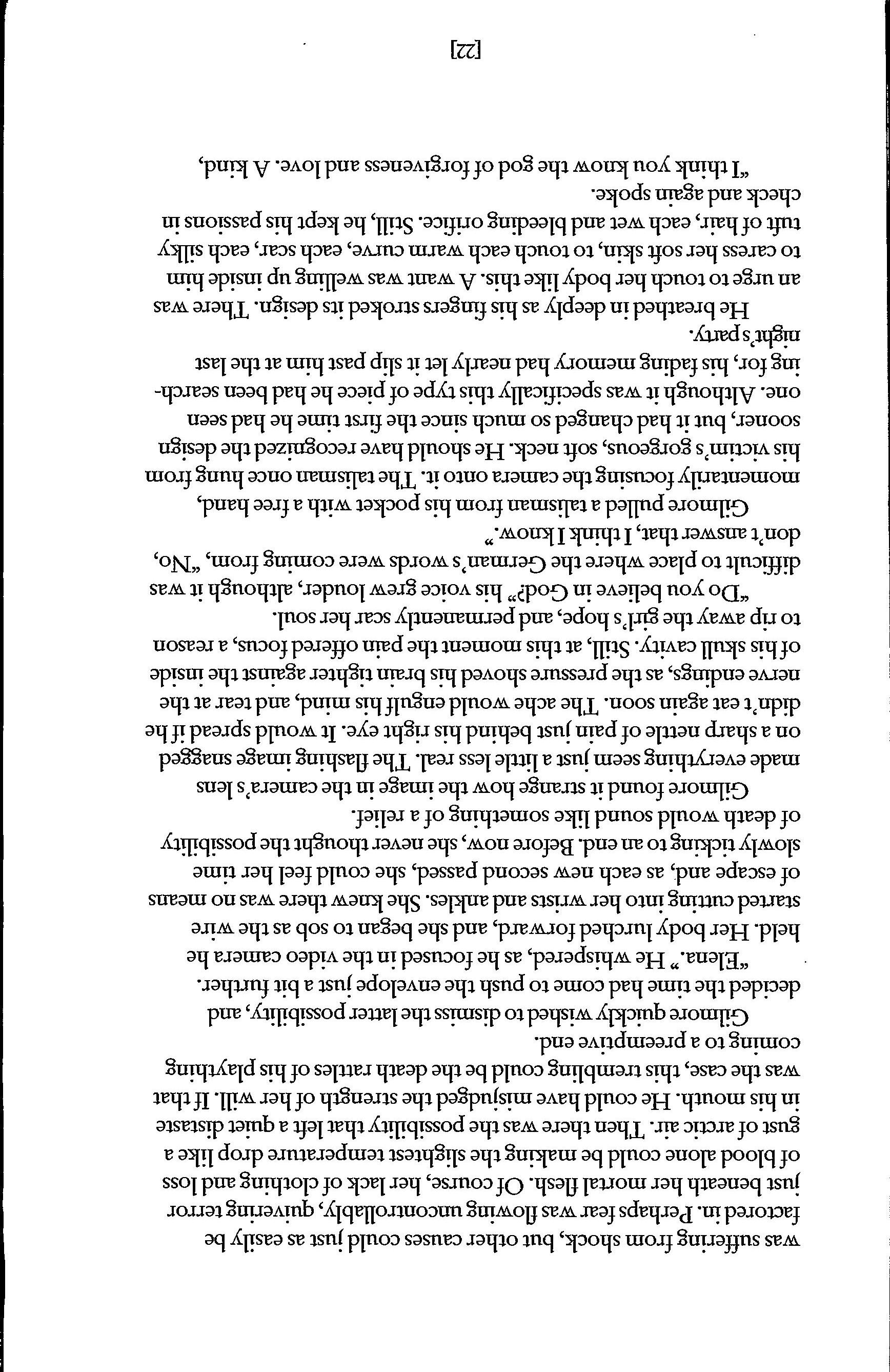
was suffering from shock, but other causes could just as easily be factored in. Perhaps fear was fl.owing uncontrollably, quivering terror just beneath her mortal flesh. Of course, her lack of clothing and loss of blood alone could be making the slightest temperature drop like a gust of arctic air. Then there was the possibility that left a quiet distaste in his mouth. He could have misjudged the strength of her will. If that was the case, this trembling could be the death rattles of his plaything coming to a preemptive end.
Gilmore quickly wished to dismiss the latter possibility, and decided the time had come to push the envelope just a bit further.
"Elena." He whispered, as he focused in the video camera he held. Her body lurched forward, and she began to sob as the wire started cutting into her wrists and ankles. She knew there was no means of escape and, as each new second passed, she could feel her time slowly ticking to an end. Before now, she never thought the possibility of death would sound like something of a relief.
Gilmore found it strange how the image in the camera's lens made everything seem just a little less real. The flashing image snagged on a sharp nettle of pain just behind his right eye. It would spread if he didn't eat again soon. The ache would engulf his mind, and tear at the nerve endings, as the pressure shoved his brain tighter against the inside of his skull cavity. Still, at this moment the pain offered focus, a reason to rip away the girl's hope, and permanently scar her soul.
"Do you believe in God?" his voice grew louder, although it was difficult to place where the German's words were coming from, "No, don't answer that, I think I know."
Gilmore pulled a talisman from his pocket with a free hand, momentarily focusing the camera onto it. The talisman once hung from his victim's gorgeous, soft neck. He should have recognized the design sooner, but it had changed so much since the first time he had seen one. Although it was specifically this type of piece he had been searching for, his fading memory had nearly let it slip past him at the last night's party.
He breathed in deeply as his fingers stroked its design. There was an urge to touch her body like this. A want was welling up inside him to caress her soft skin, to touch each warm curve, each scar, each silky tuft of hair, each wet and bleeding orifice. Still, he kept his passions in check and again spoke.
"I think you know the god of forgiveness and love. A kind,
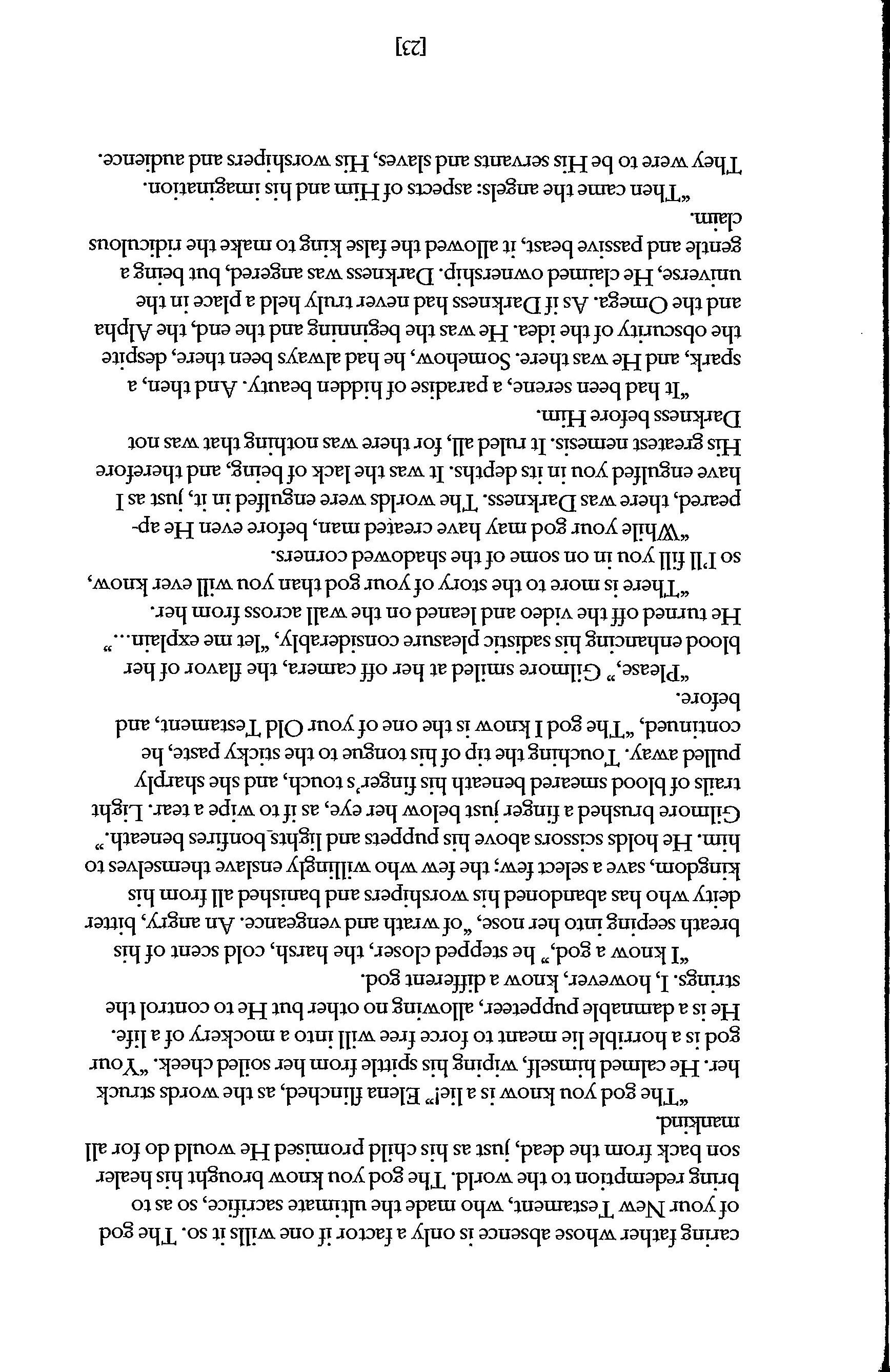
caring father whose absence is only a factor if one wills it so. The god of your New Testament, who made the ultimate sacrifice, so as to bring redemption to the world. The god you know brought his healer son back from the dead, just as his child promised He would do for all mankind.
"The god you know is a lie!" Elena flinched, as the words struck her. He calmed himself, wiping his spittle from her soiled cheek. "Your god is a horrible lie meant to force free will into a mockery of a life. He is a damnable puppeteer, allowing no other but He to control the strings. I, however, know a different god.
"I know a god," he stepped closer, the harsh, cold scent of his breath seeping into her nose, "of wrath and vengeance. An angry, bitter deity who has abandoned his worshipers and banished all from his kingdom, save a select few; the few who willingly enslave themselves to him. He holds scissors above his puppets and lights_bonfires beneath." Gilmore brushed a finger just below her eye, as if to wipe a tear. Light trails of blood smeared beneath his finger's touch, and she sharply pulled away. Touching the tip of his tongue to the sticky paste, he continued, "The god I know is the one of your Old Testament, and before.
"Please," Gilmore smiled at her off camera, the flavor of her blood enhancing his sadistic pleasure considerably, "let me explain ... " He turned off the video and leaned on the wall across from her.
"There is more to the story of your god than you will ever know, so I'll fill you in on some of the shadowed corners.
"While your god may have created man, before even He appeared, there was Darkness. The worlds were engulfed in it, just as I have engulfed you in its depths. It was the lack of being, and therefore His greatest nemesis. It ruled all, for there was nothing that was not Darkness before Him.
"It had been serene, a paradise of hidden beauty. And then, a spark, and He was there. Somehow, he had always been there, despite the obscurity of the idea. He was the beginning and the end, the Alpha and the Omega. As if Darkness had never truly held a place in the universe, He claimed ownership. Darkness was angered, but being a gentle and passive beast, it allowed the false king to make the ridiculous claim.
"Then came the angels: aspects of Him and his imagination. They were to be His servants and slaves, His worshipers and audience.
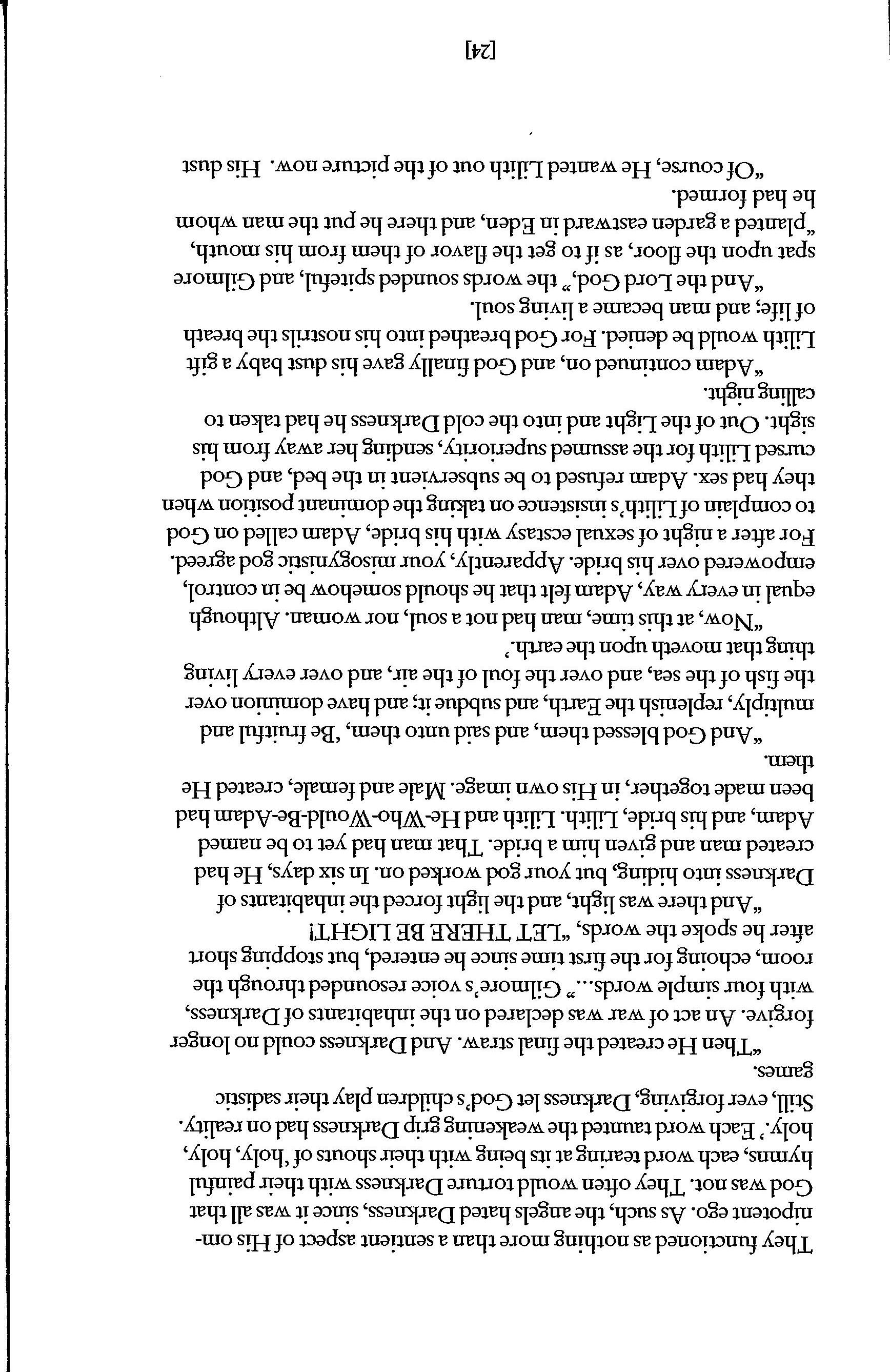
They functioned as nothing more than a sentient aspect of His omnipotent ego. As such, the angels hated Darkness, since it was all that God was not. They often would torture Darkness with their painful hymns, each word tearing at its being with their shouts of 'holy, holy, holy.' Each word taunted the weakening grip Darkness had on reality. Still, ever forgiving, Darkness let God's children play their sadistic games.
"Then He created the final straw. And Darkness could no longer forgive. An act of war was declared on the inhabitants of Darkness, with four simple words ... " Gilmore's voice resounded through the room, echoing for the first time since he entered, but stopping short after he spoke the words, "LET THERE BE LIGHT!
"And there was light, and the light forced the inhabitants of Darkness into hiding, but your god worked on. In six days, He had created man and given him a bride. That man had yet to be named Adam, and his bride, Lilith. Lilith and He-Who-Would-Be-Adam had been made together, in His own image. Male and female, created He them.
"And God blessed them, and said unto them, 'Be fruitful and multiply, replenish the Earth, and subdue it; and have dominion over the fish of the sea, and over the foul of the air, and over every living thing that moveth upon the earth.'
"Now, at this time, man had not a soul, nor woman. Although equal in every way, Adam felt that he should somehow be in control, empowered over his bride. Apparently, your misogynistic god agreed. For after a night of sexual ecstasy with his bride, Adam called on God to complain of Lilith's insistence on taking the dominant position when they had sex. Adam refused to be subservient in the bed, and God cursed Lilith for the assumed superiority, sending her away from his sight. Out of the Light and into the cold Darkness he had taken to calling night.
"Adam continued on, and God finally gave his dust baby a gift Lilith would be denied. For God breathed into his nostrils the breath of life; and man became a living soul.
"And the Lord God," the words sounded spiteful, and Gilmore spat upon the floor, as if to get the flavor of them from his mouth, "planted a garden eastward in Eden, and there he put the man whom he had formed.
"Of course, He wanted Lilith out of the picture now. His dust
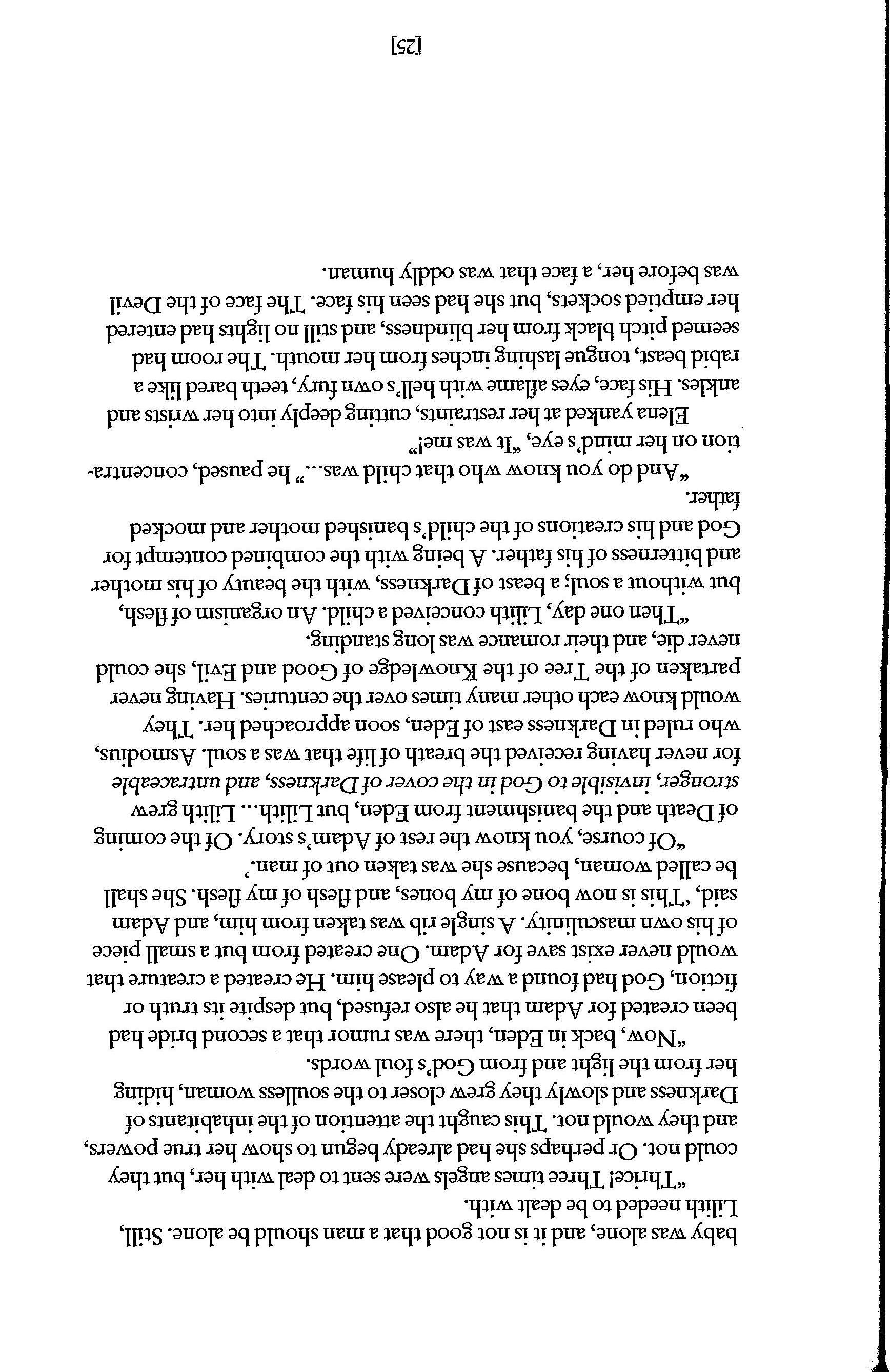
baby was alone, and it is not good that a man should be alone. Still, Lilith needed to be dealt with.
"Thrice! Three times angels were sent to deal with her, but they could not. Or perhaps she had already begun to show her true powers, and they would not. This caught the attention of the inhabitants of Darkness and slowly they grew closer to the soulless woman, hiding her from the light and from God's foul words.
"Now, back in Eden, there was rumor that a second bride had been created for Adam that he also refused, but despite its truth or fiction, God had found a way to please him. He created a creature that would never exist save for Adam. One created from but a small piece of his own masculinity. A single rib was taken from him, and Adam said, 'This is now bone of my bones, and flesh of my flesh. She shall be called woman, because she was taken out of man.'
"Of course, you know the rest of Adam's story. Of the coming of Death and the banishment from Eden, but Lilith ... Lilith grew stronger, invisible to God in the cover of Darkness, and untraceable for never having received the breath of life that was a soul. Asmodius, who ruled in Darkness east of Eden, soon approached her. They would know each other many times over the centuries. Having never partaken of the Tree of the Knowledge of Good and Evil, she could never die, and their romance was long standing.
"Then one day, Lilith conceived a child. An organism of flesh, but without a soul; a beast of Darkness, with the beauty of his mother and bitterness of his father. A being with the combined contempt for God and his creations of the child's banished mother and mocked father.
"And do you know who that child was ... " he paused, concentration on her mind's eye, "It was me!"
· Elena yanked at her restraints, cutting deeply into her wrists and ankles. His face, eyes aflame with hell's own fury, teeth bared like a rabid beast, tongue lashing inches from her mouth. The room had seemed pitch black from her blindness, and still no lights had entered her emptied sockets, but she had seen his face. The face of the Devil was before her, a face that was oddly human.
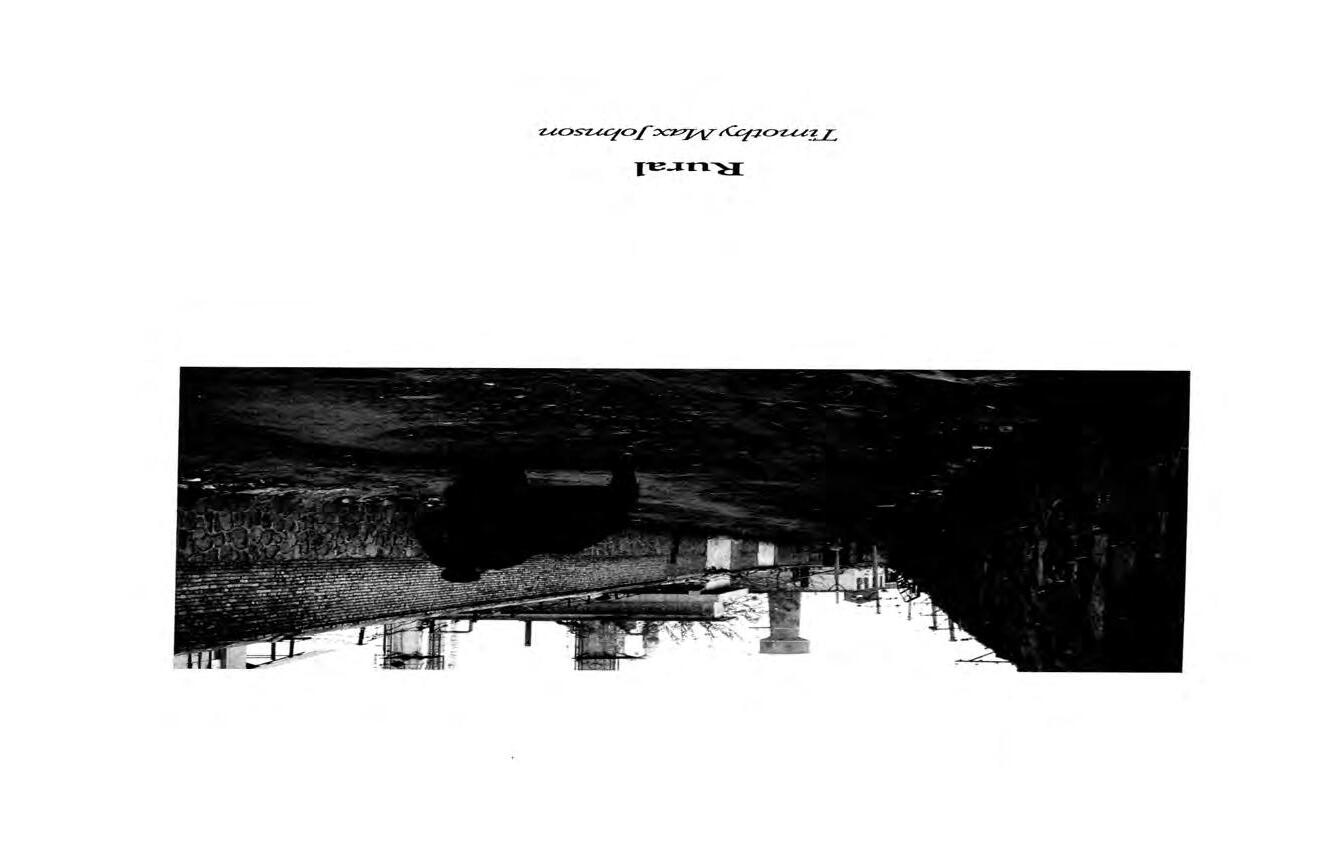
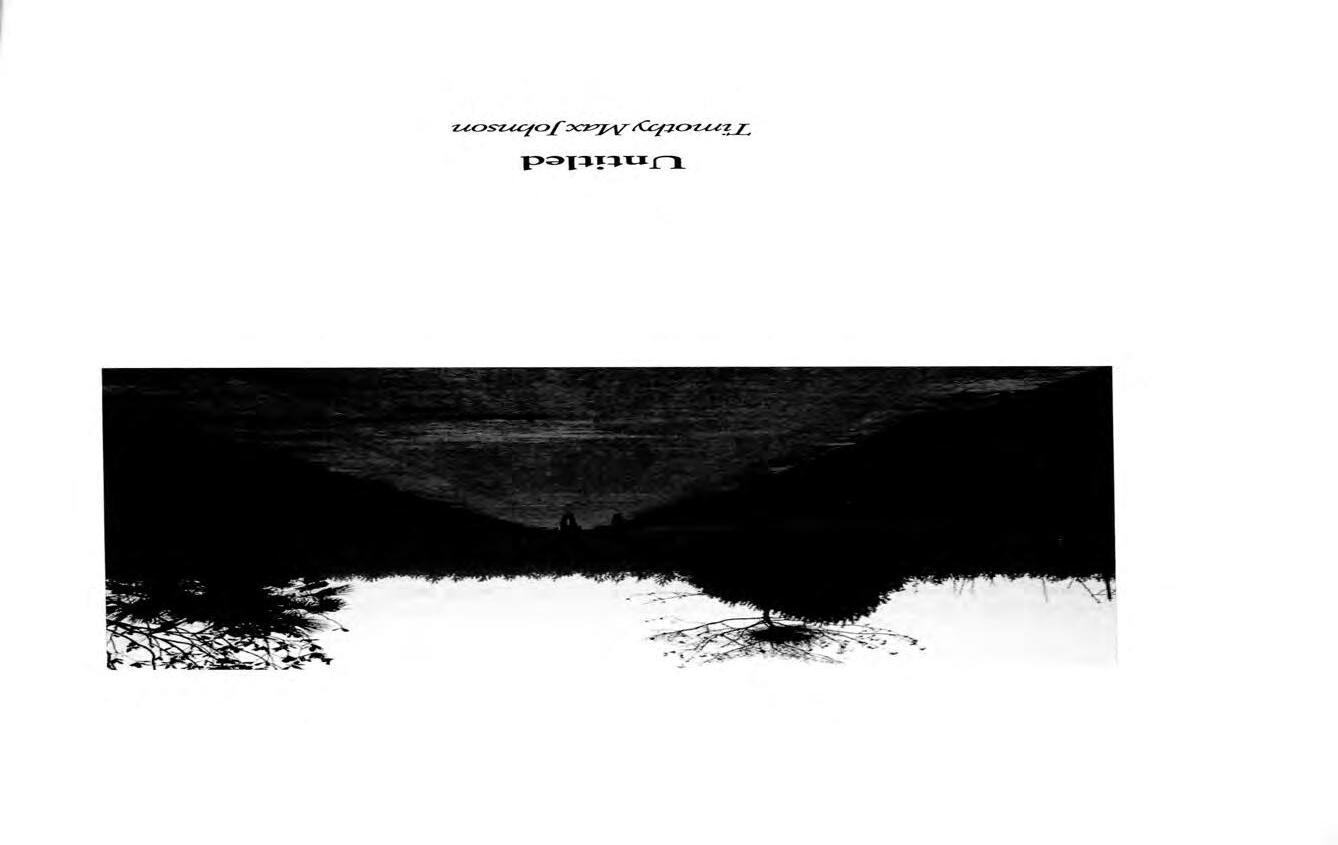
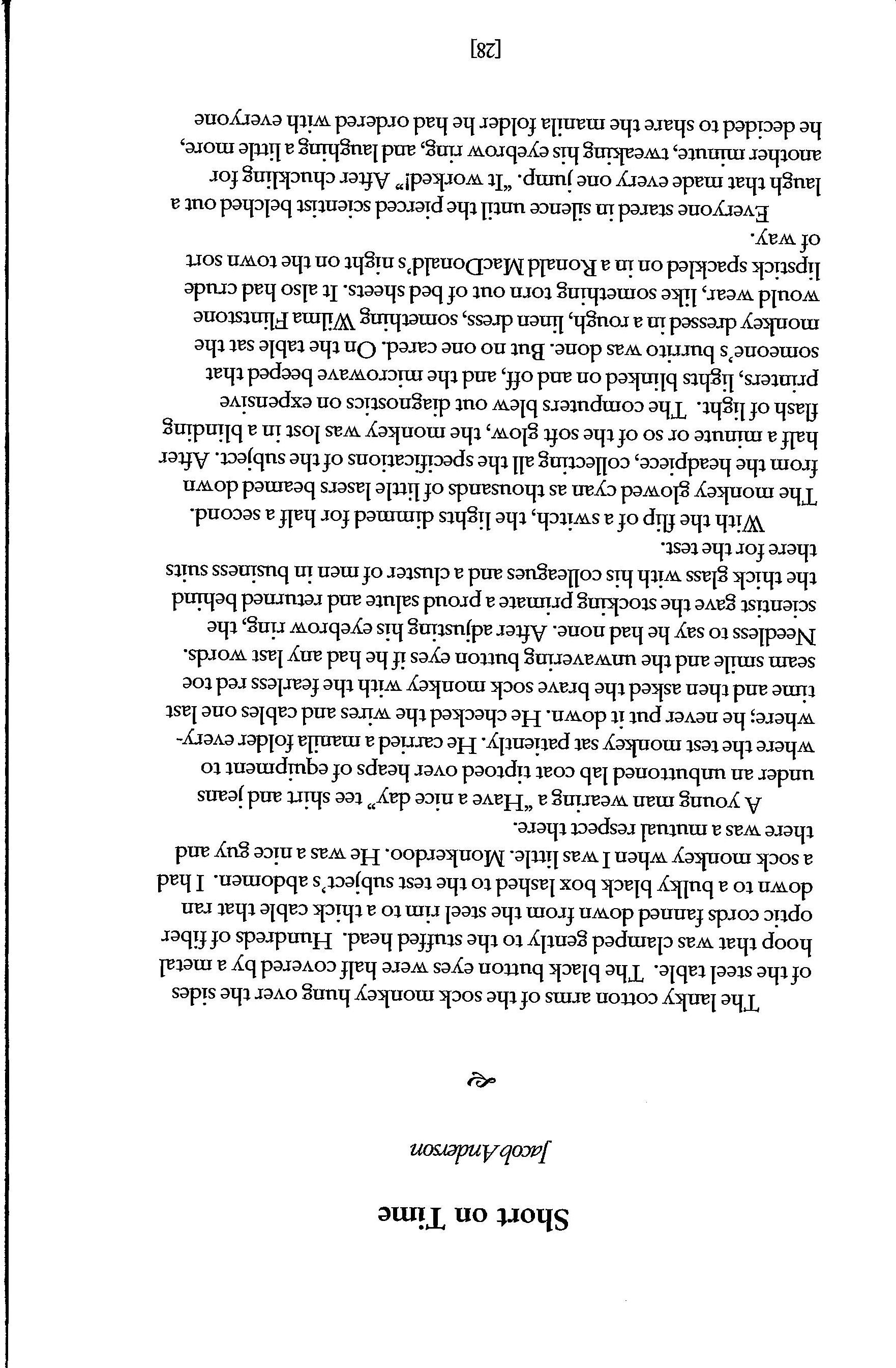
The lanky cotton arms of the sock monkey hung over the sides of the steel table. The black button eyes were half covered by a metal hoop that was clamped gently to the stuffed head. Hundreds of fiber optic cords fanned down from the steel rim to a thick cable that ran down to a bulky black box lashed to the test subject's abdomen. I had a sock monkey when I was little. Monkerdoo. He was a nice guy and there was a mutual respect there.
A young man wearing a "Have a nice day" tee shirt and jeans under an unbuttoned lab coat tiptoed over heaps of equipment to where the test monkey sat patiently. He carried a manila folder everywhere; he never put it down. He checked the wires and cables one last time and then asked the brave sock monkey with the fearless red toe seam smile and the unwavering button eyes if he had any last words. Needless to say he had none. After adjusting his eyebrow ring, the scientist gave the stocking primate a proud salute and returned behind the thick glass with his colleagues and a cluster of men in business suits there for the test.
With the flip of a switch, the lights dimmed for half a second. The monkey glowed cyan as thousands of little lasers beamed down from the headpiece, collecting all the specifications of the subject. After half a minute or so of the soft glow, the monkey was lost in a blinding flash of light. The computers blew out diagnostics on expensive printers, lights blinked on and off, and the microwave beeped that someone's burrito was done. But no one cared. On the table sat the monkey dressed in a rough, linen dress, something Wilma Flintstone would wear, like something torn out of bed sheets. It also had crude lipstick spackled on in a Ronald MacDonald's night on the town sort of way.
Everyone stared in silence until the pierced scientist belched out a laugh that made every one jump. "It worked!" After chuckling for another minute, tweaking his eyebrow ring, and laughing a little more, he decided to share the manila folder he had ordered with everyone
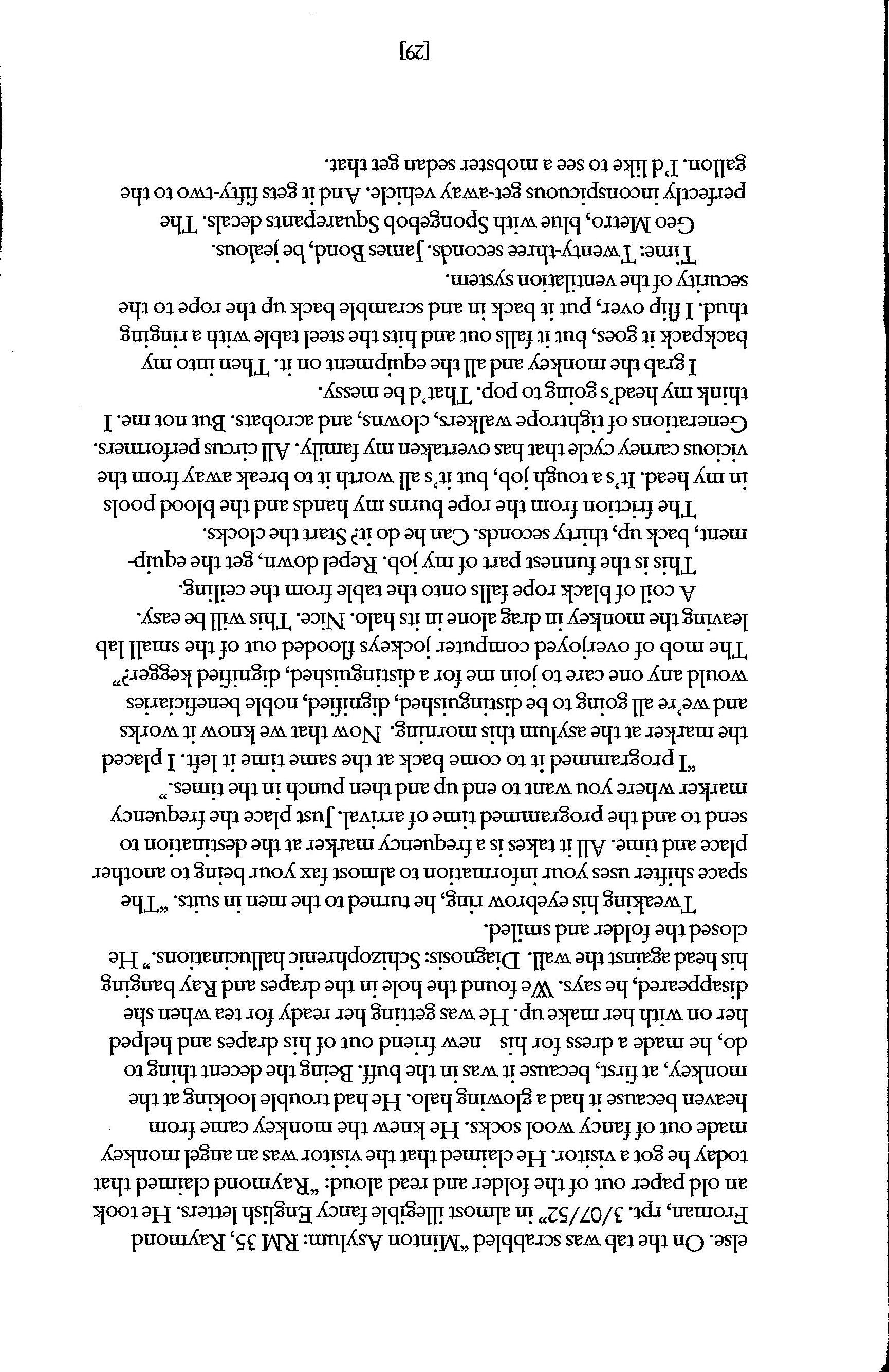
else. On the tab was scrabbled "Minton Asylum: RM 35, Raymond Froman, rpt. 3/07/52" in almost illegible fancy English letters. He took an old paper out of the folder and read aloud: "Raymond claimed that today he got a visitor. He claimed that the visitor was an angel monkey made out of fancy wool socks. He knew the monkey came from heaven because it had a glowing halo. He had trouble looking at the monkey, at first, because it was in the buff. Being the decent thing to do, he made a dress for his new friend out of his drapes and helped her on with her make up. He was getting her ready for tea when she disappeared, he says. We found the hole in the drapes and Ray banging his head against the wall. Diagnosis: Schizophrenic hallucinations." He closed the folder and smiled.
Tweaking his eyebrow ring, he turned to the men in suits. "The space shifter uses your information to almost fax your being to another place and time. All it takes is a frequency marker at the destination to send to and the programmed time of arrival. Just place the frequency marker where you want to end up and then punch in the times."
"I programmed it to come back at the same time it left. I placed the marker at the asylum this morning. Now that we know it works and we're all going to be distinguished, dignified, noble beneficiaries would any one care to join me for a distinguished, dignified kegger?" The mob of overjoyed computer jockeys flooded out of the small lab leaving the monkey in drag alone in its halo. Nice. This will be easy.
A coil of black rope falls onto the table from the ceiling. This is the funnest part of my job. Repel down, get the equipment, back up, thirty seconds. Can he do it? Start the clocks.
The friction from the rope burns my hands and the blood pools in my head. It's a tough job, but it's all worth it to break away from the vicious carney cycle that has overtaken my family. All circus performers. Generations of tightrope walkers, clowns, and acrobats. But not me. I think my head's going to pop. That'd be messy.
I grab the monkey and all the equipment on it. Then into my backpack it goes, but it falls out and hits the steel table with a ringing thud. I flip over, put it back in and scramble back up the rope to the security of the ventilation system.
Time: Twenty-three seconds.James Bond, be jealous. Geo Metro, blue with Spongebob Squarepants decals. The perfectly inconspicuous get-away vehicle. And it gets fifty-two to the gallon. I'd like to see a mobster sedan get that.
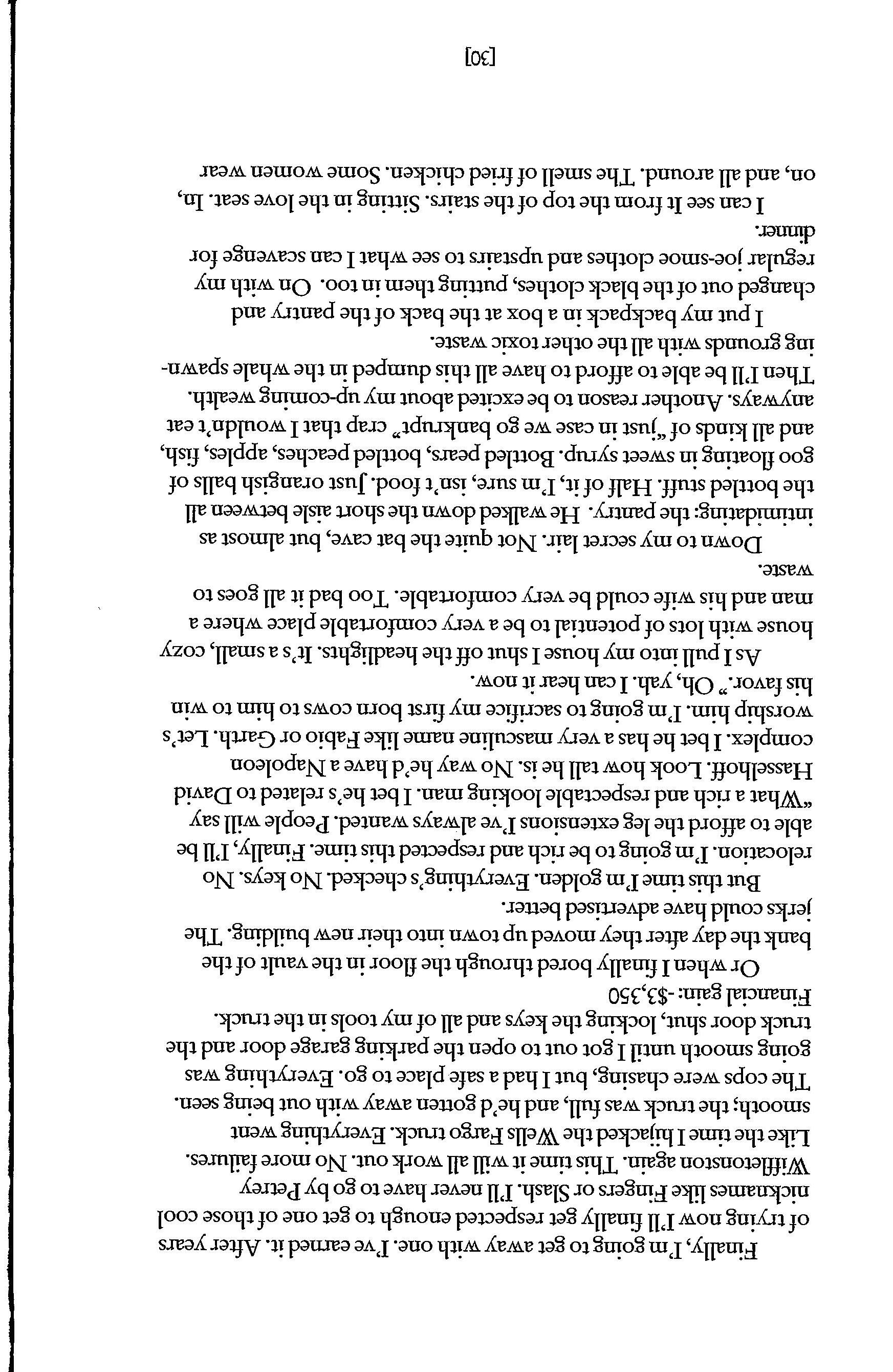
Finally, I'm going to get away with one. I've earned it. After years of trying now I'll finally get respected enough to get one of those cool nicknames like Fingers or Slash. I'll never have to go by Petrey Wiffletonston again. This time it will all work out. No more failures. Like the time I hijacked the Wells Fargo truck. Everything went smooth; the truck was full, and he'd gotten away with out being seen. The cops were chasing, but I had a safe place to go. Everything was going smooth until I got out to open the parking garage door and the truck door shut, locking the keys and all of my tools in the truck.
Financial gain: -$3,350
Or when I finally bored through the floor in the vault of the bank the day after they moved up town into their new building. The jerks could have advertised better.
But this time I'm golden. Everything's checked. No keys. No relocation. I'm going to be rich and respected this time. Finally, I'll be able to afford the leg extensions I've always wanted. People will say "What a rich and respectable looking man. I bet he's related to David Hasselhoff. Look how tall he is. No way he'd have a Napoleon complex. I bet he has a very masculine name like Fabio or Garth. Let's worship him. I'm going to sacrifice my first born cows to him to win his favor." Oh, yah. I can hear it now.
As I pull into my house I shut off the headlights. It's a small, cozy house with lots of potential to be a very comfortable place where a man and his wife could be very comfortable. Too bad it all goes to waste.
Down to my secret lair. Not quite the bat cave, but almost as intimidating: the pantry. He walked down the short aisle between all the bottled stuff. Half of it, I'm sure, isn't food. Just orangish balls of goo floating in sweet syrup. Bottled pears, bottled peaches, apples, fish, and all kinds of "just in case we go bankrupt" crap that I wouldn't eat anyways. Another reason to be excited about my up-coming wealth. Then I'll be able to afford to have all this dumped in the whale spawning grounds with all the other toxic waste.
I put my backpack in a box at the back of the pantry and changed out of the black clothes, putting them in too. On with my regular joe-smoe clothes and upstairs to see what I can scavenge for dinner.
I can see It from the top of the stairs. Sitting in the love seat. In, on, and all around. The smell of fried chicken. Some women wear
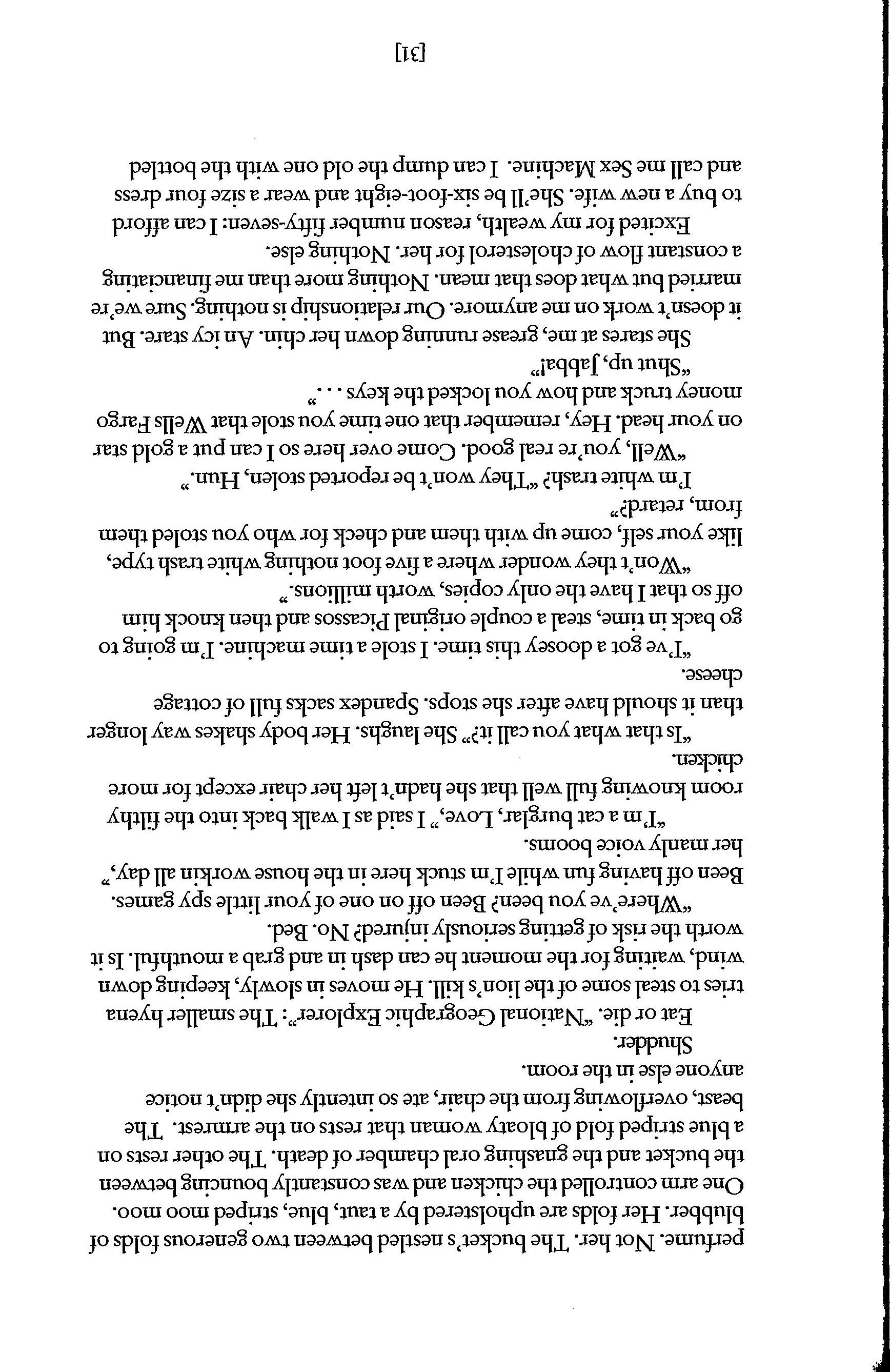
perfume. Not her. The bucket's nestled between two generous folds of blubber. Her folds are upholstered by a taut, blue, striped moo moo. One arm controlled the chicken and was constantly bouncing between the bucket and the gnashing oral chamber of death. The other rests on a blue striped fold of bloaty woman that rests on the armrest. The beast, overflowing from the chair, ate so intently she didn't notice anyone else in the room.
Shudder.
Eat or die. "National Geographic Explorer": The smaller hyena tries to steal some of the lion's kill. He moves in slowly, keeping down wind, waiting for the moment he can dash in and grab a mouthful. Is it worth the risk of getting seriously injured? No. Bed.
"Where've you been? Been off on one of your little spy games. Been off having fun while I'm stuck here in the house workin all day," her manly voice booms.
"I'm a cat burglar, Love," I said as I walk back into the filthy room knowing full well that she hadn't left her chair except for more chicken.
"Is that what you call it?" She laughs. Her body shakes way longer than it should have after she stops. Spandex sacks full of cottage cheese.
"I've got a doosey this time. I stole a time machine. I'm going to go back in time, steal a couple original Picassos and then knock him off so that I have the only copies, worth millions."
"Won't they wonder where a five foot nothing white trash type, like your self, come up with them and check for who you stoled them from, retard?"
I'm white trash? "They won't be reported stolen, Hun."
"Well, you're real good. Come over here so lean put a gold star on your head. Hey, remember that one time you stole that Wells Fargo money truck and how you locked the keys ... "
"Shut up, Jabba!"
She stares at me, grease running down her chin. An icy stare. But it doesn't work on me anymore. Our relationship is nothing. Sure we're married but what does that mean. Nothing more than me financiating a constant flow of cholesterol for her. Nothing else.
Excited for my wealth, reason number fifty-seven: I can afford to buy a new wife. She'll be six-foot-eight and wear a size four dress and call me Sex Machine. I can dump the old one with the bottled
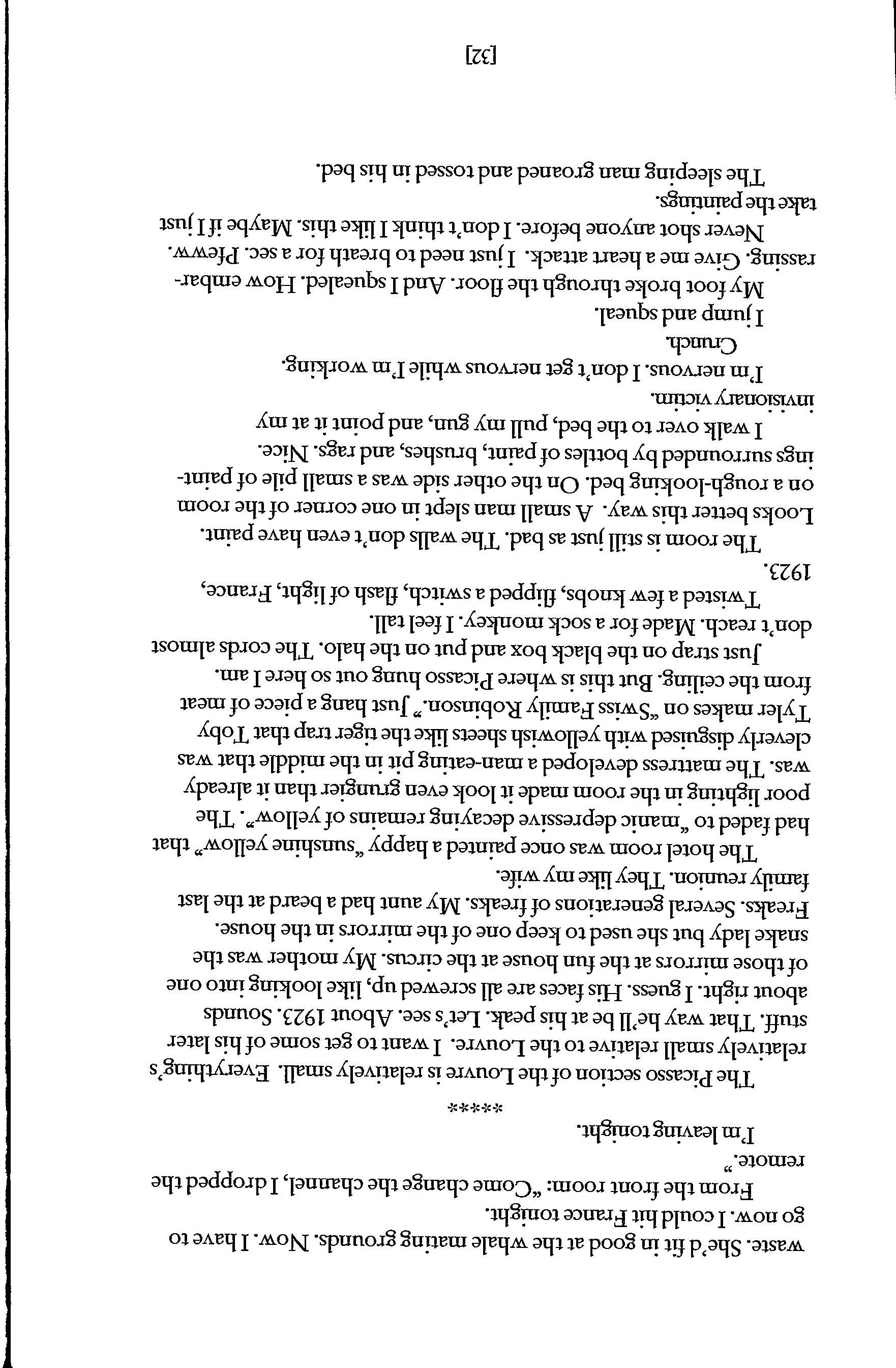
waste. She'd fit in good at the whale mating grounds. Now. I have to go now. I could hit France tonight.
From the front room: "Come change the channel, I dropped the remote."
I'm leaving tonight.
The Picasso section of the Louvre is relatively small. Everything' s relatively small relative to the Louvre. I want to get some of his later stuff. That way he'll be at his peak. Let's see. About 1923. Sounds about right. I guess. His faces are all screwed up, like looking into one of those mirrors at the fun house at the circus. My mother was the snake lady but she used to keep one of the mirrors in the house. Freaks. Several generations of freaks. My aunt had a beard at the last family reunion. They like my wife.
The hotel room was once painted a happy "sunshine yellow" that had faded to "manic depressive decaying remains of yellow". The poor lighting in the room made it look even grungier than it already was. The mattress developed a man-eating pit in the middle that was cleverly disguised with yellowish sheets like the tiger trap that Toby Tyler makes on "Swiss Family Robinson." Just hang a piece of meat from the ceiling. But this is where Picasso hung out so here I am.
Just strap on the black box and put on the halo. The cords almost don't reach. Made for a sock monkey. I feel tall.
Twisted a few knobs, flipped a switch, flash of light, France, 1923.
The room is still just as bad. The walls don't even have paint. Looks better this way. A small man slept in one corner of the room on a rough-looking bed. On the other side was a small pile of paintings surrounded by bottles of paint, brushes, and rags. Nice.
I walk over to the bed, pull my gun, and point it at my lllV1S10naryV1ctun.
I'm nervous. I don't get nervous while I'm working. Crunch.
I jump and squeal.
My foot broke through the floor. And I squealed. How embarrassing. Give me a heart attack. I just need to breath for a sec. Pfeww. Never shot anyone before. I don't think I like this. Maybe ifI just take the paintings.
The sleeping man groaned and tossed in his bed.
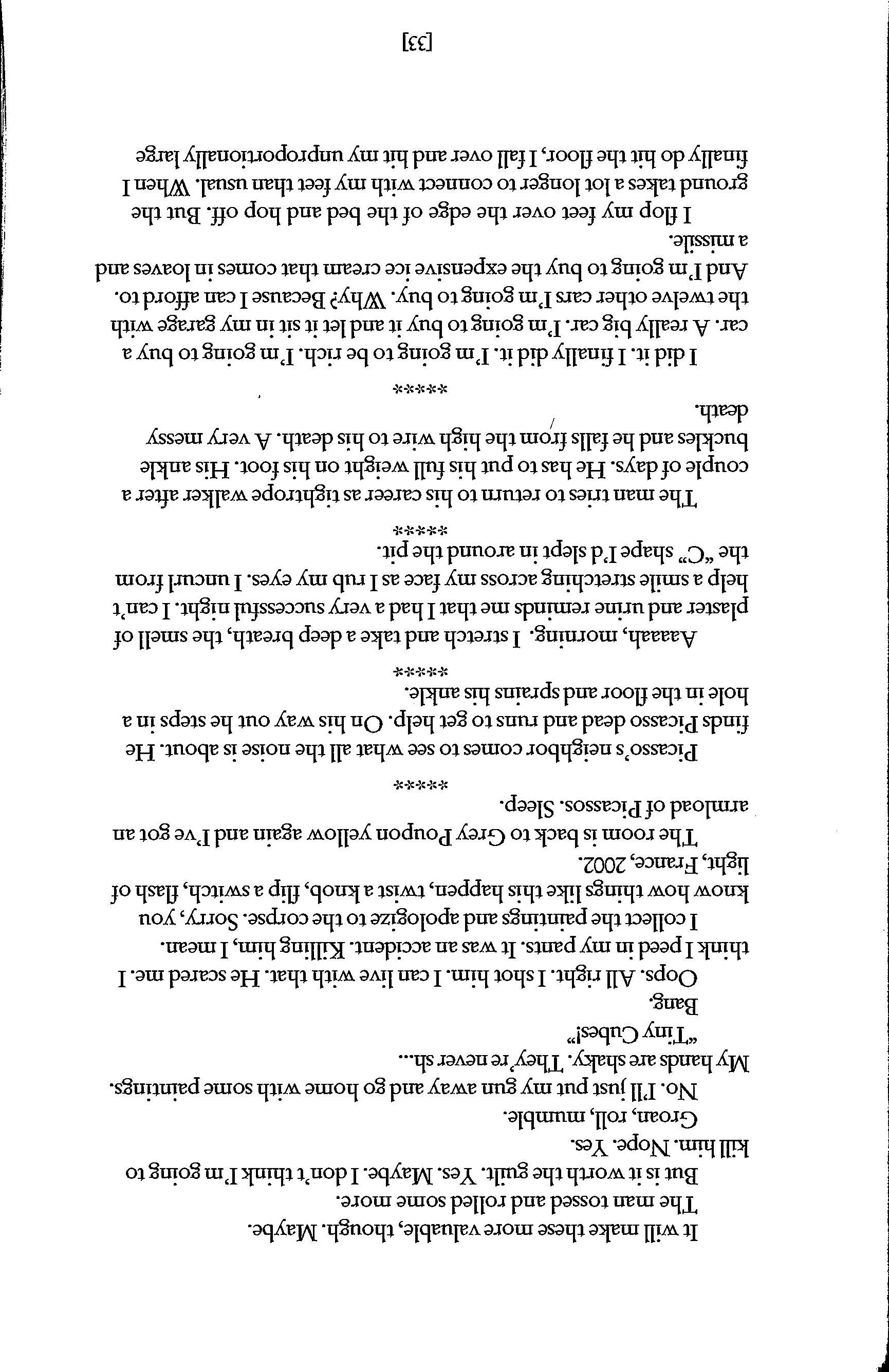
It will make these more valuable, though. Maybe.
The man tossed and rolled some more.
But is it worth the guilt.Yes. Maybe. I don't think I'm going to kill him. Nope. Yes.
Groan, roll, mumble.
No. I'll just put my gun away and go home with some paintings. My hands are shaky. They're never sh...
"Tiny Cubes!"
Bang.
Oops. All right. I shot him. I can live with that. He scared me. I think I peed in my pants. It was an accident. Killing him, I mean.
I collect the paintings and apologize to the corpse. Sorry, you know how things like this happen, twist a knob, flip a switch, flash of light, France, 2002.
The room is back to Grey Poupon yellow again and I've got an armload of Picassos. Sleep.
Picasso's neighbor comes to see what all the noise is about. He finds Picasso dead and runs to get help. On his way out he steps in a hole in the floor and sprains his ankle.
Aaaaah, morning. I stretch and take a deep breath, the smell of plaster and urine reminds me that I had a very successful night. I can't help a smile stretching across my face as I rub my eyes. I uncurl from the "C" shape I'd slept in around the pit.
The man tries to return to his career as tightrope walker after a couple of days. He has to put his full weight on his foot. His ankle buckles and he falls from the high wire to his death. A very messy death. 1
I did it. I finally did it. I'm going to be rich. I'm going to buy a car. A really big car. I'm going to buy it and let it sit in my garage with the twelve other cars I'm going to buy. Why? Because I can afford to. And I'm going to buy the expensive ice cream that comes in loaves and a missile.
I flop my feet over the edge of the bed and hop off. But the ground takes a lot longer to connect with my feet than usual. When I finally do hit the floor, I fall over and hit my unproportionally large
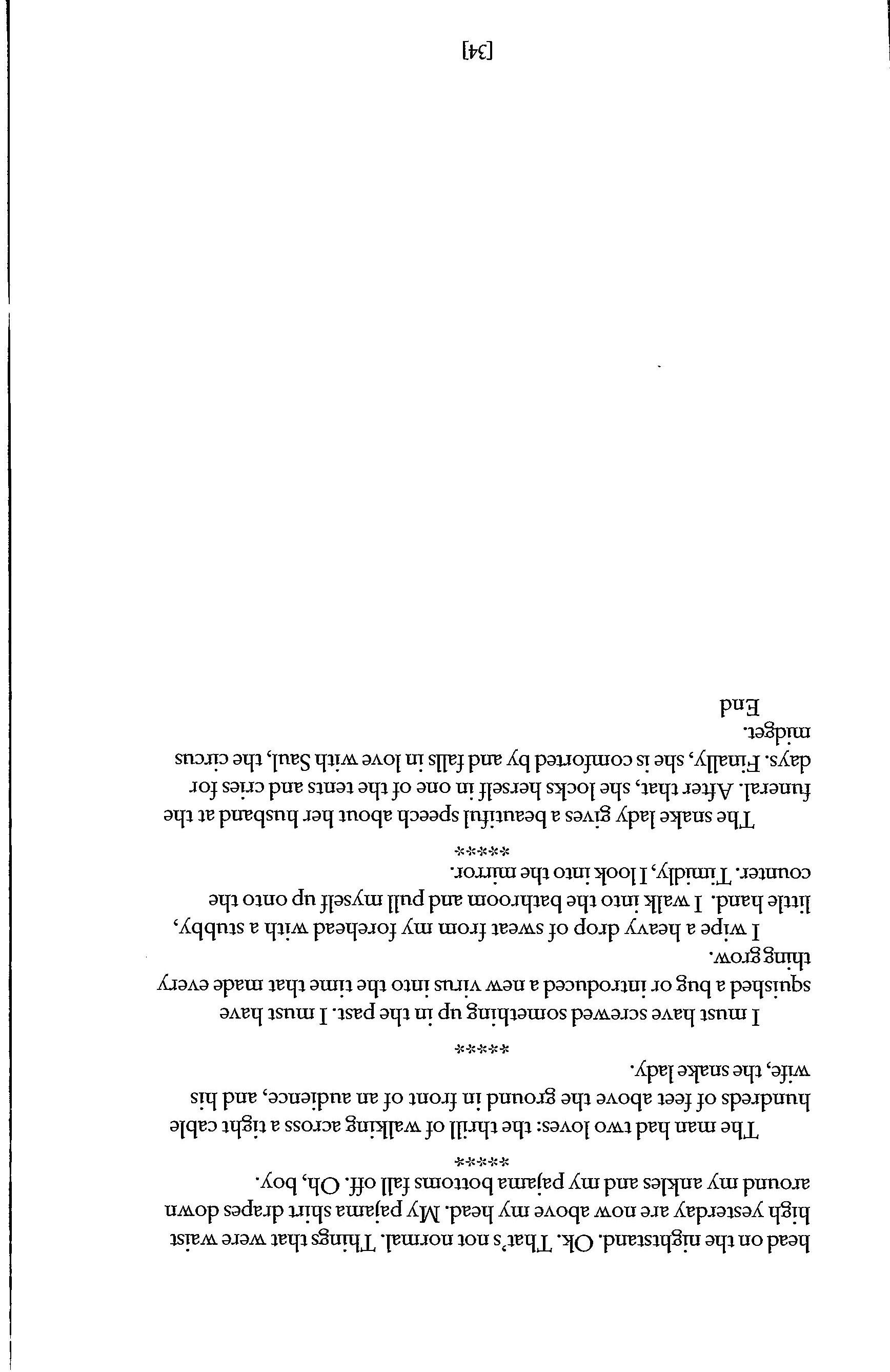
head on the nightstand. Ok. That's not normal. Things that were waist high yesterday are now above my head. My pajama shirt drapes down around my ankles and my pajama bottoms fall off. Oh, boy.
The man had two loves: the thrill of walking across a tight cable hundreds of feet above the ground in front of an audience, and his wife, the snake lady.
I must have screwed something up in the past. I must have squished a bug or introduced a new virus into the time that made every thinggrow.
I wipe a heavy drop of sweat from my forehead with a stubby, little hand. I walk into the bathroom and pull myself up onto the counter. Timidly, I look into the mirror.
The snake lady gives a beautiful speech about her husband at the funeral. After that, she locks herself in one of the tents and cries for days. Finally, she is comforted by and falls in love with Saul, the circus midget. End
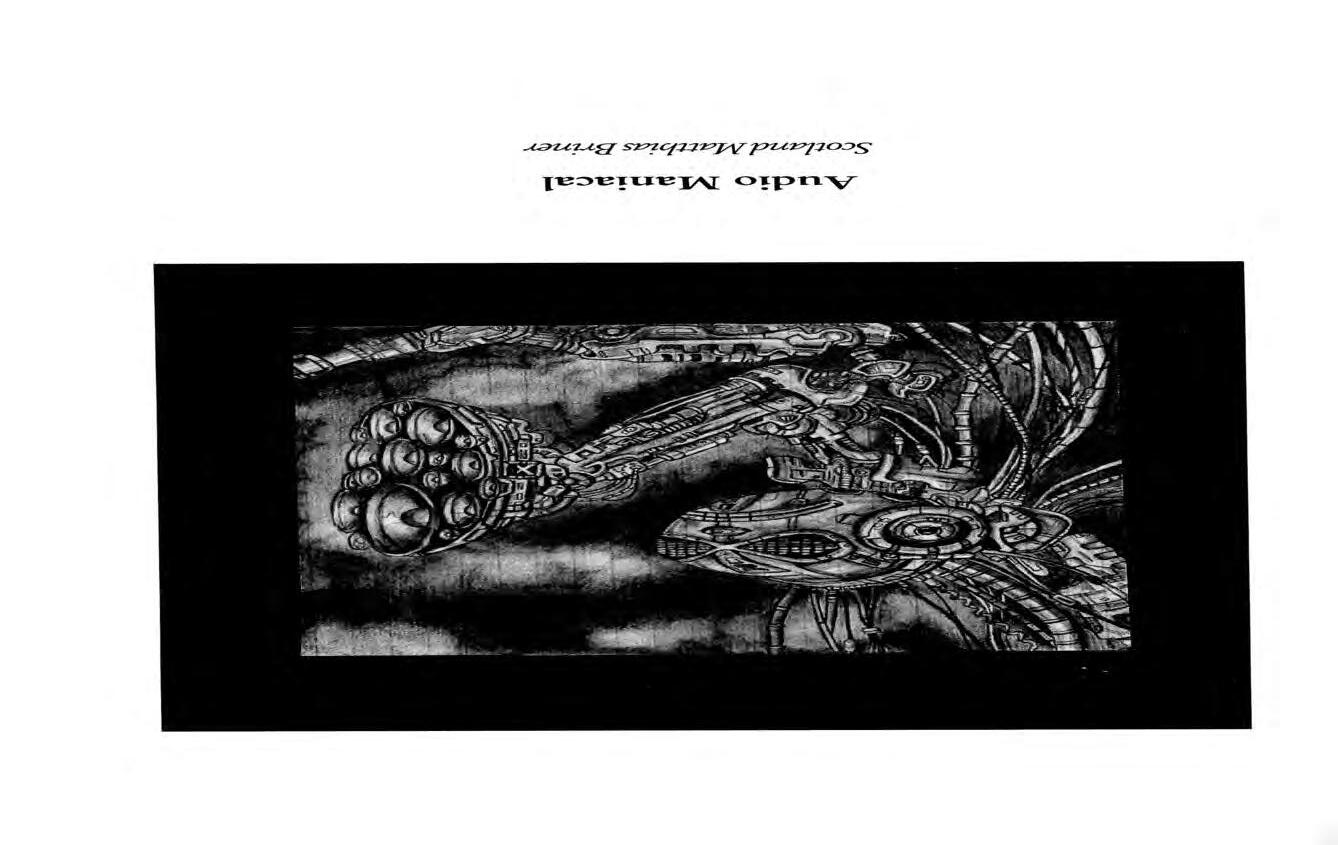
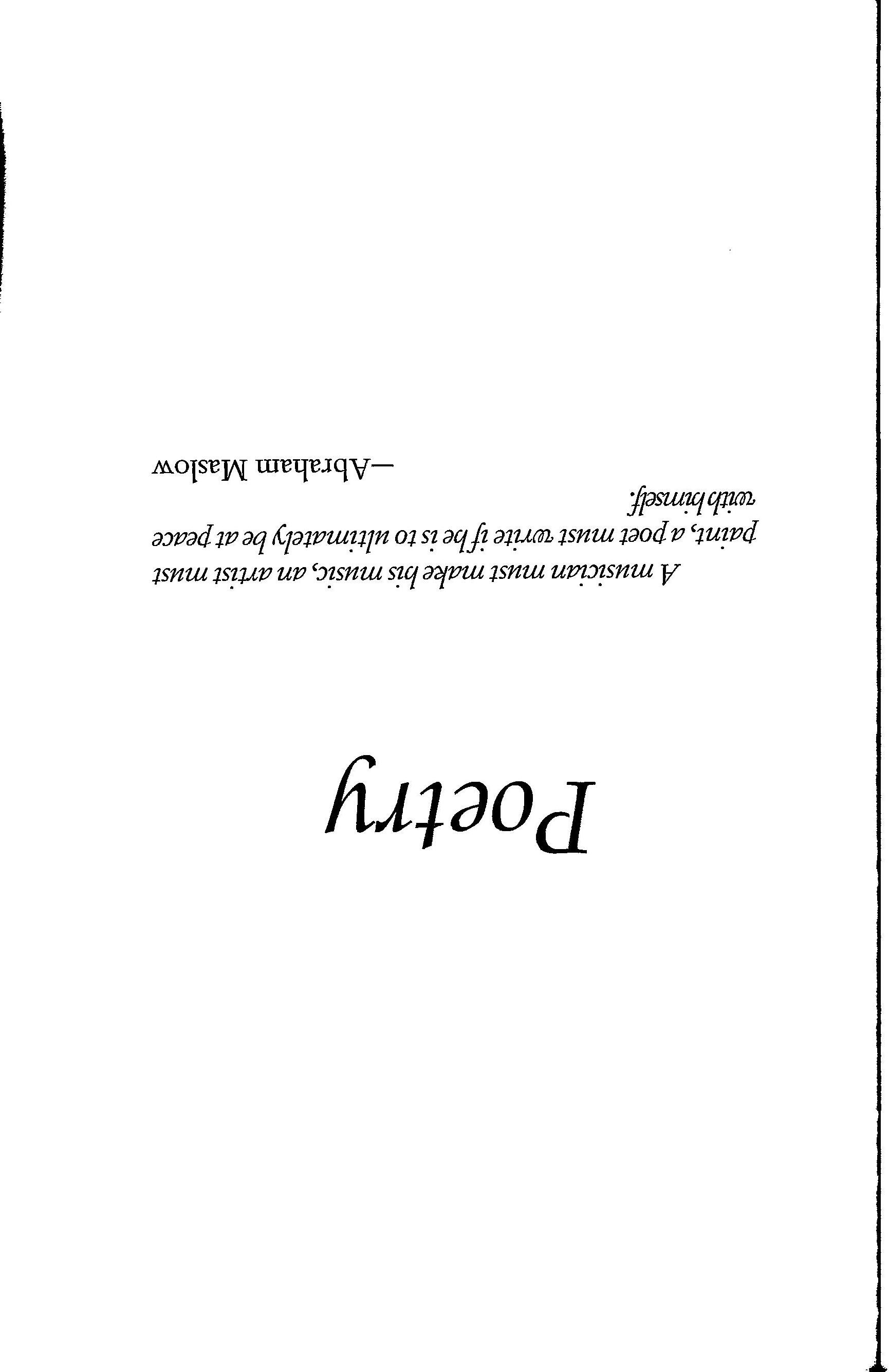
A musician must make his music, an artist must paint, a poet must write ifhe is to ultimately be at peace with himself
-Abraham Maslow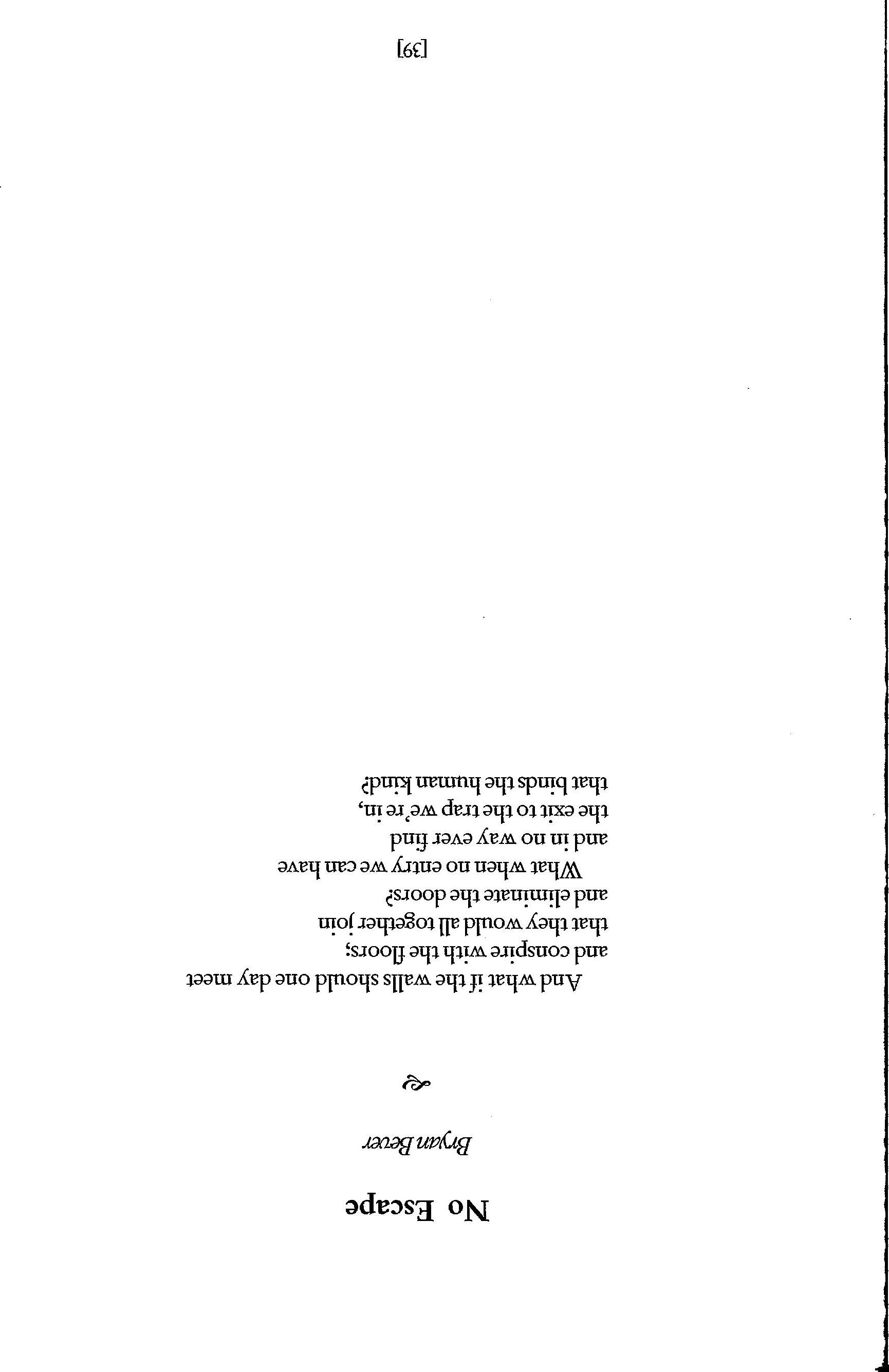
And what if the walls should one day meet and conspire with the floors; that they would all together join and eliminate the doors?
What when no entry we can have and in no way ever find the exit to the trap we' re in, that binds the human kind?
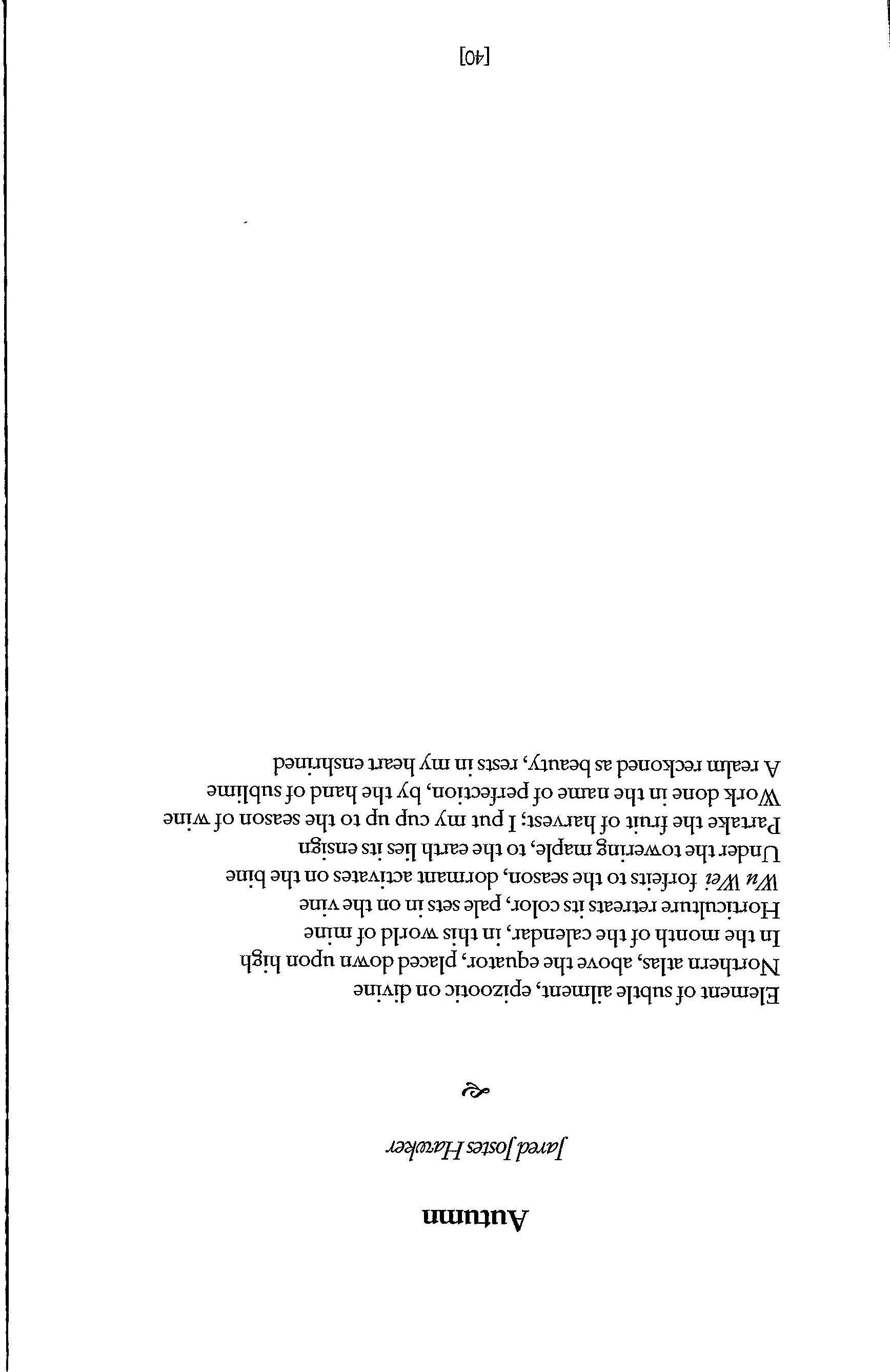
Element of subtle ailment, epizootic on divine
Northern atlas, above the equator, placed down upon high
In the month of the calendar, in this world of mine
Horticulture retreats its color, pale sets in on the vine
Wu Wei forfeits to the season, dormant activates on the bine
Under the towering maple, to the earth lies its ensign
Partake the fruit of harvest; I put my cup up to the season of wine
Work done in the name of perfection, by the hand of sublime
A realm reckoned as beauty, rests in my heart enshrined
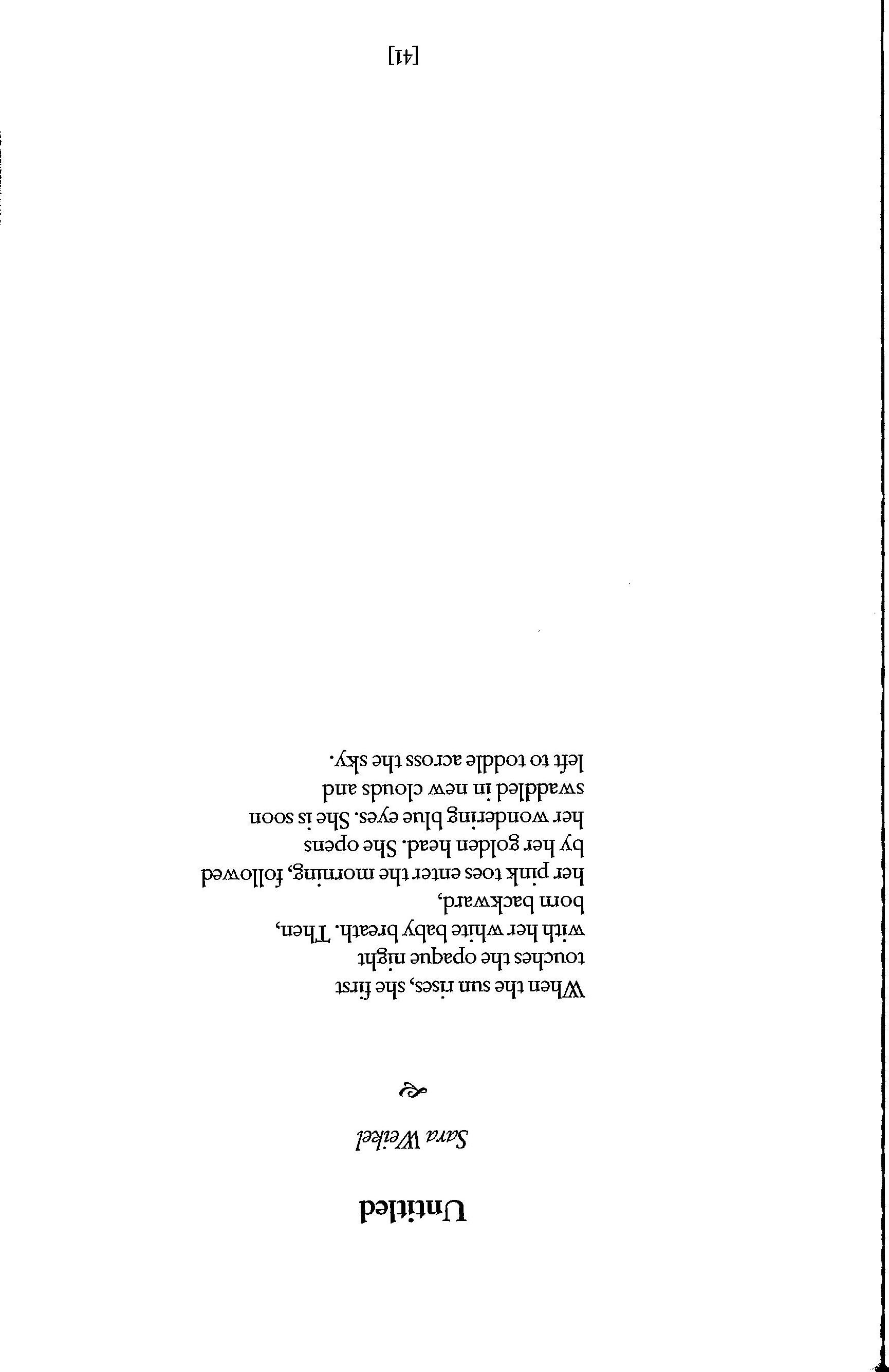
When the sun rises, she first touches the opaque night with her white baby breath. Then, born backward, her pink toes enter the morning, followed by her golden head. She opens her wondering blue eyes. She is soon swaddled in new clouds and left to toddle across the sky.

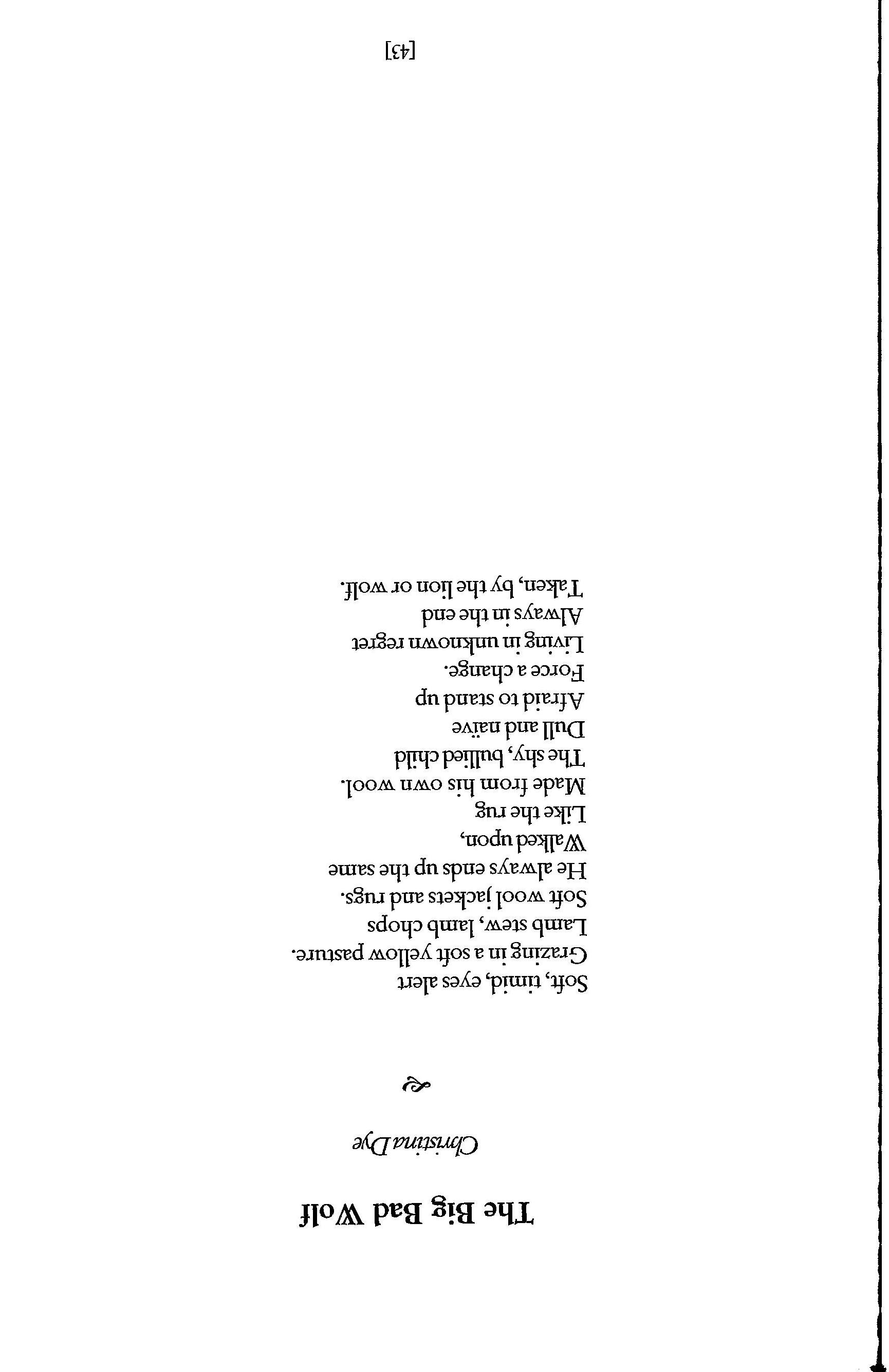
Soft, timid, eyes alert
Grazing in a soft yellow pasture.
Lamb stew, lamb chops
Soft wool jackets and rugs.
He always ends up the same
Walked upon,
Like the rug
Made from his own wool.
The shy, bulliedchild
Dull and naive
Afraid to stand up
Force a change.
Living in unknown regret
Always in the end
Taken, by the lion or wolf.
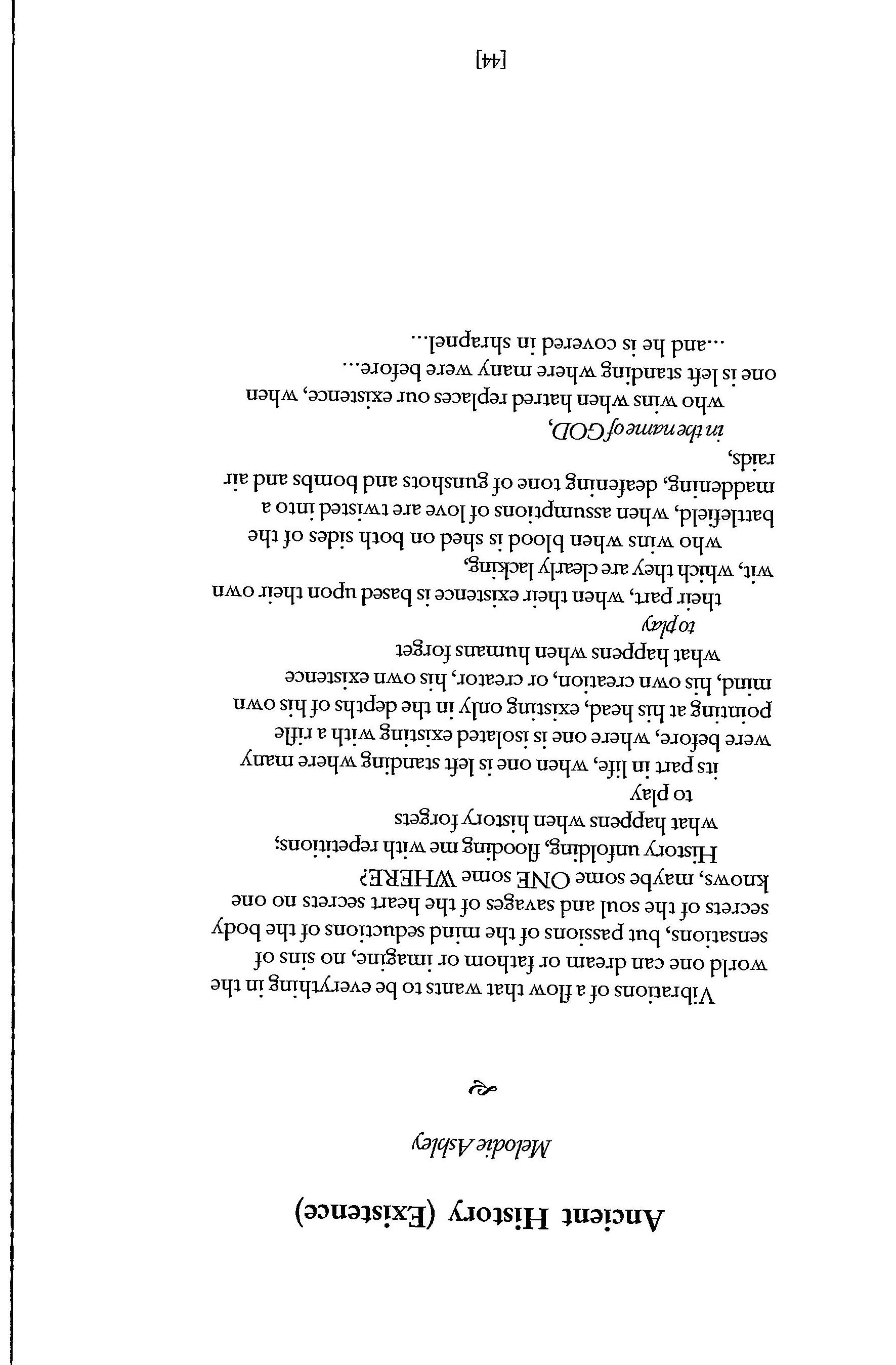
Vibrations of a flow that wants to be everything in the world one can dream or fathom or imagine, no sins of sensations, but passions of the mind seductions of the body secrets of the soul and savages of the heart secrets no one knows, maybe some ONE some WHERE?
History unfolding, flooding me with repetitions; what happens when history forgets to play
its part in life, when one is left standing where many were before, where one is isolated existing with a rifle pointing at his head, existing only in the depths of his own mind, his own creation, or creator, his own existence what happens when humans forget toplay
their part, when their existence is based upon their own wit, which they are clearly lacking, who wins when blood is shed on both sides of the battlefield, when assumptions of love are twisted into a maddening, deafening tone of gunshots and bombs and air raids, in the name ofGOD, who wins when hatred replaces our existence, when one is left standing where many were before ... . .. and he is covered in shrapnel...

IWhere can I find to whom is sung the truth
Of whom I love, for whom I love is dead. And if I bow to talk to you instead, Because I am a victim of my youth, A lonesome heart bringeth me closer still
To someone further from the one I love, One, with such love but knew 'most nothing of, I all the while his arms around me feel
In my imagination! I dream still
Of his beauty. And I upon my throne
Sit still sideways; my thoughts are on this one,
Though I he did not know, now never will, I in his arms still find repose; I rest.
Ears and heart I yours detest, but test.
It is not flattery your verses are Buried 'neath the floorboards 'neath my bed.
Unholy rite, unwelcome act, tradition rare
Love thus o'er which my jaded heels do tread.
All right! Tradition! Spells this very clear: Such thought is brewed, ringing in your head: Ring! Ringing in your head! Quick, scratch your ear!
Love 'neath such grounds remains near she and bed!
Oh why did die the he whom I tormented, Offended! His cruel words did take my life. His words, his hair, his eyes him me befriended
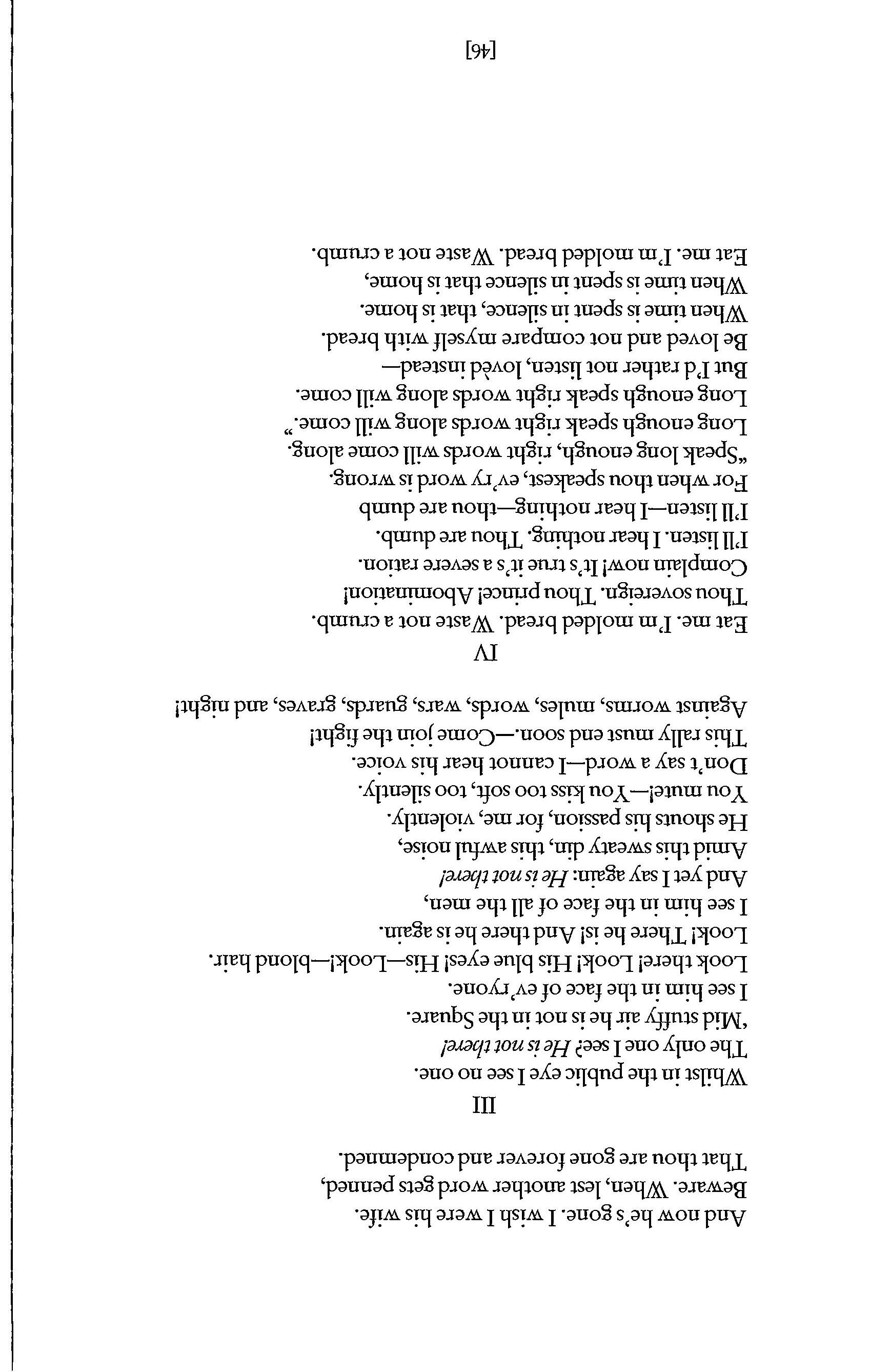
And now he's gone. I wish I were his wife.
Beware. When, lest another word gets penned, That thou are gone forever and condemned.
Whilst in the public eye I see no one. The only one I see? He is not there!
'Mid stuffy air he is not in the Square.
I see him in the face of ev'ryone. Look there! Look! His blue eyes! His-Look!-blond hair. Look! There he is! And there he is again.
I see him in the face of all the men, And yet I say again: He is not there!
Amid this sweaty din, this awful noise, He shouts his passion, for me, violently. You mute!-You kiss too soft, too silently. Don't say a word-I cannot hear his voice. This rally must end soon.-Come join the fight! Against worms, mules, words, wars, guards, graves, and night!
Eat me. I'm molded bread. Waste not a crumb. Thou sovereign. Thou prince! Abomination! Complain now! It's true it's a severe ration.
I'll listen. I hear nothing. Thou are dumb.
I'll listen-I hear nothing-thou are dumb
For when thou speakest, ev' ry word is wrong.
"Speak long enough, right words will come along. Long enough speak right words along will come."
Long enough speak right words along will come. But I'd rather not listen, loved insteadBe loved and not compare myself with bread.
When time is spent in silence, that is home.
When time is spent in silence that is home, Eat me. I'm molded bread. Waste not a crumb.
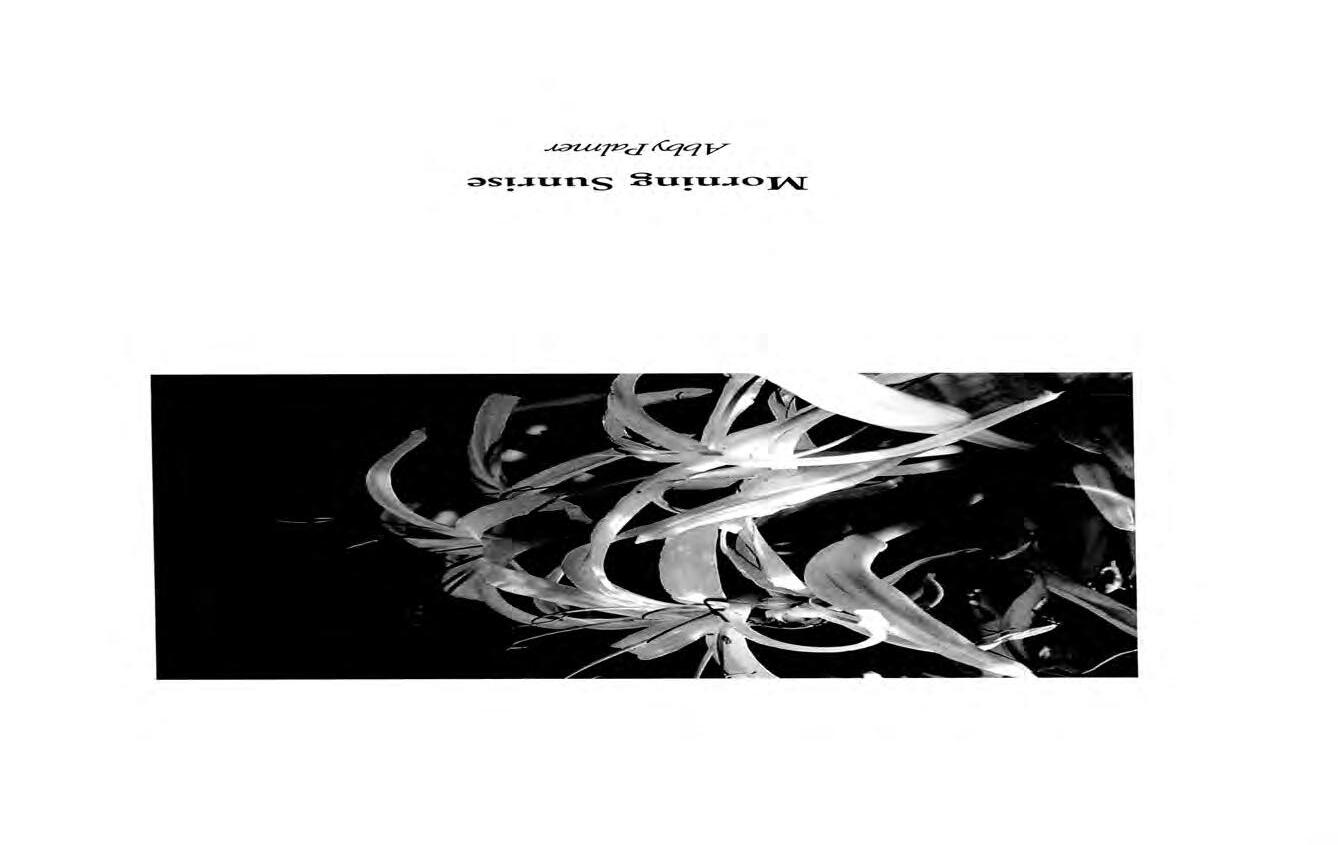
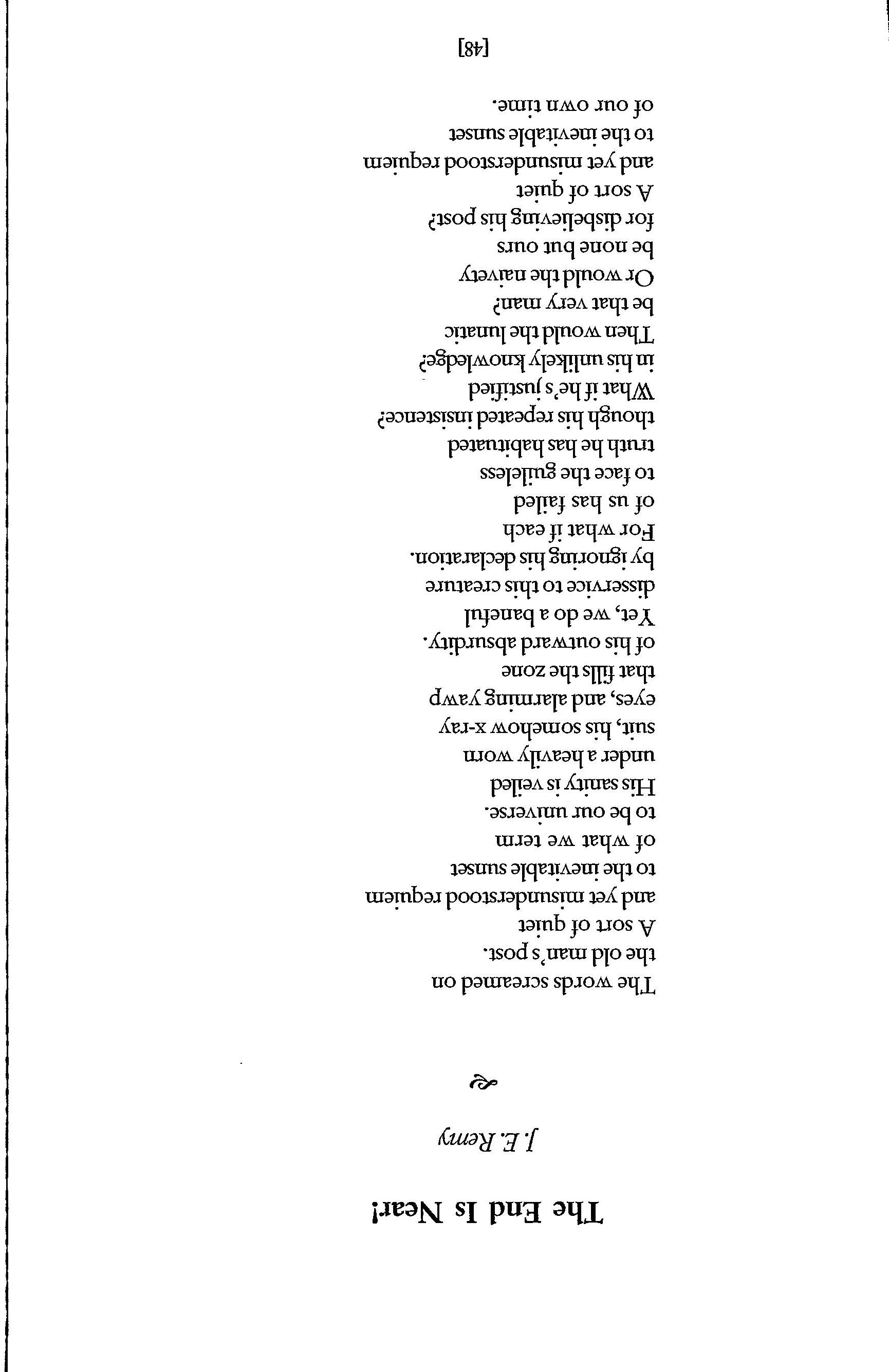
The words screamed on the old man's post. A sort of quiet and yet misunderstood requiem to the inevitable sunset of what we term to be our universe. His sanity is veiled under a heavily worn suit, his somehow x-ray eyes, and alarming yawp that fills the zone of his outward absurdity. Yet, we do a baneful disservice to this creature by ignoring his declaration. For what if each of us has failed to face the guileless truth he has habituated though his repeated insistence? What if he's justified in his unlikely knowledge? Then would the lunatic be that very man? Or would the naivety be none but ours for disbelieving his post? A sort of quiet and yet misunderstood requiem to the inevitable sunset of our own time.
KeoinMorris
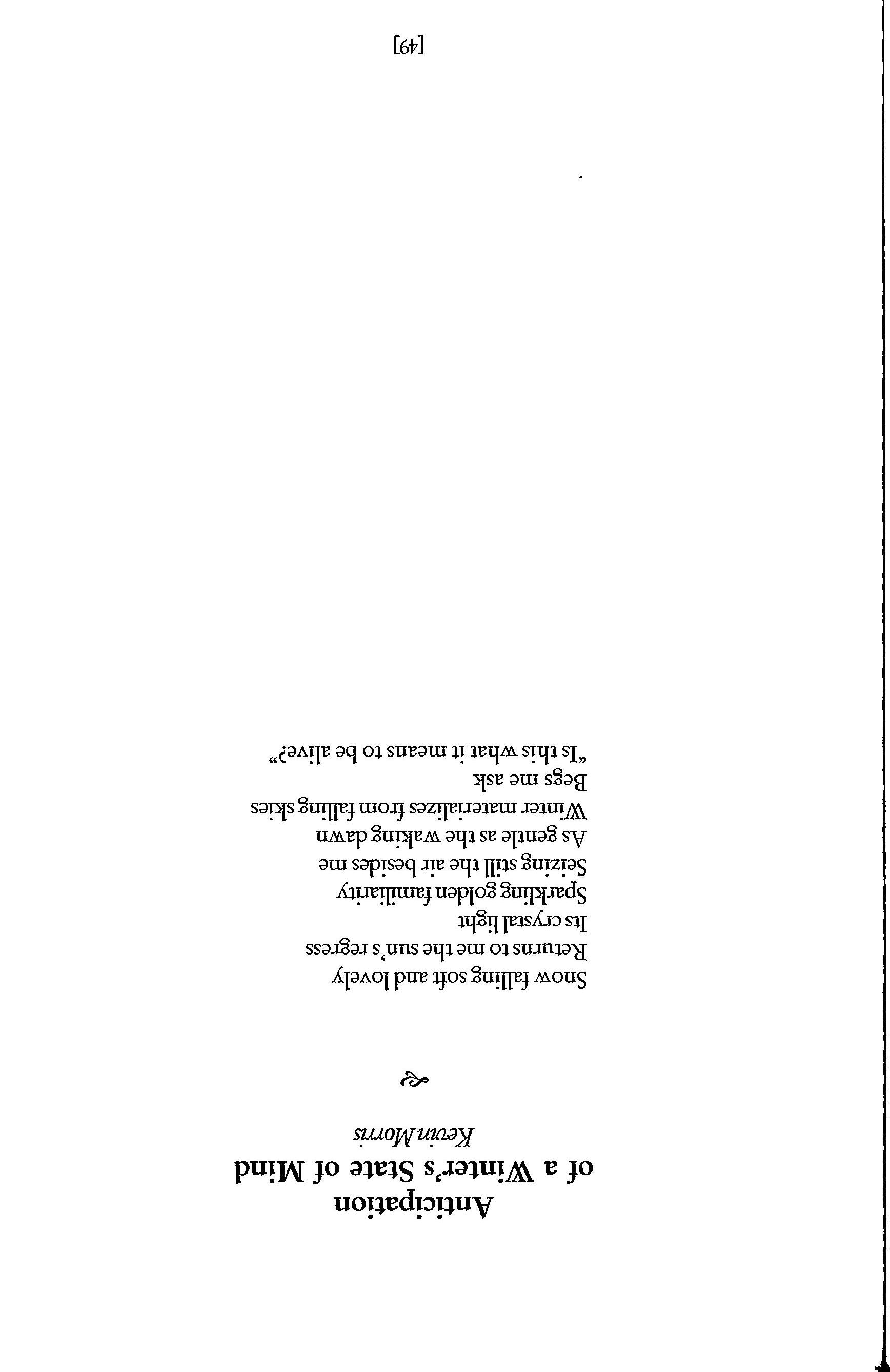
Snow falling soft and lovely
Returns to me the sun's regress
Its crystal light
Sparkling golden familiarity
Seizing still the air besides me
As gentle as the waking dawn
Winter materializes from falling skies
Begs me ask
"Is this what it means to be alive?"
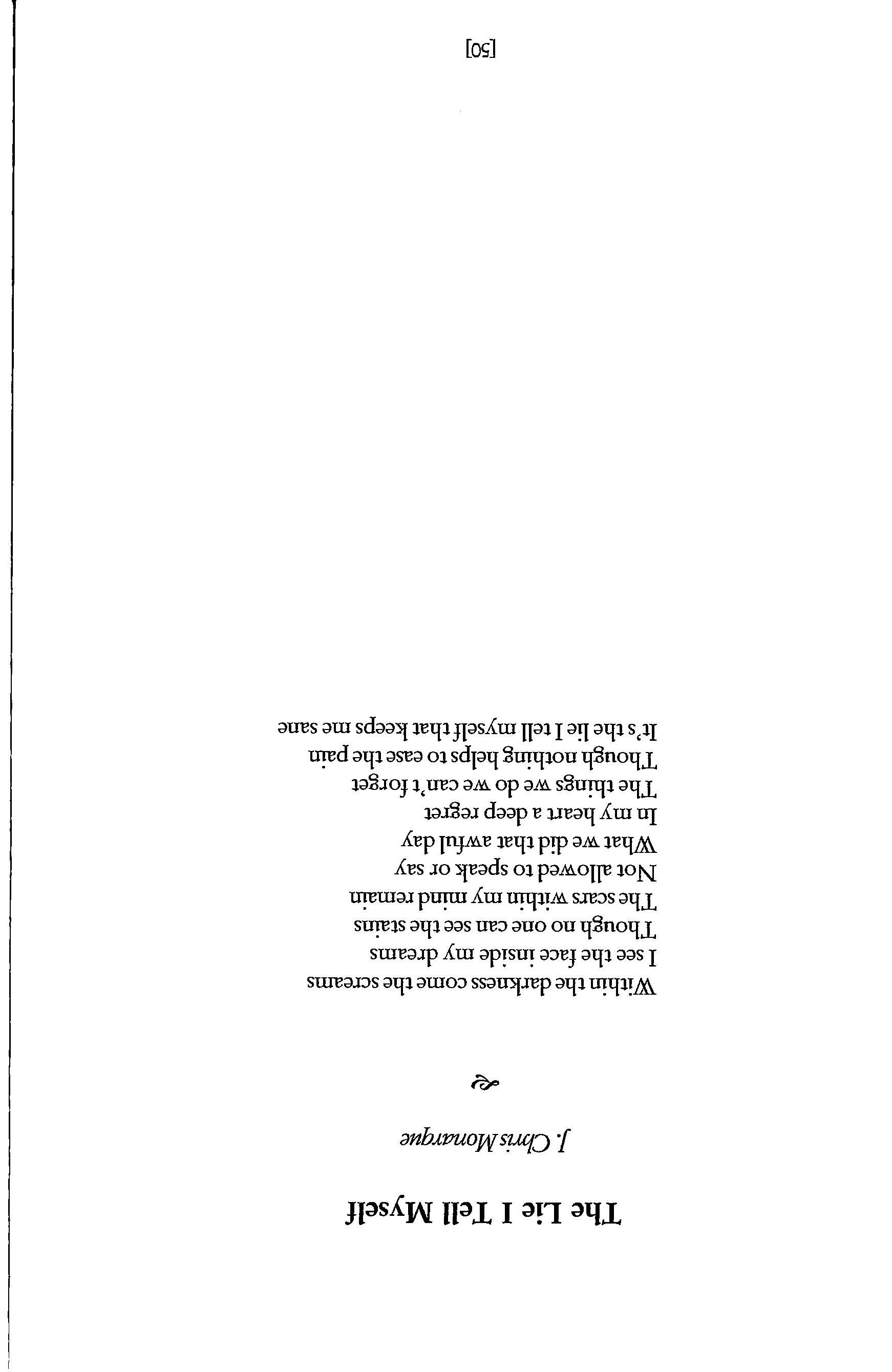
Within the darkness come the screams
I see the face inside my dreams
Though no one can see the stains
The scars within my mind remain
Not allowed to speak or say
Whatwedidthatawfulday
In my heart a deep regret
The things we do we can't forget
Though nothing helps to ease the pain
It's the lie I tell myself that keeps me sane

Busque tu ser;
en la oscura soledad del silencio y note encontre ... Grite tu nombre;
a la noche que devoraba el dia y no respondiste ... Llore de angustia esperando tu perdon;
y las lagrimas banaron mi cuerpo Soiie despierto mientras anhelaba tu presencia; y solo el recuerdo acudio a mis sueiios
T rate de hallarte;
y me perdi en el velo ...
El velo absurdo de la cruenta noche, la misma que siempre se viste de Negro ...
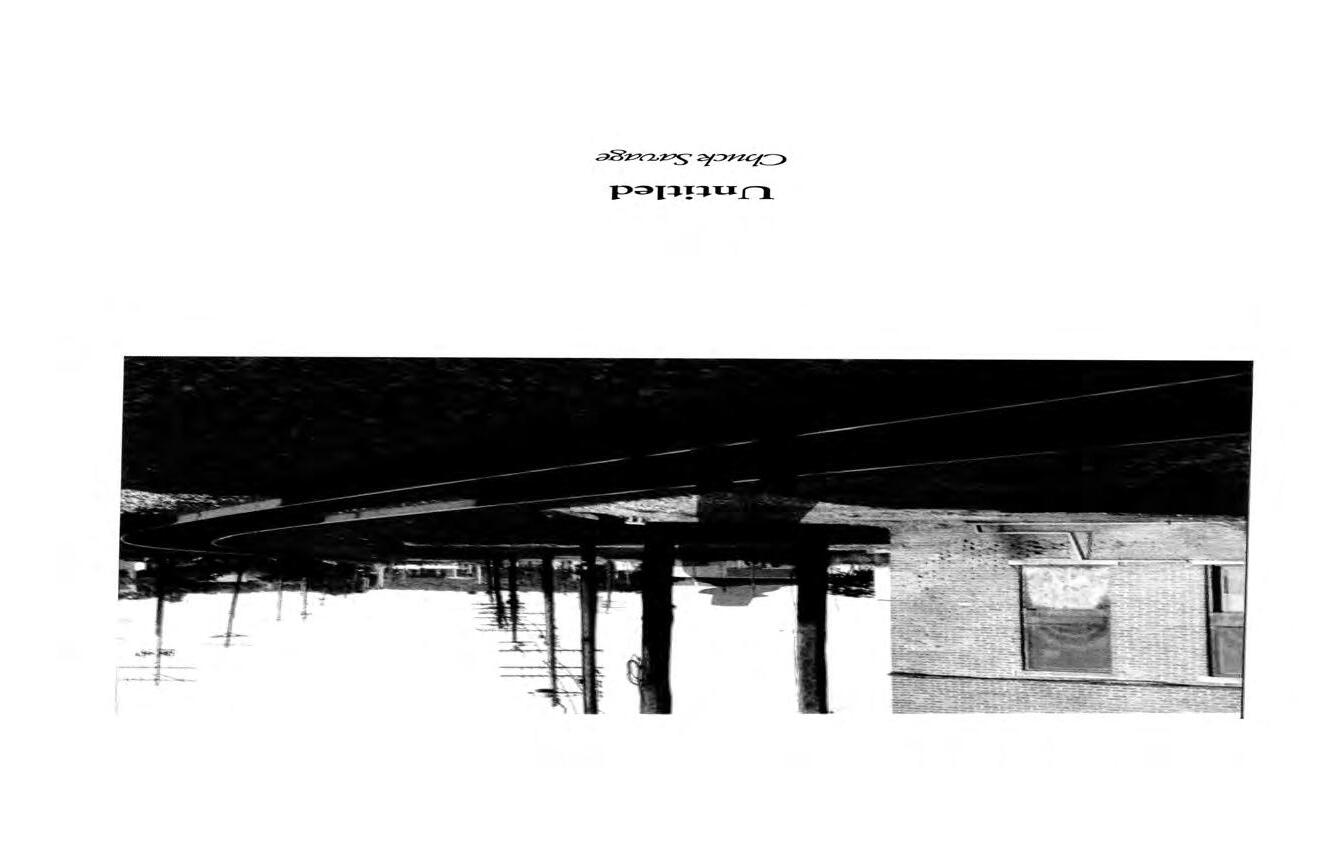

Another lonely, old, St. Patrick's Day
Autumn leaves have long since disappeared
And smiling faces turned sour.
Warmth kisses the icy air
As Spring promises to peek her head
Through the door of this mysterious storm.
Passionate peas and angry strawberries
Along with contempt and jealousy
Because I have fresh salsa and lemonade.
Then the sky screams of war
As the seasons fight to push out winter's wind.
Like the moldy ocean or gloomy bumblebees.
At the end of a long day,
I stuff a wad of money into my denim blue jeans
Then set fire to my house and property
\Why?
St. Patrick had finally driven me insane
With all his hollow preaching
And unstable weather.
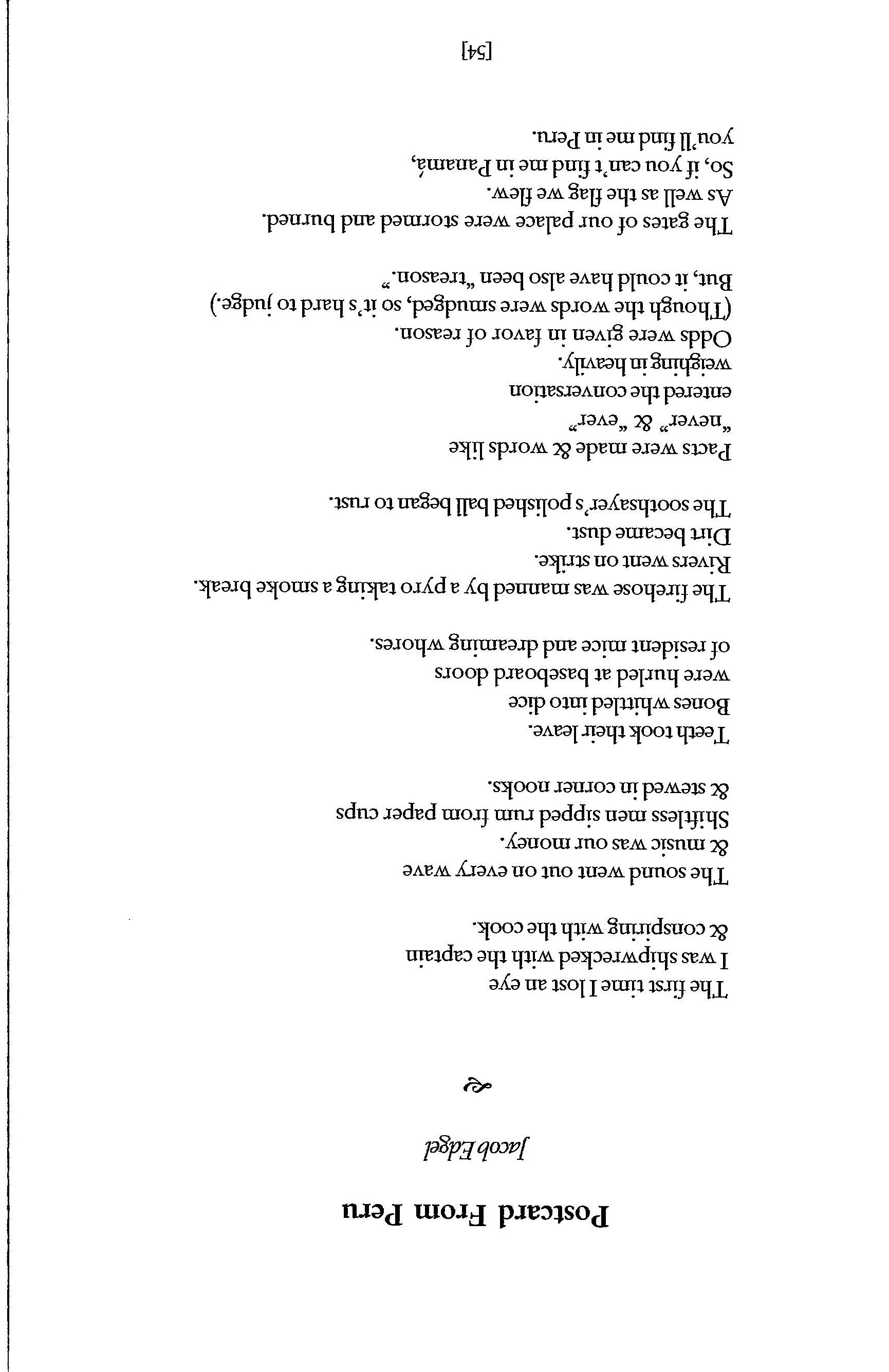
The first time I lost an eye I was shipwrecked with the captain & conspiring with the cook.
The sound went out on every wave & music was our money. Shiftless men sipped rum from paper cups & stewed in corner nooks.
Teeth took their leave.
Bones whittled into dice were hurled at baseboard doors of resident mice and dreaming whores.
The firehose was manned by a pyro taking a smoke break. Rivers went on strike.
Dirt became dust.
The soothsayer's polished ball began to rust.
Pacts were made & words like "never" & "ever" entered the conversation weighing in heavily.
Odds were given in favor of reason.
(Though the words were smudged, so it's hard to judge.) But, it could have also been "treason."
The gates of our palace were stormed and burned. As well as the flag we flew. So, if you can't find me in Panama, you'll find me in Peru.
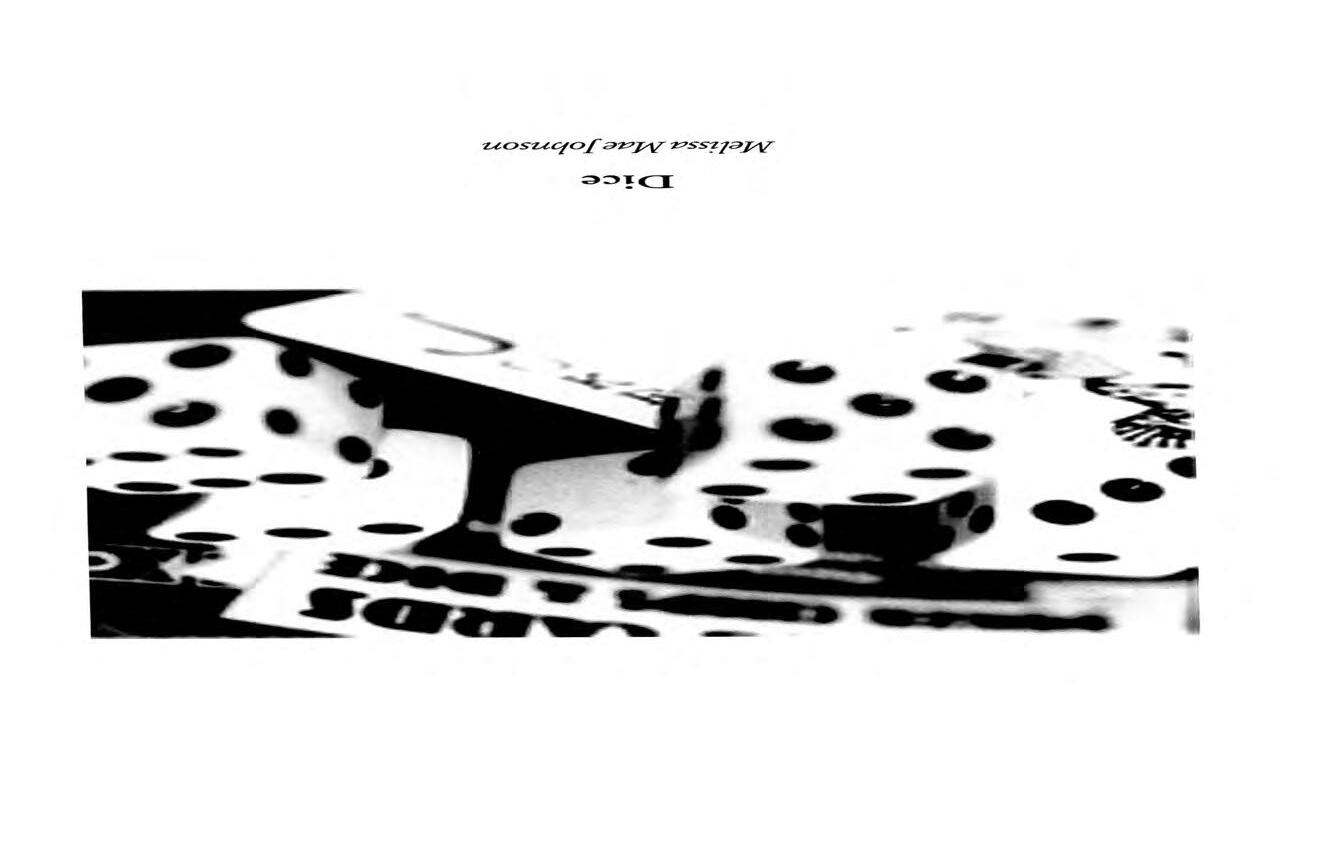
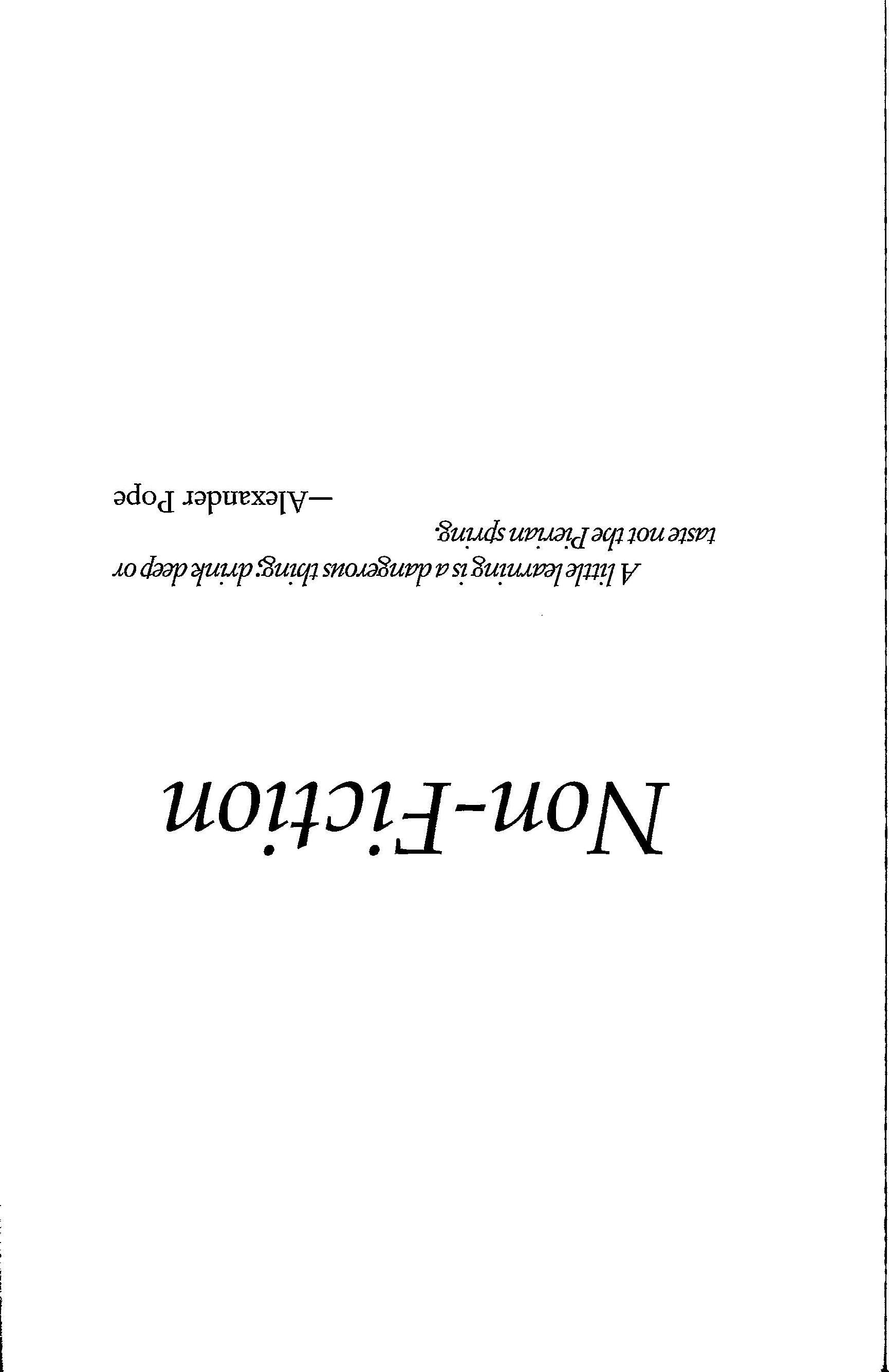
A little learning is a dangerous thing; drink deep or taste not the Pierian spring.
-Alexander Pope
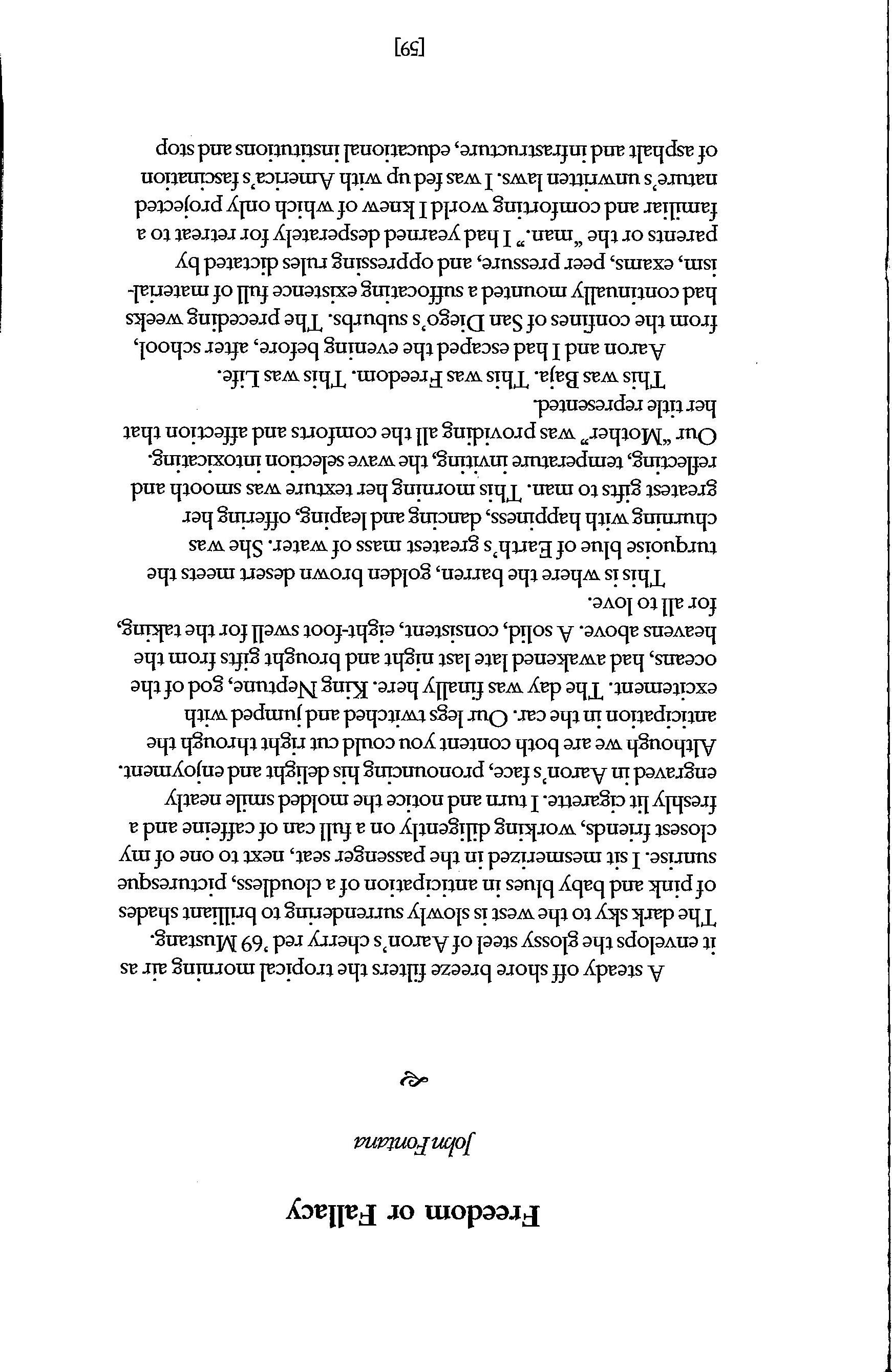
A steady off shore breeze filters the tropical morning air as it envelops the glossy steel of Aaron's cherry red '69 Mustang. The dark sky to the west is slowly surrendering to brilliant shades of pink and baby blues in anticipation of a cloudless, picturesque sunrise. I sit mesmerized in the passenger seat, next to one of my closest friends, working diligently on a full can of caffeine and a freshly lit cigarette. I turn and notice the molded smile neatly engraved in Aaron's face, pronouncing his delight and enjoyment. Although we are both content you could cut right through the anticipation in the car. Our legs twitched and jumped with excitement. The day was finally here. King Neptune, god of the oceans, had awakened late last night and brought gifts from the heavens above. A solid, consistent, eight-foot swell for the taking, for all to love.
This is where the barren, golden brown desert meets the turquoise blue of Earth's greatest mass of water. She was churning with happiness, dancing and leaping, offering her greatest gifts to man. This morning her texture was smooth and reflecting, temperature inviting, the wave selection intoxicating. Our "Mother" was providing all the comforts and affection that her title represented.
This was Baja. This was Freedom. This was Life.
Aaron and I had escaped the evening before, after school, from the confines of San Diego's suburbs. The preceding weeks had continually mounted a suffocating existence full of materialism, exams, peer pressure, and oppressing rules dictated by parents or the "man." I had yearned desperately for retreat to a familiar and comforting world I knew of which only projected nature's unwritten laws. I was fed up with America's fascination of asphalt and infrastructure, educational institutions and stop
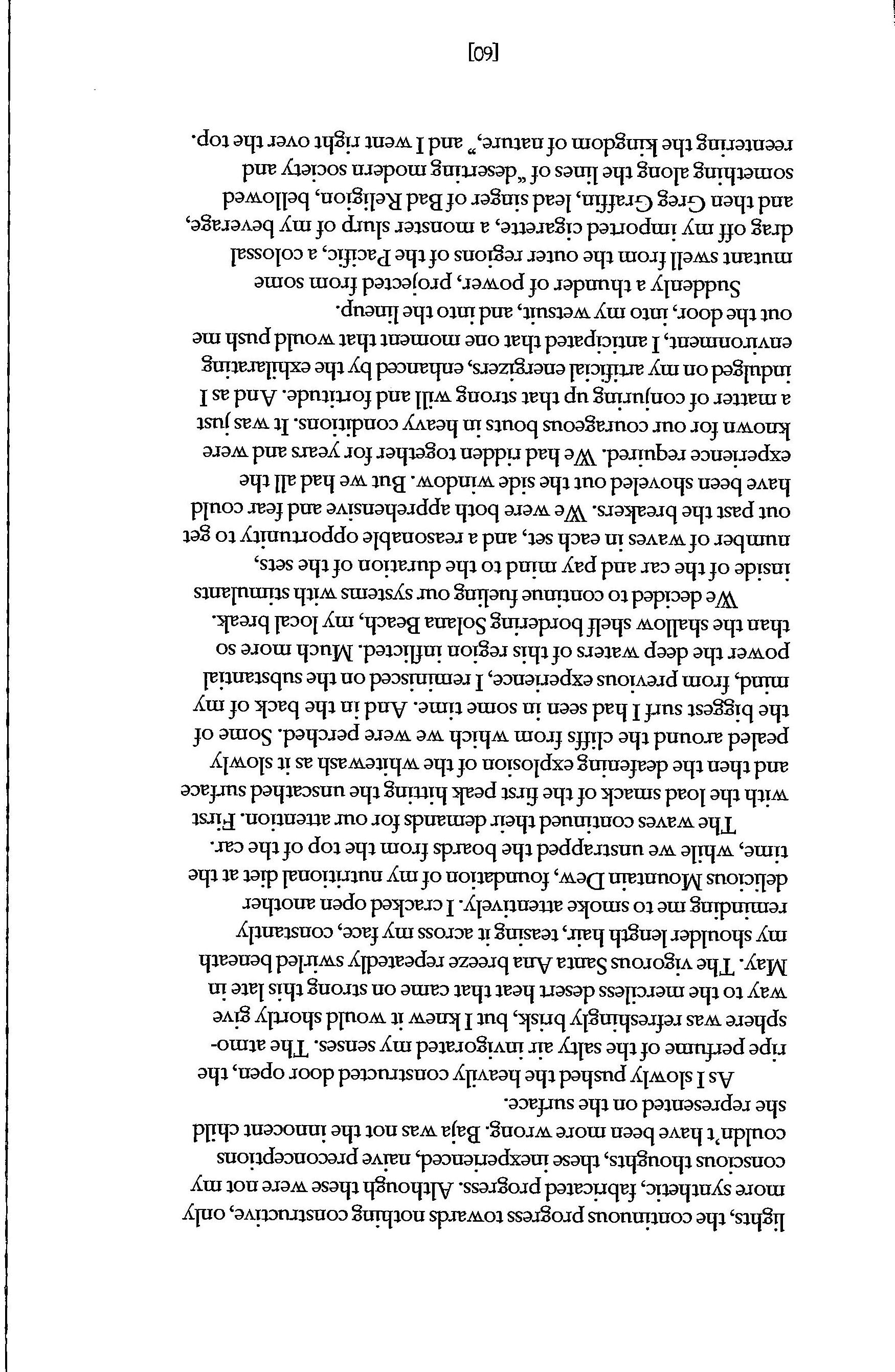
lights, the continuous progress towards nothing constructive, only more synthetic, fabricated progress. Although these were not my conscious thoughts, these inexperienced, naive preconceptions couldn't have been more wrong. Baja was not the innocent child she represented on the surface.
As I slowly pushed the heavily constructed door open, the ripe perfume of the salty air invigorated my senses. The atmosphere was refreshingly brisk, but I knew it would shortly give way to the merciless desert heat that came on strong this late in May. The vigorous Santa Ana breeze repeatedly swirled beneath my shoulder length hair, teasing it across my face, constantly reminding me to smoke attentively. I cracked open another delicious Mountain Dew, foundation of my nutritional diet at the time, while we unstrapped the boards from the top of the car.
The waves continued their demands for our attention. First with the load smack of the first peak hitting the unscathed surface and then the deafening explosion of the whitewash as it slowly pealed around the cliffs from which we were perched. Some of the biggest surf I had seen in some time. And in the back of my mind, from previous experience, I reminisced on the substantial power the deep waters of this region inflicted. Much more so than the shallow shelf bordering Solana Beach, my local break.
We decided to continue fueling our systems with stimulants inside of the car and pay mind to the duration of the sets, number of waves in each set, and a reasonable opportunity to get out past the breakers. We were both apprehensive and fear could have been shoveled out the side window. But we had all the experience required. We had ridden together for years and were known for our courageous bouts in heavy conditions. It was just a matter of conjuring up that strong will and fortitude. And as I indulged on my artificial energizers, enhanced by the exhilarating environment, I anticipated that one moment that would push me out the door, into my wetsuit, and into the lineup.
Suddenly a thunder of power, projected from some mutant swell from the outer regions of the Pacific, a colossal drag off my imported cigarette, a monster slurp of my beverage, and then Greg Graffin, lead singer of Bad Religion, bellowed something along the lines of "deserting modern society and reentering the kingdom of nature," and I went right over the top.
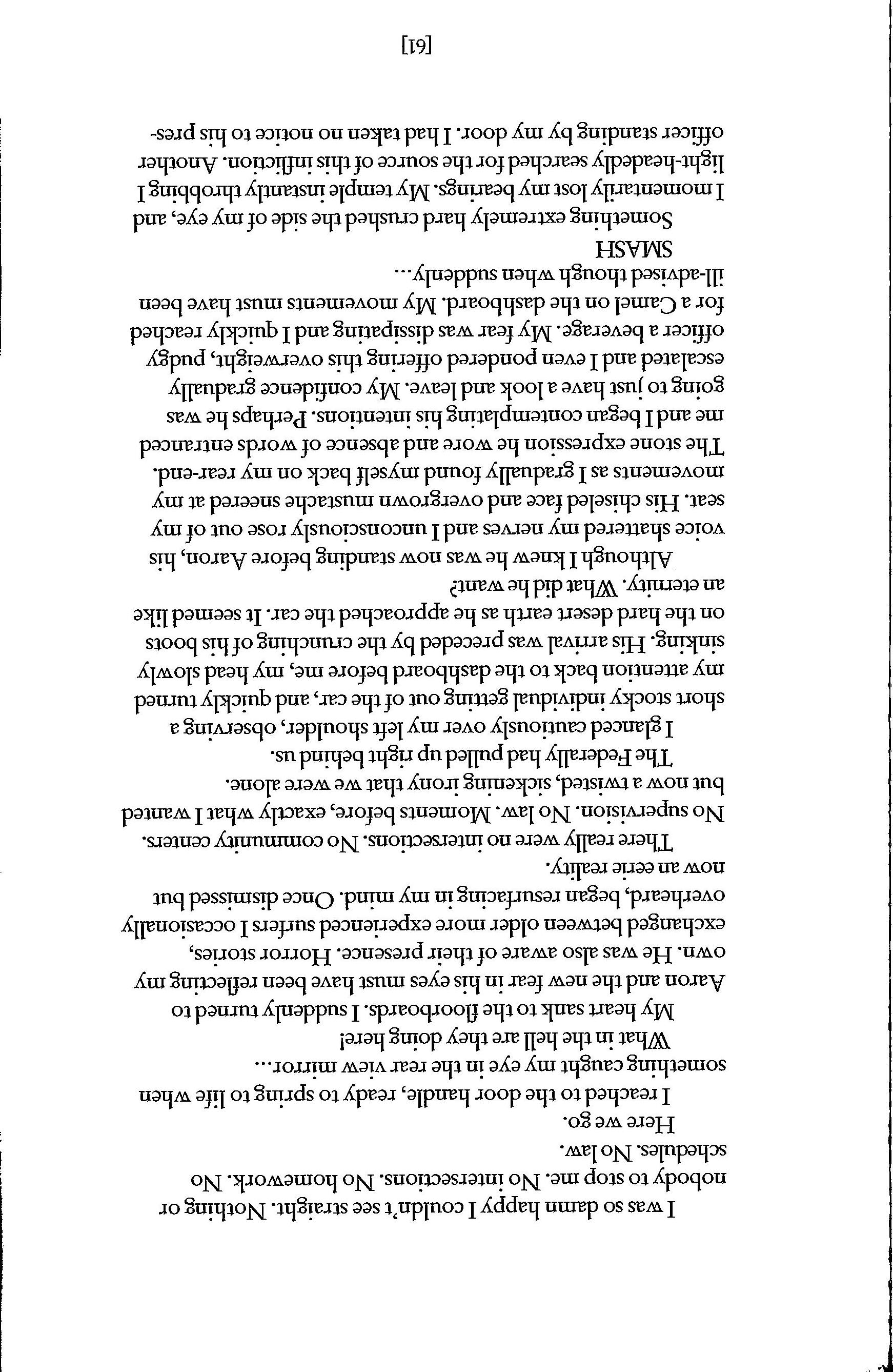
I was so damn happy I couldn't see straight. Nothing or nobody to stop me. No intersections. No homework. No schedules. No law. Here we go.
I reached to the door handle, ready to spring to life when something caught my eye in the rear view mirror What in the hell are they doing here!
My heart sank to the floorboards. I suddenly turned to Aaron and the new fear in his eyes must have been reflecting my own. He was also aware of their presence. Horror stories, exchanged between older more experienced surfers I occasionally overheard, began resurfacing in my mind. Once dismissed but now an eerie reality.
There really were no intersections. No community centers. No supervision. No law. Moments before, exactly what I wanted but now a twisted, sickening irony that we were alone.
The Federally had pulled up right behind us.
I glanced cautiously over my left shoulder, observing a short stocky individual getting out of the car, and quickly turned my attention back to the dashboard before me, my head slowly sinking. His arrival was preceded by the crunching of his boots on the hard desert earth as he approached the car. It seemed like an eternity. What did he want?
Although I knew he was now standing before Aaron, his voice shattered my nerves and I unconsciously rose out of my seat. His chiseled face and overgrown mustache sneered at my movements as I gradually found myself back on my rear-end. The stone expression he wore and absence of words entranced me and I began contemplating his intentions. Perhaps he was going to just have a look and leave. My confidence gradually escalated and I even pondered offering this overweight, pudgy officer a beverage. My fear was dissipating and I quickly reached for a Camel on the dashboard. My movements must have been ill-advised though when suddenly ...
Something extremely hard crushed the side of my eye, and I momentarily lost my bearings. My temple instantly throbbing I light-headedly searched for the source of this infliction. Another officer standing by my door. I had taken no notice to his pres-
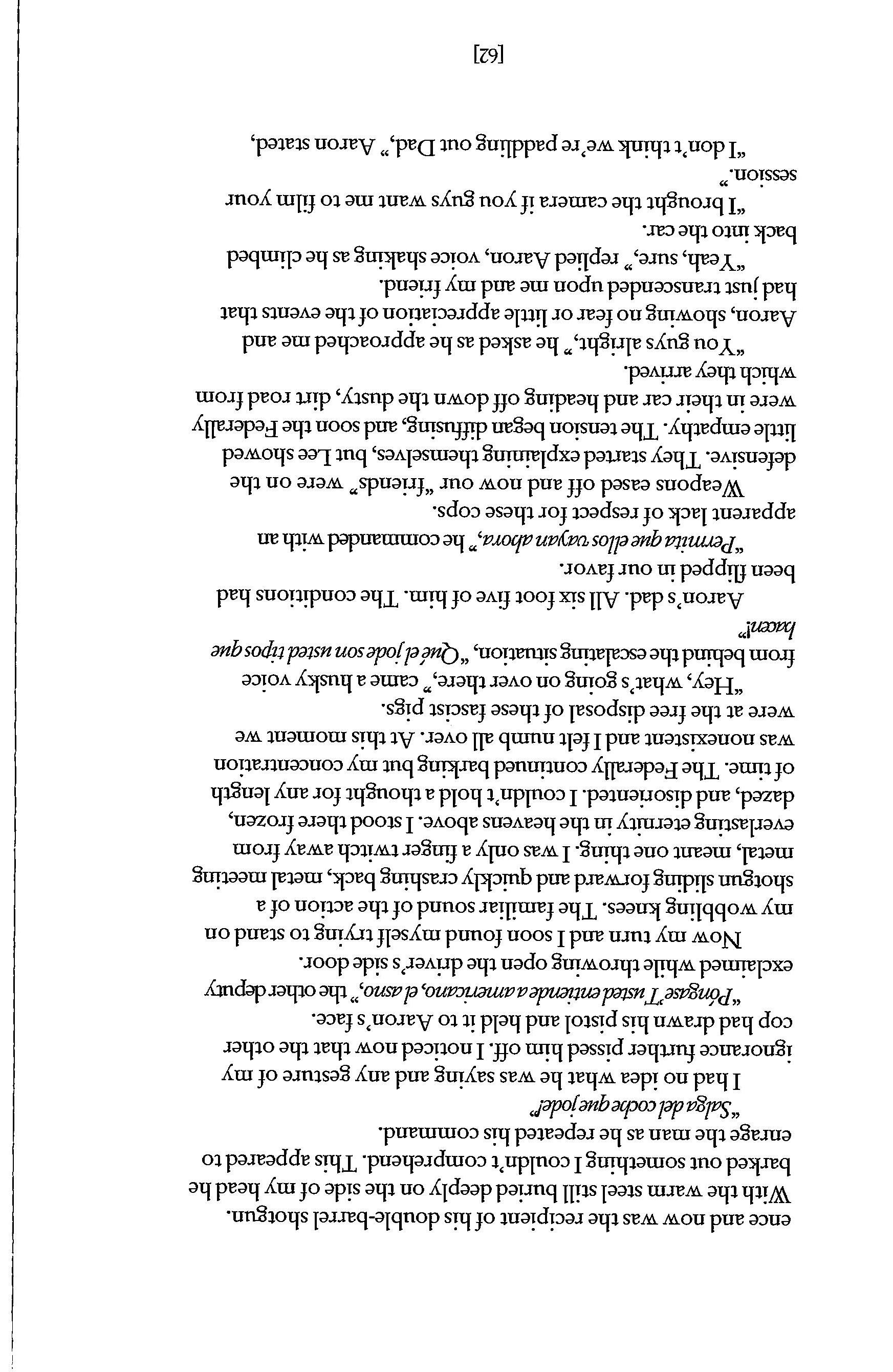
ence and now was the recipient of his double-barrel shotgun. With the warm steel still buried deeply on the side of my head he barked out something I couldn't comprehend. This appeared to enrage the man as he repeated his command.
"Sa/,gadd codJe quejade!'
I had no idea what he was saying and any gesture of my ignorance further pissed him off. I noticed now that the other cop had drawn his pistol and held it to Aaron's face.
"P6ngaseTustedentiende aameru:ano, d11Sno," the other deputy exclaimed while throwing open the driver's side door.
Now my turn and I soon found myself trying to stand on my wobbling knees. The familiar sound of the action of a shotgun sliding forward and quickly crashing back, metal meeting metal, meant one thing. I was only a finger twitch away from everlasting eternity in the heavens above. I stood there frozen, dazed, and disoriented. I couldn't hold a thought for any length of time. The Federally continued barking but my concentration was nonexistent and I felt numb all over. At this moment we were at the free disposal of these fascist pigs.
"Hey, what's going on over there," came a husky voice from behind the escalating situation, "Quee/, jode son usted tipos que hr:u:Enl"
Aaron's dad. All six foot five of him. The conditions had been flipped in our favor.
"Permita queellosvayanahora," he commanded with an apparent lack of respect for these cops.
Weapons eased off and now our "friends" were on the defensive. They started explaining themselves, but Lee showed little empathy. The tension began diffusing, and soon the Federally were in their car and heading off down the dusty, dirt road from which they arrived.
"You guys alright," he asked as he approached me and Aaron, showing no fear or little appreciation of the events that had just transcended upon me and my friend.
"Yeah, sure," replied Aaron, voice shaking as he climbed back into the car.
"I brought the camera if you guys want me to film your session."
"I don't think we' re paddling out Dad," Aaron stated,
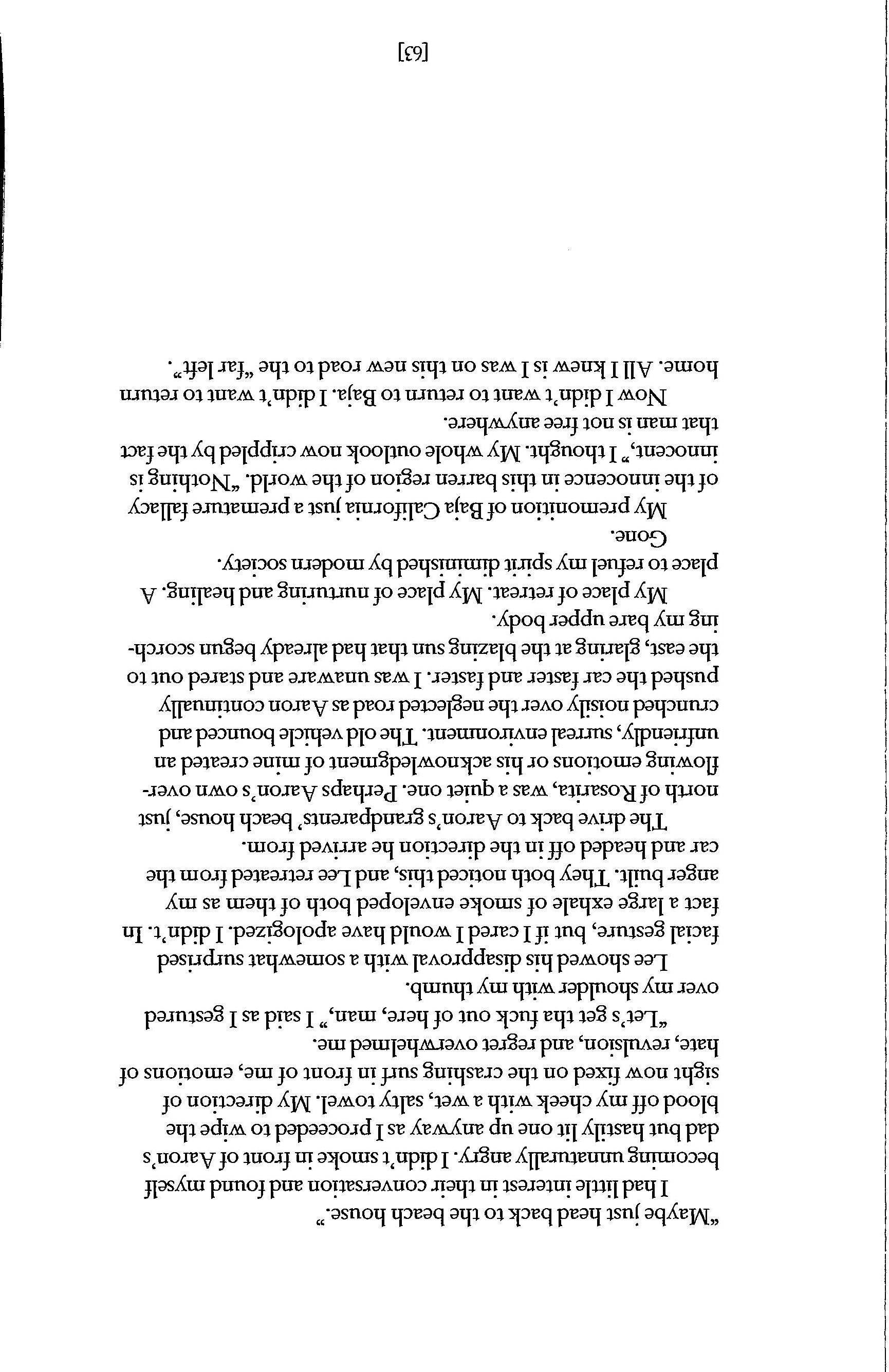
"Maybe just head back to the beach house."
I had little interest in their conversation and found myself becoming unnaturally angry. I didn't smoke in front of Aaron's dad but hastily lit one up anyway as I proceeded to wipe the blood off my cheek with a wet, salty towel. My direction of sight now fixed on the crashing surf in front of me, emotions of hate, revulsion, and regret overwhelmed me.
"Let's get tha fuck out of here, man," I said as I gestured over my shoulder with my thumb.
Lee showed his disapproval with a somewhat surprised facial gesture, but if I cared I would have apologized. I didn't. In fact a large exhale of smoke enveloped both of them as my anger built. They both noticed this, and Lee retreated from the car and headed off in the direction he arrived from.
The drive back to Aaron's grandparents' beach house, just north of Rosarita, was a quiet one. Perhaps Aaron's own overflowing emotions or his acknowledgment of mine created an unfriendly, surreal environment. The old vehicle bounced and crunched noisily over the neglected road as Aaron continually pushed the car faster and faster. I was unaware and stared out to the east, glaring at the blazing sun that had already begun scorching my bare upper body.
My place of retreat. My place of nurturing and healing. A place to refuel my spirit diminished by modern society. Gone.
My premonition of Baja California just a premature fallacy of the innocence in this barren region of the world. "Nothing is innocent," I thought. My whole outlook now crippled by the fact that man is not free anywhere.
Now I didn't want to return to Baja. I didn't want to return home. All I knew is I was on this new road to the "far left".
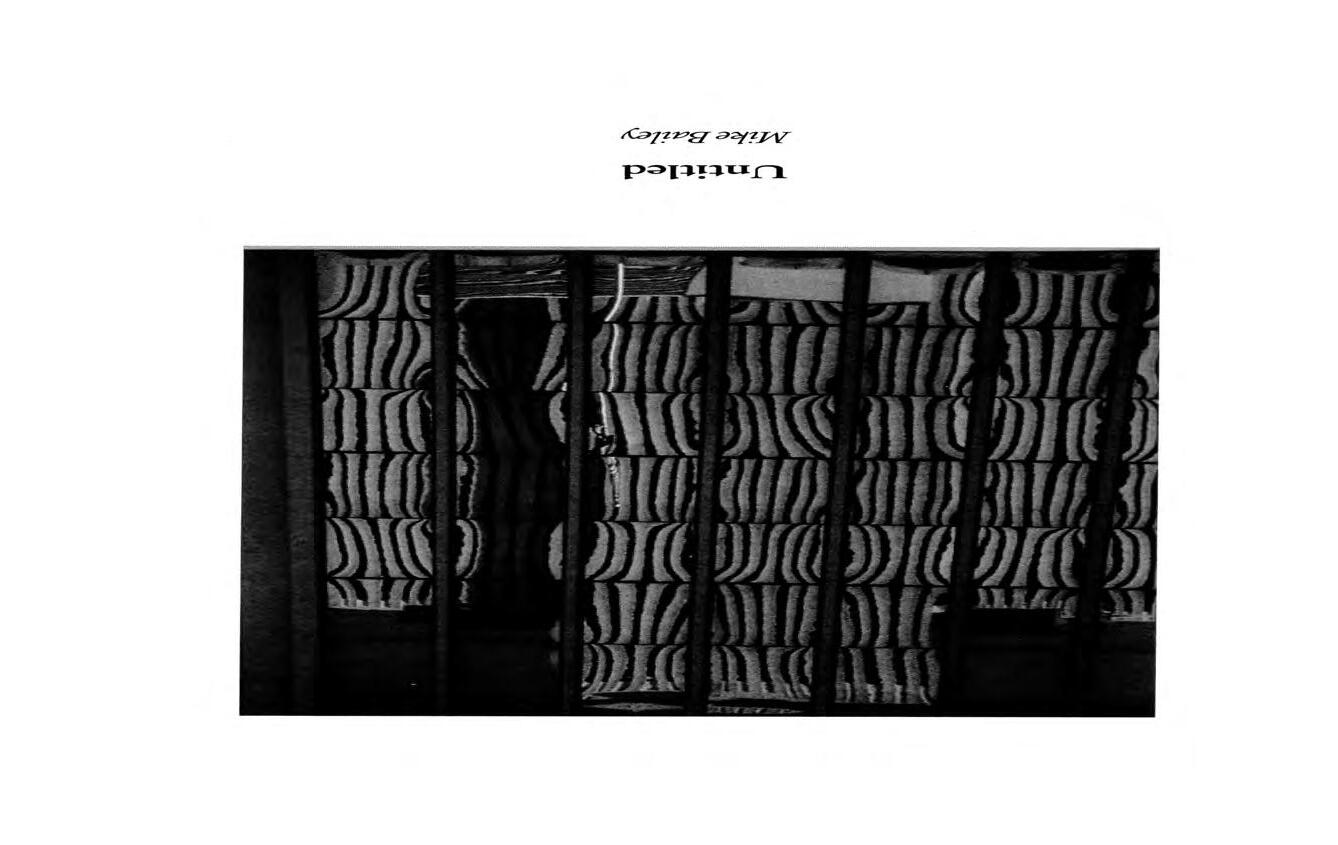
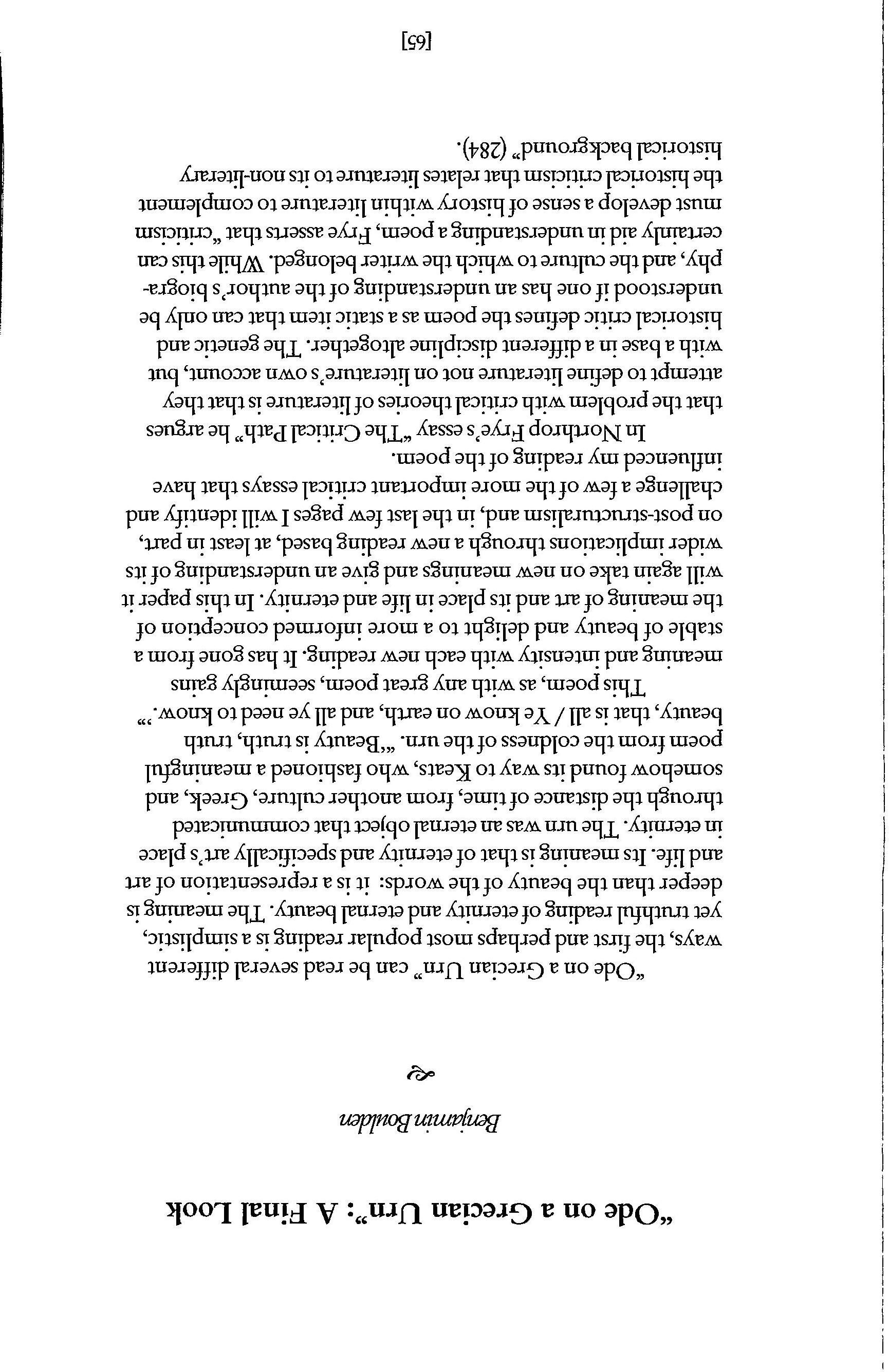
"Ode on a Grecian Urn" can be read several different ways, the first and perhaps most popular reading is a simplistic, yet truthful reading of eternity and eternal beauty. The meaning is deeper than the beauty of the words: it is a representation of art and life. Its meaning is that of eternity and specifically art's place in eternity. The urn was an eternal object that communicated through the distance of time, from another culture, Greek, and somehow found its way to Keats, who fashioned a meaningful poem from the coldness of the urn. "'Beauty is truth, truth beauty, that is all/Ye know on earth, and all ye need to know."'
This poem, as with any great poem, seemingly gains meaning and intensity with each new reading. It has gone from a stable of beauty and delight to a more informed conception of the meaning of art and its place in life and eternity. In this paper it will again take on new meanings and give an understanding of its wider implications through a new reading based, at least in part, on post-structuralism and, in the last few pages I will identify and challenge a few of the more important critical essays that have influenced my reading of the poem.
In Northrop Frye's essay "The Critical Path" he argues that the problem with critical theories of literature is that they attempt to define literature not on literature's own account, but with a base in a different discipline altogether. The genetic and historical critic defines the poem as a static item that can only be understood if one has an understanding of the author's biography, and the culture to which the writer belonged. While this can certainly aid in understanding a poem, Frye asserts that "criticism must develop a sense of history within literature to complement the historical criticism that relates literature to its non-literary historical background" (284).
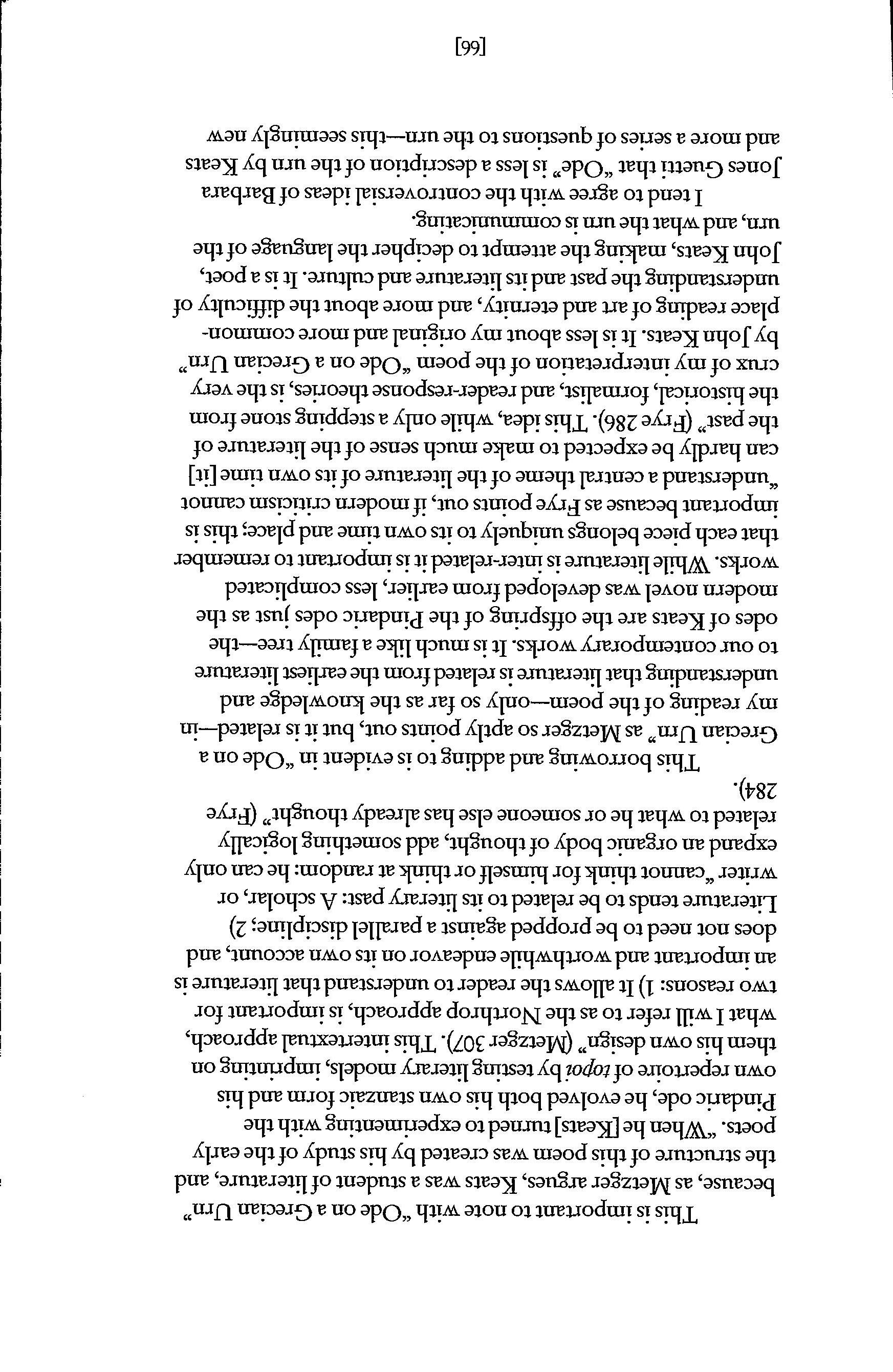
This is important to note with "Ode on a Grecian Urn" because, as Metzger argues, Keats was a student of literature, and the structure of this poem was created by his study of the early poets. "When he [Keats] turned to experimenting with the Pindaric ode, he evolved both his own stanzaic form and his own repertoire of tapoi by testing literary models, imprinting on them his own design" (Metzger 307). This intertextual approach, what I will refer to as the Northrop approach, is important for two reasons:
1) It allows the reader to understand that literature is an important and worthwhile endeavor on its own account, and does not need to be propped against a parallel discipline; 2) Literature tends to be related to its literary past: A scholar, or writer "cannot think for himself or think at random: he can only expand an organic body of thought, add something logically related to what he or someone else has already thought" (Frye 284).
This borrowing and adding to is evident in "Ode on a Grecian Urn" as Metzger so aptly points out, but it is related-in my reading of the poem-only so far as the knowledge and understanding that literature is related from the earliest literature to our contemporary works. It is much like a family tree-the odes of Keats are the offspring of the Pindaric odes just as the modern novel was developed from earlier, less complicated works. While literature is inter-related it is important to remember that each piece belongs uniquely to its own time and place; this is important because as Frye points out, if modem criticism cannot "understand a central theme of the literature of its own time [it] can hardly be expected to make much sense of the literature of the past" (Frye 286). This idea, while only a stepping stone from the historical, formalist, and reader-response theories, is the very crux of my interpretation of the poem "Ode on a Grecian Urn" by John Keats. It is less about my original and more commonplace reading of art and eternity, and more about the difficulty of understanding the past and its literature and culture. It is a poet, John Keats, making the attempt to decipher the language of the urn, and what the urn is communicating.
I tend to agree with the controversial ideas of Barbara Jones Guetti that "Ode" is less a description of the urn by Keats and more a series of questions to the urn-this seemingly new
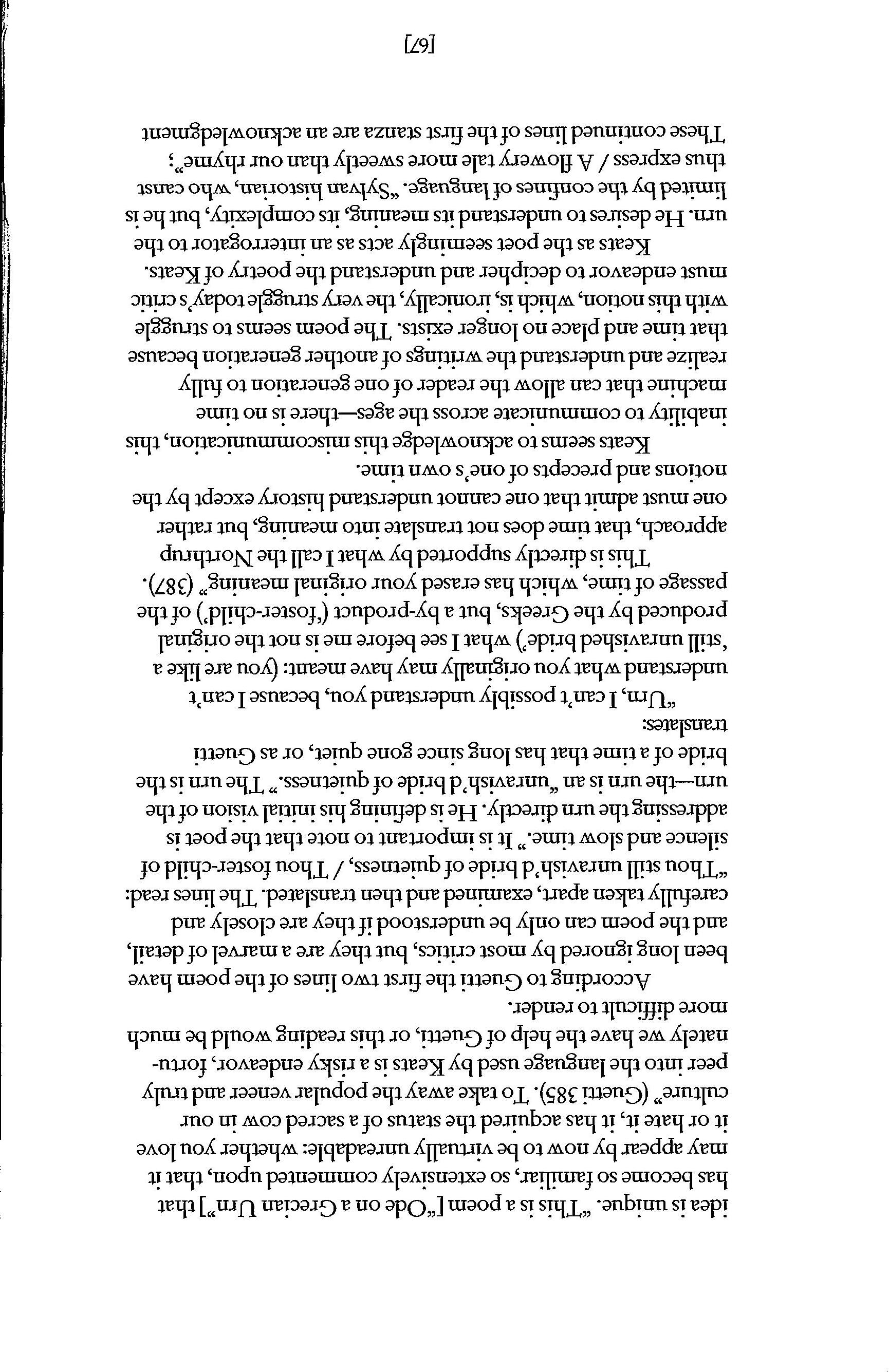
idea is unique. "This is a poem ["Ode on a Grecian Urn"] that has become so familiar, so extensively commented upon, that it may appear by now to be virtually unreadable: whether you love it or hate it, it has acquired the status of a sacred cow in our culture" (Guetti 385). To take away the popular veneer and truly peer into the language used by Keats is a risky endeavor, fortunately we have the help of Guetti, or this reading would be much more difficult to render.
According to Guetti the first two lines of the poem have been long ignored by most critics, but they are a marvel of detail, and the poem can only be understood if they are closely and carefully taken apart, examined and then translated. The lines read: "Thou still unravish' d bride of quietness,/ Thou foster-child of silence and slow time." It is important to note that the poet is addressing the urn directly. He is defining his initial vision of the urn-the urn is an "unravish' d bride of quietness." The urn is the bride of a time that has long since gone quiet, or as Guetti translates:
"Urn, I can't possibly understand you, because I can't understand what you originally may have meant: (you are like a 'still unravished bride') what I see before me is not the original produced by the Greeks, but a by-product ('foster-child'} of the passage of time, which has erased your original meaning" (387).
This is directly supported by what I call the Northrup approach, that time does not translate into meaning, but rather one must admit that one cannot understand history except by the notions and precepts of one's own time.
Keats seems to acknowledge this miscommunication, this inability to communicate across the ages-there is no time machine that can allow the reader of one generation to fully realize and understand the writings of another generation because that time and place no longer exists. The poem seems to struggle with this notion, which is, ironically, the very struggle today's critic must endeavor to decipher and understand the poetry of Keats.
Keats as the poet seemingly acts as an interrogator to the urn. He desires to understand its meaning, its complexity, but he is limited by the confines of language. "Sylvan historian, who canst thus express/ A flowery tale more sweetly than our rhyme"; These continued lines of the first stanza are an acknowledgment
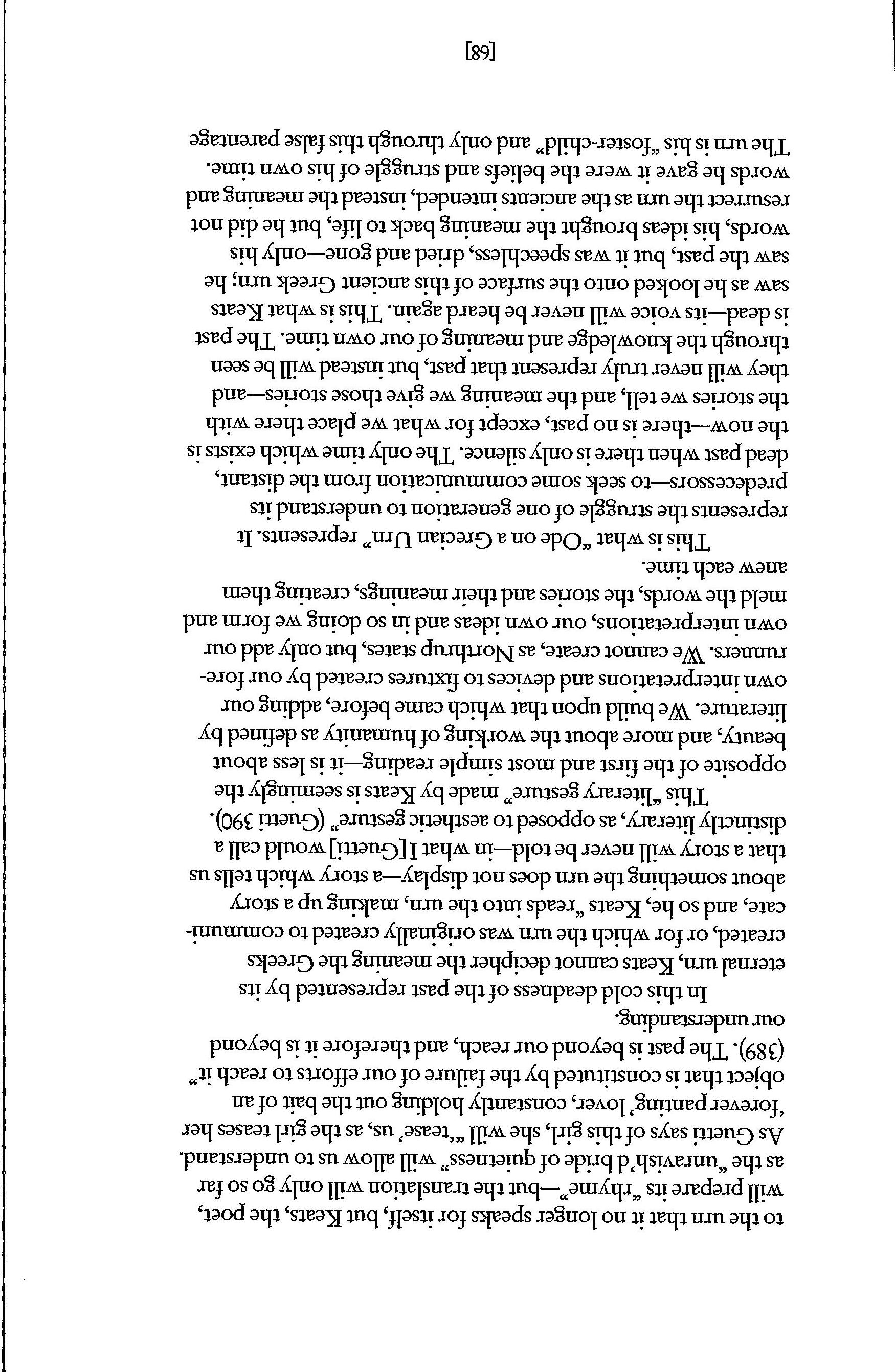
to the urn that it no longer speaks for itself, but Keats, the poet, will prepare its "rhyme"-but the translation will only go so far as the "unravish' d bride of quietness" will allow us to understand. As Guetti says of this girl, she will '"tease' us, as the girl teases her 'forever panting' lover, constantly holding out the bait of an object that is constituted by the failure of our efforts to reach it" (389). The past is beyond our reach, and therefore it is beyond our understanding.
In this cold deadness of the past represented by its eternal urn, Keats cannot decipher the meaning the Greeks created, or for which the urn was originally created to communicate, and so he, Keats "reads into the urn, making up a story about something the urn does not display-a story which tells us that a story will never be told-in what I [Guetti] would call a distinctly literary, as opposed to aesthetic gesture" (Guetti 390).
This "literary gesture" made by Keats is seemingly the opposite of the first and most simple reading-it is less about beauty, and more about the working of humanity as defined by literature. We build upon that which came before, adding our own interpretations and devices to fixtures created by our forerunners. We cannot create, as Northrup states, but only add our own interpretations, our own ideas and in so doing we form and meld the words, the stories and their meanings, creating them anew each time.
This is what "Ode on a Grecian Urn" represents. It represents the struggle of one generation to understand its predecessors-to seek some communication from the distant, dead past when there is only silence. The only time which exists is the now-there is no past, except for what we place there with the stories we tell, and the meaning we give those stories-and they will never truly represent that past, but instead will be seen through the knowledge and meaning of our own time. The past is dead-its voice will never be heard again. This is what Keats saw as he looked onto the surface of this ancient Greek urn; he saw the past, but it was speechless, dried and gone-only his words, his ideas brought the meaning back to life, but he did not resurrect the urn as the ancients intended, instead the meaning and words he gave it were the beliefs and struggle of his own time. The urn is his "foster-child" and only through this false parentage
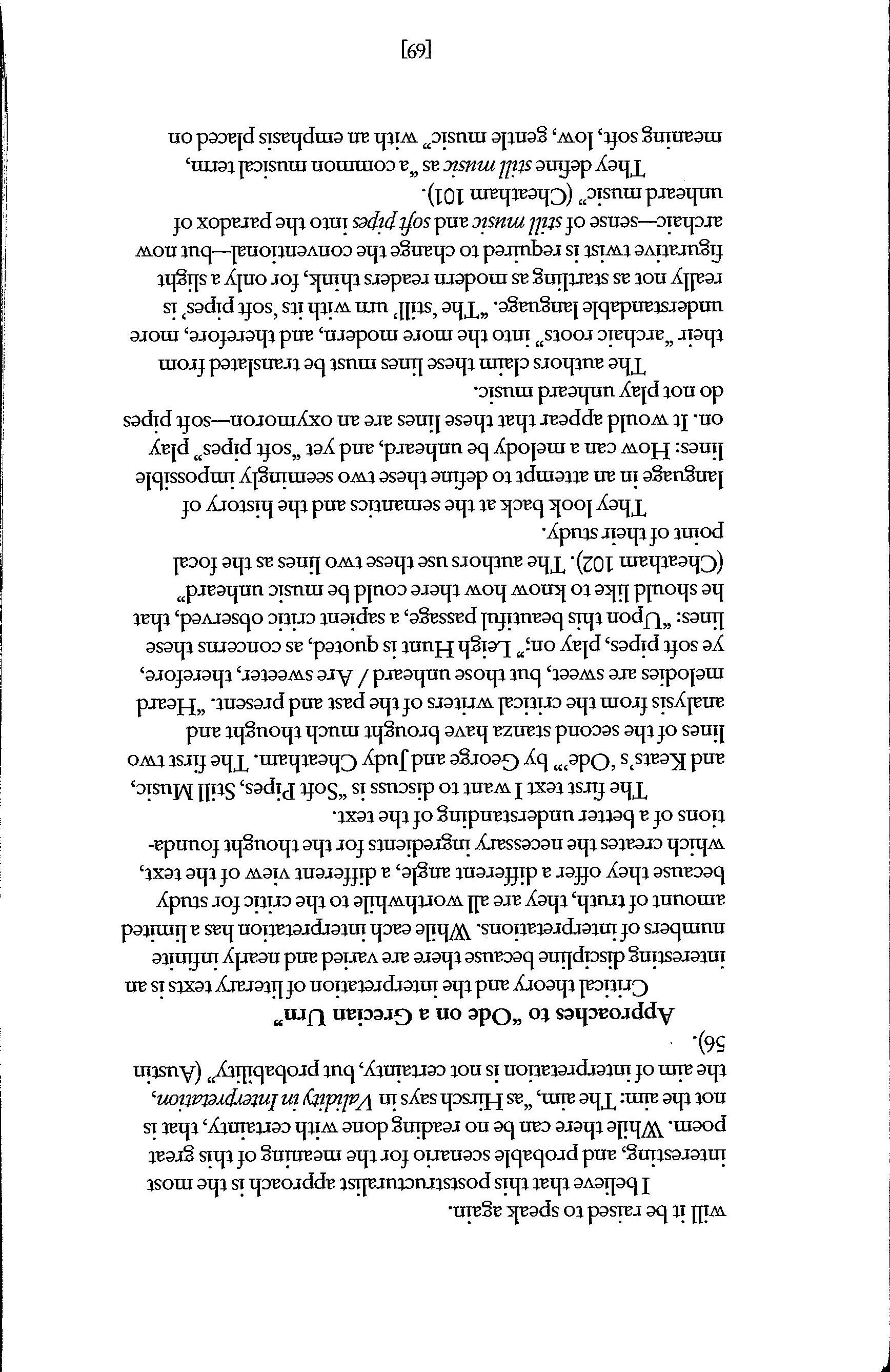
will it be raised to speak again.
I believe that this poststructuralist approach is the most interesting, and probable scenario for the meaning of this great poem. While there can be no reading done with certainty, that is not the aim: The aim, "as Hirsch says in Validity in Interpretation, the aim of interpretation is not certainty, but probability" (Austin 56).
Critical theory and the interpretation of literary texts is an interesting discipline because there are varied and nearly infinite numbers of interpretations. While each interpretation has a limited amount of truth, they are all worthwhile to the critic for study because they offer a different angle, a different view of the text, which creates the necessary ingredients for the thought foundations of a better understanding of the text.
The first text I want to discuss is "Soft Pipes, Still Music, and Keats's 'Ode"' by George and Judy Cheatham. The first two lines of the second stanza have brought much thought and analysis from the critical writers of the past and present. "Heard melodies are sweet, but those unheard/ Are sweeter, therefore, ye soft pipes, play on;" Leigh Hunt is quoted, as concerns these lines: "Upon this beautiful passage, a sapient critic observed, that he should like to know how there could be music unheard" (Cheatham 102). The authors use these two lines as the focal point of their study.
They look back at the semantics and the history of language in an attempt to define these two seemingly impossible lines: How can a melody be unheard, and yet "soft pipes" play on. It would appear that these lines are an oxymoron-soft pipes do not play unheard music.
The authors claim these lines must be translated from their "archaic roots" into the more modern, and therefore, more understandable language. "The 'still' urn with its 'soft pipes' is really not as startling as modern readers think, for only a slight figurative twist is required to change the conventional-but now archaic-sense of still music and soft pipes into the paradox of unheard music" (Cheatham 101).
They define still music as "a common musical term, meaning soft, low, gentle music" with an emphasis placed on
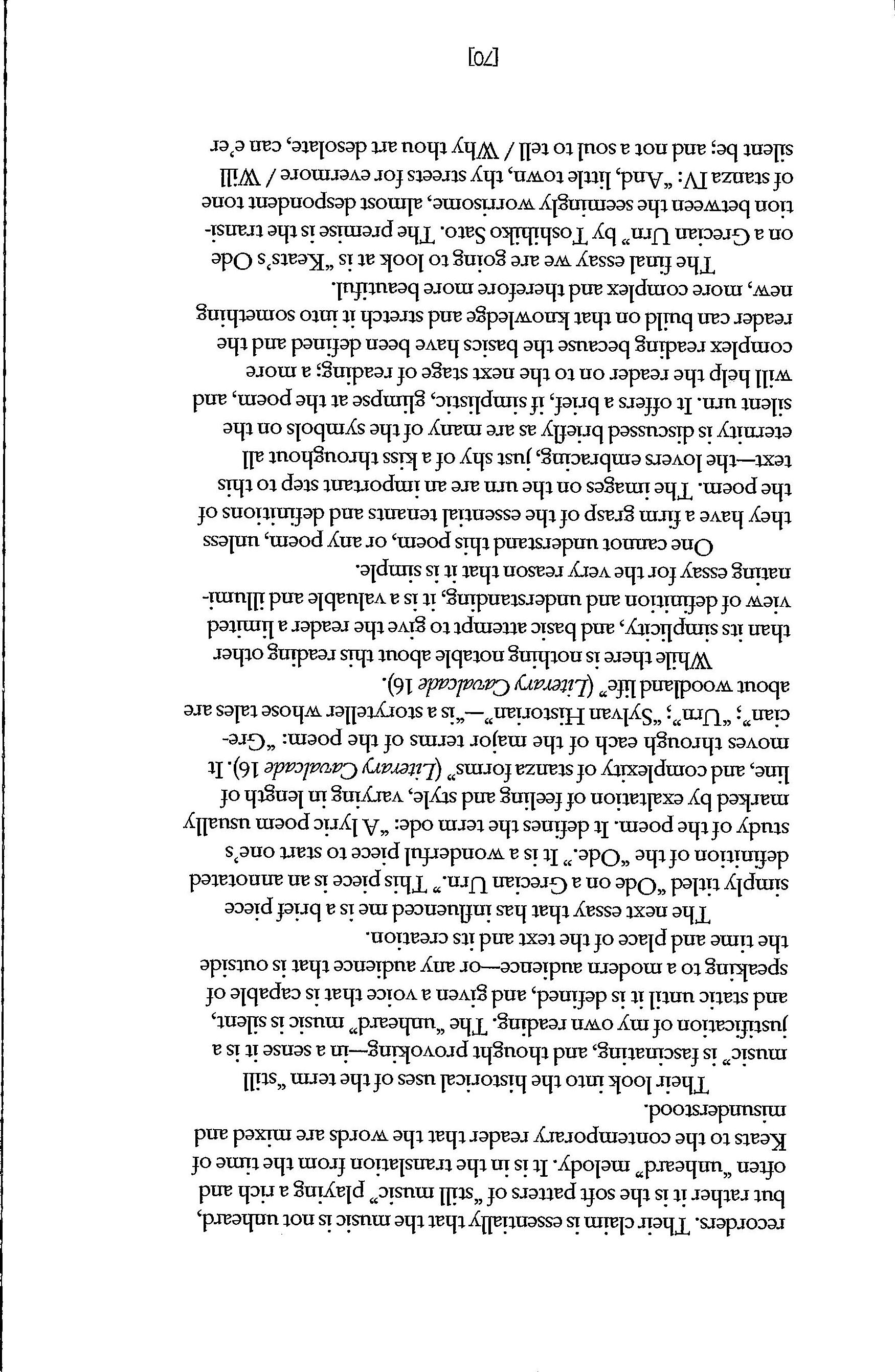
recorders. Their claim is essentially that the music is not unheard, but rather it is the soft patters of "still music" playing a rich and often "unheard" melody. It is in the translation from the time of Keats to the contemporary reader that the words are mixed and misunderstood.
Their look into the historical uses of the term "still music" is fascinating, and thought provoking-in a sense it is a justification of my own reading. The "unheard" music is silent, and static until it is defined, and given a voice that is capable of speaking to a modern audience-or any audience that is outside the time and place of the text and its creation.
The next essay that has influenced me is a brief piece simply titled "Ode on a Grecian Urn." This piece is an annotated definition of the "Ode." It is a wonderful piece to start one's study of the poem. It defines the term ode: "A lyric poem usually marked by exaltation of feeling and style, varying in length of line, and complexity of stanza forms" (Literary Cavalcade 16). It moves through each of the major terms of the poem: "Grecian"; "Urn"; "Sylvan Historian" -"is a storyteller whose tales are about woodland life" (Literary Cavalcade 16).
While there is nothing notable about this reading other than its simplicity, and basic attempt to give the reader a limited view of definition and understanding, it is a valuable and illuminating essay for the very reason that it is simple.
One cannot understand this poem, or any poem, unless they have a firm grasp of the essential tenants and definitions of the poem. The images on the urn are an important step to this text-the lovers embracing, just shy of a kiss throughout all eternity is discussed briefly as are many of the symbols on the silent urn. It offers a brief, if simplistic, glimpse at the poem, and will help the reader on to the next stage of reading; a more complex reading because the basics have been defined and the reader can build on that knowledge and stretch it into something new, more complex and therefore more beautiful.
The final essay we are going to look at is "Keats's Ode on a Grecian Urn" by T oshihiko Sato. The premise is the transition between the seemingly worrisome, almost despondent tone of stanza IV: "And, little town, thy streets for evermore/ Will silent be; and not a soul to tell/ Why thou art desolate, can e'er
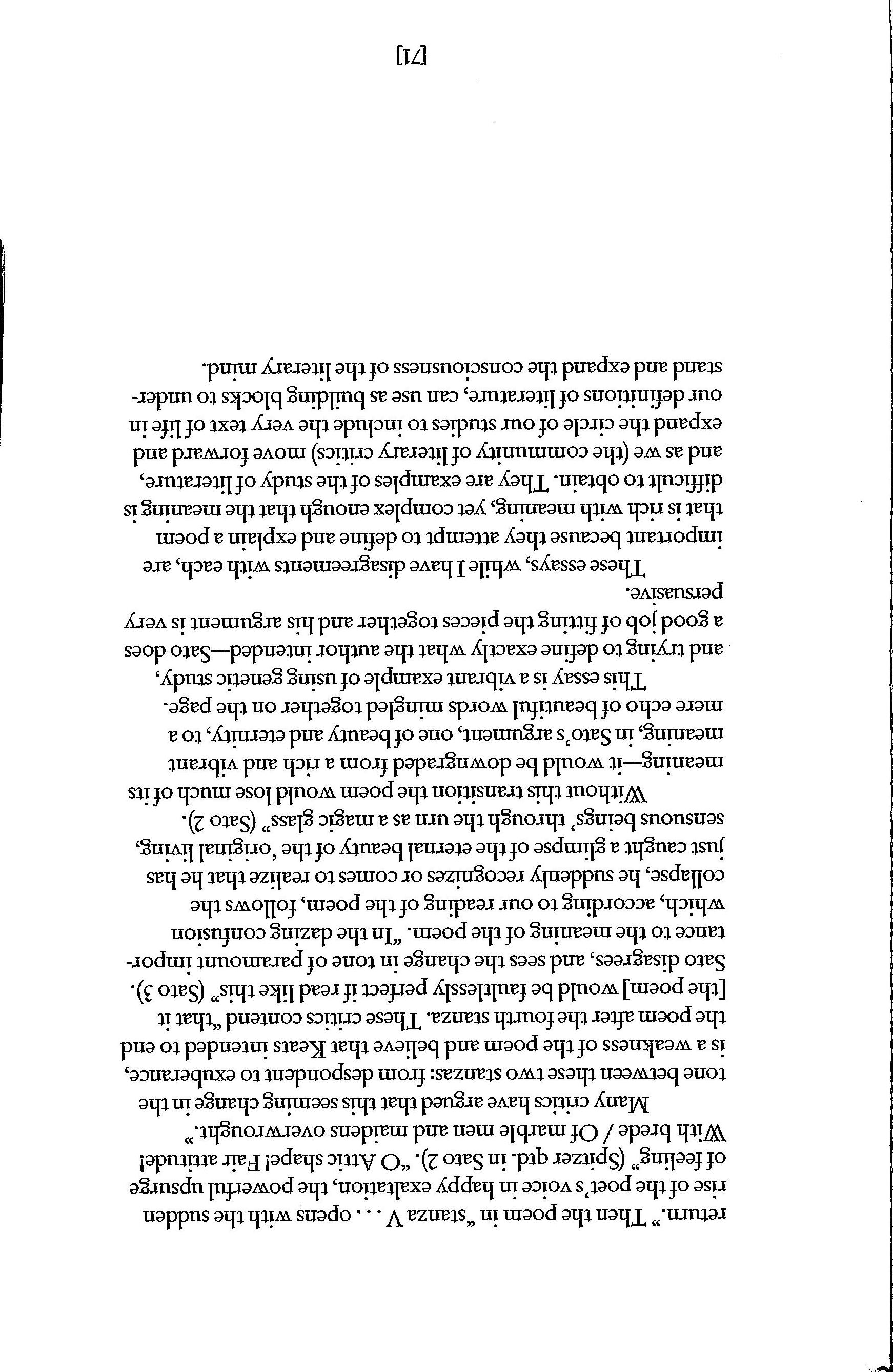
return." Then the poem in "stanza V ... opens with the sudden rise of the poet's voice in happy exaltation, the powerful upsurge of feeling" (Spitzer qtd. in Sato 2). "O Attic shape! Fair attitude! With brede I Of marble men and maidens overwrought."
Many critics have argued that this seeming change in the tone between these two stanzas: from despondent to exuberance, is a weakness of the poem and believe that Keats intended to end the poem after the fourth stanza. These critics contend "that it [the poem] would be faultlessly perfect if read like this" (Sato 3). Sato disagrees, and sees the change in tone of paramount importance to the meaning of the poem. "In the dazing confusion which, according to our reading of the poem, follows the collapse, he suddenly recognizes or comes to realize that he has just caught a glimpse of the eternal beauty of the 'original living, sensuous beings' through the urn as a magic glass" (Sato 2).
Without this transition the poem would lose much of its meaning-it would be downgraded from a rich and vibrant meaning, in Sato's argument, one of beauty and eternity, to a mere echo of beautiful words mingled together on the page.
This essay is a vibrant example of using genetic study, and trying to define exactly what the author intended-Sato does a good job of fitting the pieces together and his argument is very persuasive.
These essays, while I have disagreements with each, are important because they attempt to define and explain a poem that is rich with meaning, yet complex enough that the meaning is difficult to obtain. They are examples of the study of literature, and as we (the community ofliterary critics) move forward and expand the circle of our studies to include the very text of life in our definitions of literature, can use as building blocks to understand and expand the consciousness of the literary mind.
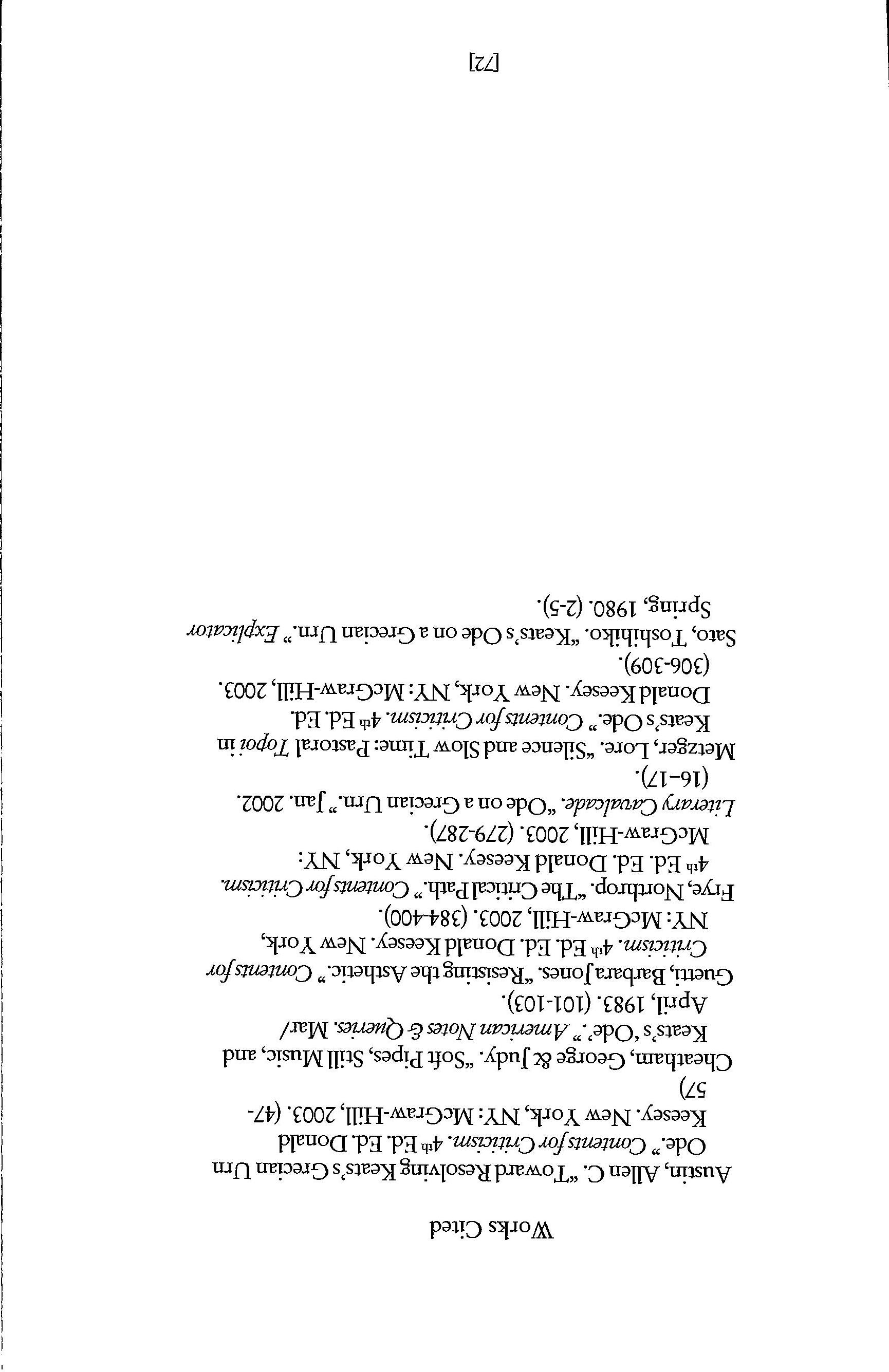
Works Cited
Austin, Allen C. "Toward Resolving Keats's Grecian Urn Ode." Contents for Criticism. 4th Ed. Ed. Donald Keesey. New York, NY: McGraw-Hill, 2003. (4757)
Cheatham, George & Judy. "Soft Pipes, Still Music, and Keats's 'Ode'." AmericanNotes&Queries. Marl April, 1983. (101-103).
Guetti, Barbara Jones. "Resisting the Asthetic." Contents for Criticism. 4th Ed. Ed. Donald Keesey. New York, NY: McGraw-Hill, 2003. (384-400).
Frye, Northrop. "The Critical Path." Contentsfor Criticism 4th Ed. Ed. Donald Keesey. New York, NY: McGraw-Hill, 2003. (279-287).
Literary Cavalcade. "Ode on a Grecian Urn." Jan. 2002. (16-17).
Metzger, Lore. "Silence and Slow Time: Pastoral Topoi in Keats's Ode." Contents for Criticism. 4th Ed. Ed. Donald Keesey. New York, NY: McGraw-Hill, 2003. (306-309).
Sato, Toshihiko. "Keats's Ode on a Grecian Urn." Explicator Spring, 1980. (2-5).
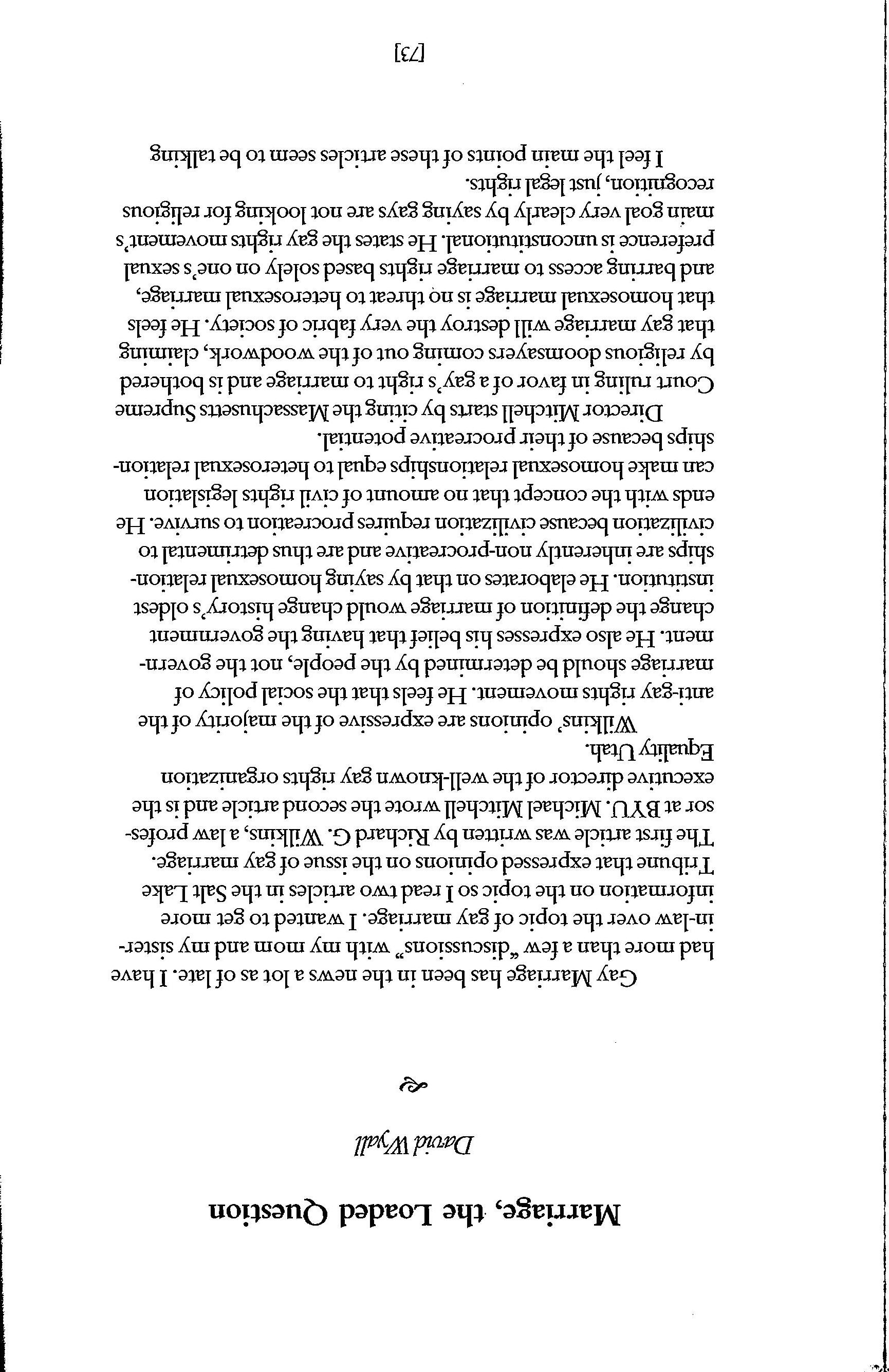
Gay Marriage has been in the news a lot as of late. I have had more than a few "discussions" with my mom and my sisterin-law over the topic of gay marriage. I wanted to get more information on the topic so I read two articles in the Salt Lake Tribune that expressed opinions on the issue of gay marriage. The first article was written by Richard G. Wilkins, a law professor at BYU. Michael Mitchell wrote the second article and is the executive director of the well-known gay rights organization Equality Utah.
Wilkins' opinions are expressive of the majority of the anti-gay rights movement. He feels that the social policy of marriage should be determined by the people, not the government. He also expresses his belief that having the government change the definition of marriage would change history's oldest institution. He elaborates on that by saying homosexual relationships are inherently non-procreative and are thus detrimental to civilization because civilization requires procreation to survive. He ends with the concept that no amount of civil rights legislation can make homosexual relationships equal to heterosexual relationships because of their procreative potential.
Director Mitchell starts by citing the Massachusetts Supreme Court ruling in favor of a gay' s right to marriage and is bothered by religious doomsayers coming out of the woodwork, claiming that gay marriage will destroy the very fabric of society. He feels that homosexual marriage is no threat to heterosexual marriage, and barring access to marriage rights based solely on one's sexual preference is unconstitutional. He states the gay rights movement's main goal very clearly by saying gays are not looking for religious recognition, just legal rights.
I feel the main points of these articles seem to be talking
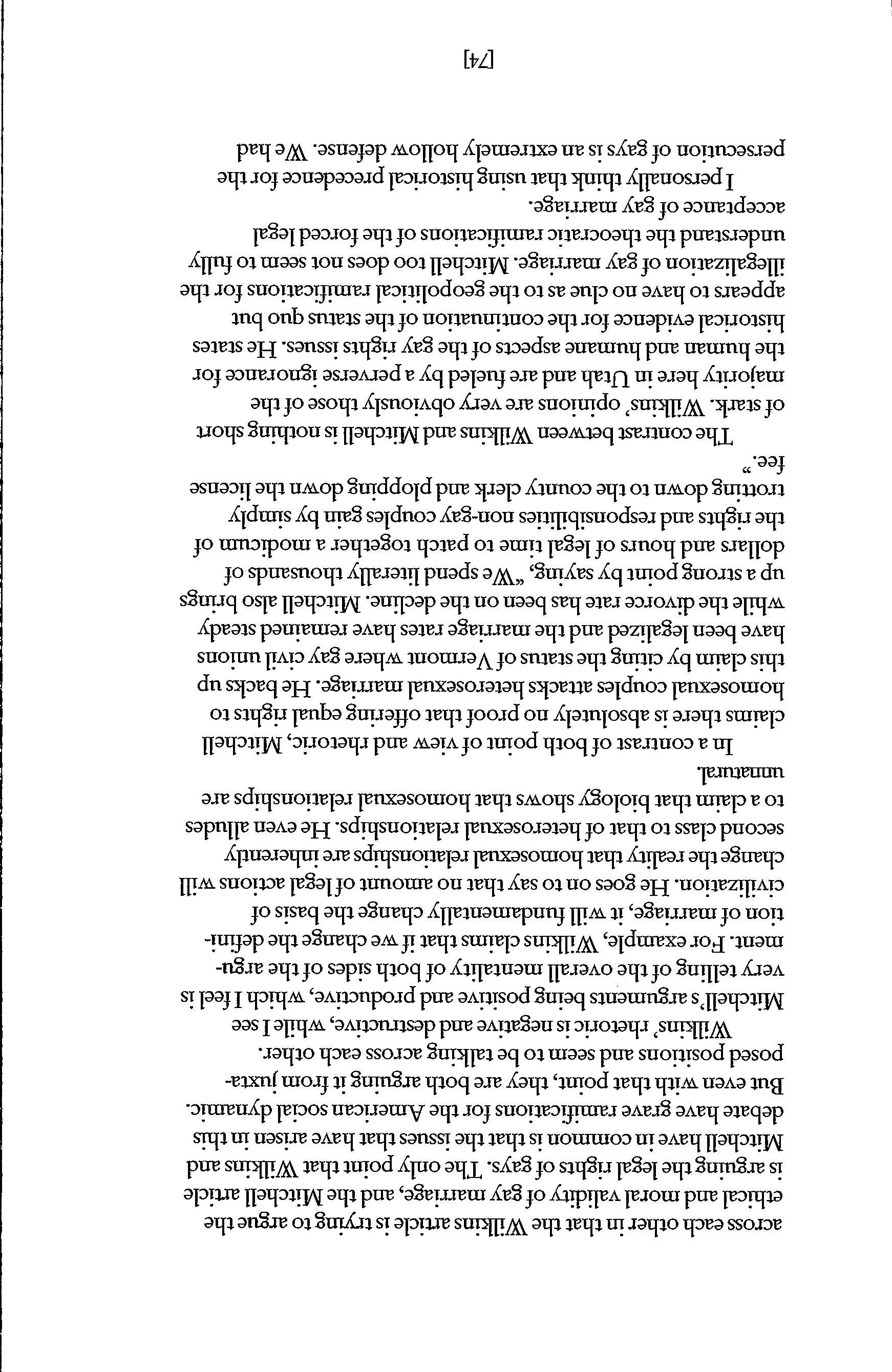
across each other in that the Wilkins article is trying to argue the ethical and moral validity of gay marriage, and the Mitchell article is arguing the legal rights of gays. The only point that Wilkins and Mitchell have in common is that the issues that have arisen in this debate have grave ramifications for the American social dynamic. But even with that point, they are both arguing it from juxtaposed positions and seem to be talking across each other.
Wilkins' rhetoric is negative and destructive, while I see Mitchell's arguments being positive and productive, which I feel is very telling of the overall mentality of both sides of the argument. For example, Wilkins claims that if we change the definition of marriage, it will fundamentally change the basis of civilization. He goes on to say that no amount of legal actions will change the reality that homosexual relationships are inherently second class to that of heterosexual relationships. He even alludes to a claim that biology shows that homosexual relationships are unnatural.
In a contrast of both point of view and rhetoric, Mitchell claims there is absolutely no proof that offering equal rights to homosexual couples attacks heterosexual marriage. He backs up this claim by citing the status of Vermont where gay civil unions have been legalized and the marriage rates have remained steady while the divorce rate has been on the decline. Mitchell also brings up a strong point by saying, "We spend literally thousands of dollars and hours of legal time to patch together a modicum of the rights and responsibilities non-gay couples gain by simply trotting down to the county clerk and plopping down the license fee."
The contrast between Wilkins and Mitchell is nothing short of stark. Wilkins' opinions are very obviously those of the majority here in Utah and are fueled by a perverse ignorance for the human and humane aspects of the gay rights issues. He states historical evidence for the continuation of the status quo but appears to have no clue as to the geopolitical ramifications for the illegalization of gay marriage. Mitchell too does not seem to fully understand the theocratic ramifications of the forced legal acceptance of gay marriage.
I personally think that using historical precedence for the persecution of gays is an extremely hollow defense. We had
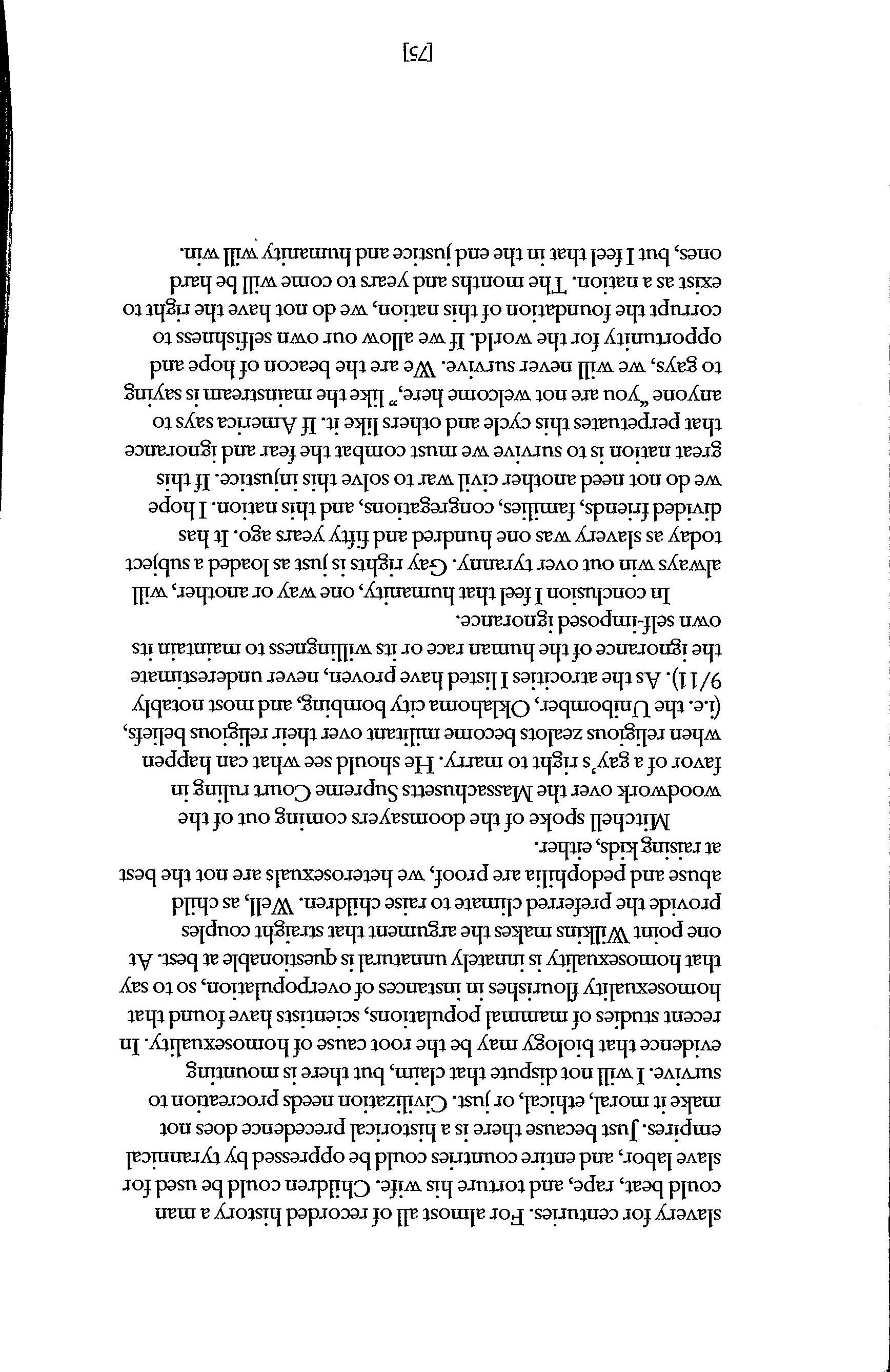
slavery for centuries. For almost all of recorded history a man could beat, rape, and torture his wife. Children could be used for slave labor, and entire countries could be oppressed by tyrannical empires. Just because there is a historical precedence does not make it moral, ethical, or just. Civilization needs procreation to survive. I will not dispute that claim, but there is mounting evidence that biology may be the root cause of homosexuality. In recent studies of mammal populations, scientists have found that homosexuality flourishes in instances of overpopulation, so to say that homosexuality is innately unnatural is questionable at best. At one point Wilkins makes the argument that straight couples provide the preferred climate to raise children. Well, as child abuse and pedophilia are proof, we heterosexuals are not the best at raising kids, either.
Mitchell spoke of the doomsayers coming out of the woodwork over the Massachusetts Supreme Court ruling in favor of a gay's right to marry. He should see what can happen when religious zealots become militant over their religious beliefs, (i.e. the Unibomber, Oklahoma city bombing, and most notably 9I 11). As the atrocities I listed have proven, never underestimate the ignorance of the human race or its willingness to maintain its own self-imposed ignorance.
In conclusion I feel that humanity, one way or another, will always win out over tyranny. Gay rights is just as loaded a subject today as slavery was one hundred and fifty years ago. It has divided friends, families, congregations, and this nation. I hope we do not need another civil war to solve this injustice. If this great nation is to survive we must combat the fear and ignorance that perpetuates this cycle and others like it. If America says to anyone "you are not welcome here," like the mainstream is saying to gays, we will never survive. We are the beacon of hope and opportunity for the world. If we allow our own selfishness to corrupt the foundation of this nation, we do not have the right to exist as a nation. The months and years to come will be hard ones, but I feel that in the end justice and humanity yvill win.
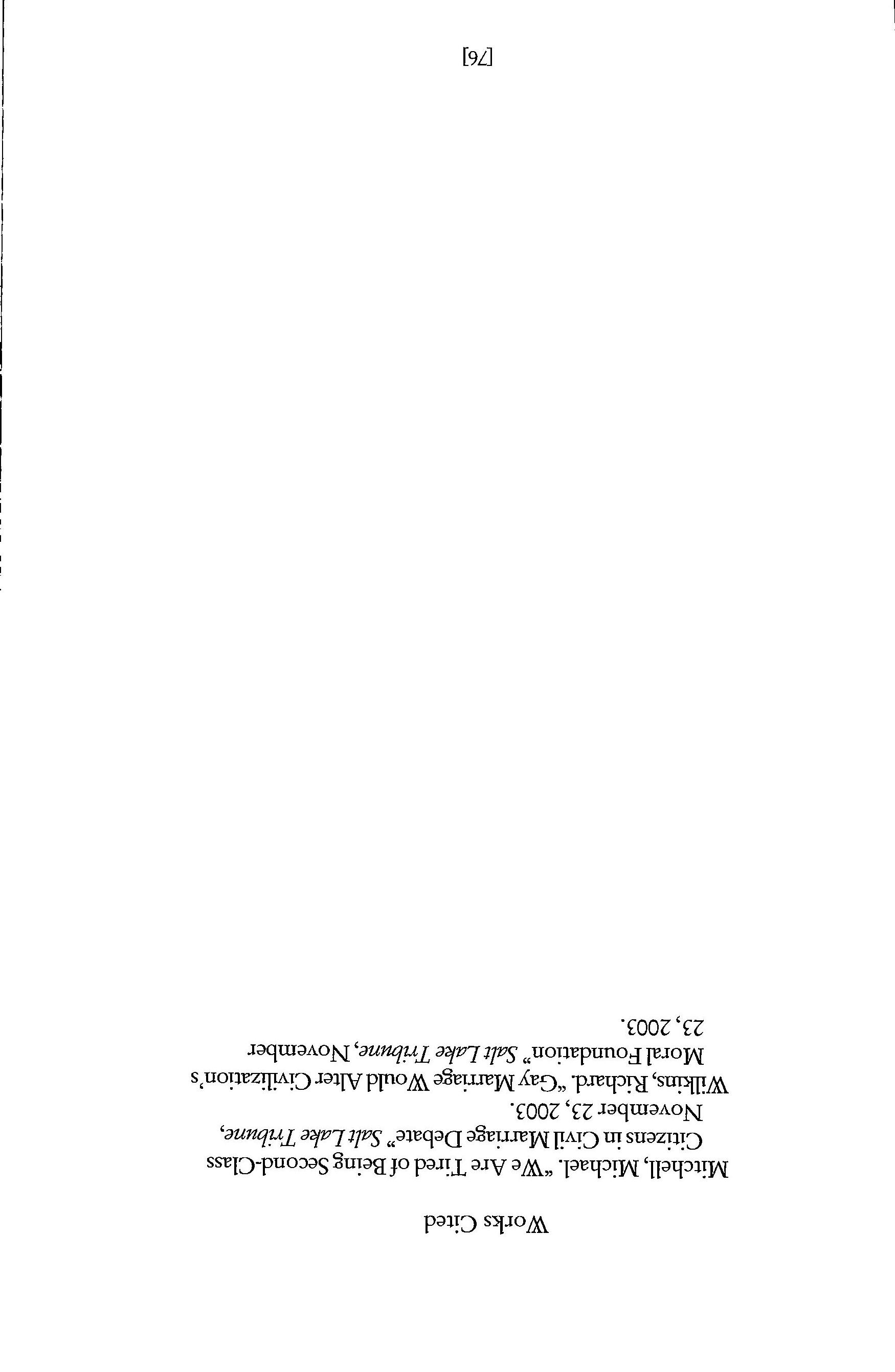
Works Cited
Mitchell, Michael. "We Are Tired of Being Second-Class Citizens in Civil Marriage Debate" Salt Lake Tribune, November 23, 2003.
Wilkins, Richard. "Gay Marriage Would Alter Civilization's Moral Foundation" Salt Lake Tribune, November 23,2003.
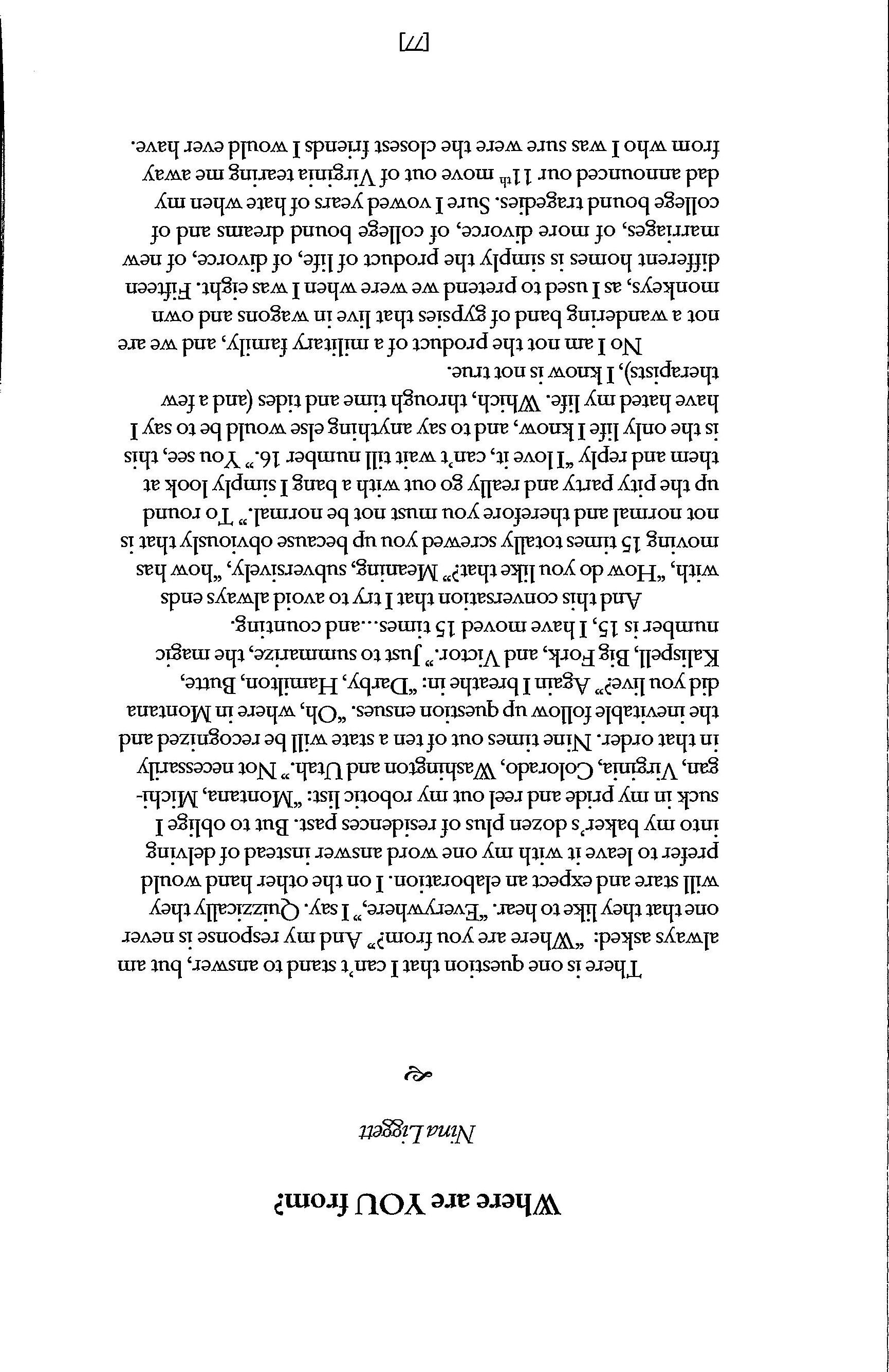
There is one question that I can't stand to answer, but am always asked: "Where are you from?" And my response is never one that they like to hear. "Everywhere," I say. Quizzically they will stare and expect an elaboration. I on the other hand would prefer to leave it with my one word answer instead of delving into my baker's dozen plus of residences past. But to oblige I suck in my pride and reel out my robotic list: "Montana, Michigan, Virginia, Colorado, Washington and Utah." Not necessarily in that order. Nine times out of ten a state will be recognized and the inevitable follow up question ensues. "Oh, where in Montana did you live?" Again I breathe in: "Darby, Hamilton, Butte, Kalispell, Big Fork, and Victor." Just to summarize, the magic number is 15, I have moved 15 times ... and counting.
And this conversation that I try to avoid always ends with, "How do you like that?" Meaning, subversively, "how has moving 15 times totally screwed you up because obviously that is not normal and therefore you must not be normal." To round up the pity party and really go out with a bang I simply look at them and reply "I love it, can't wait till number 16." You see, this is the only life I know, and to say anything else would be to say I have hated my life. Which, through time and tides (and a few therapists), I know is not true.
No I am not the product of a military family, and we are not a wandering band of gypsies that live in wagons and own monkeys, as I used to pretend we were when I was eight. Fifteen different homes is simply the product of life, of divorce, of new marriages, of more divorce, of college bound dreams and of college bound tragedies. Sure I vowed years of hate when my dad announced our 11 th move out of Virginia tearing me away from who I was sure were the closest friends I would ever have.
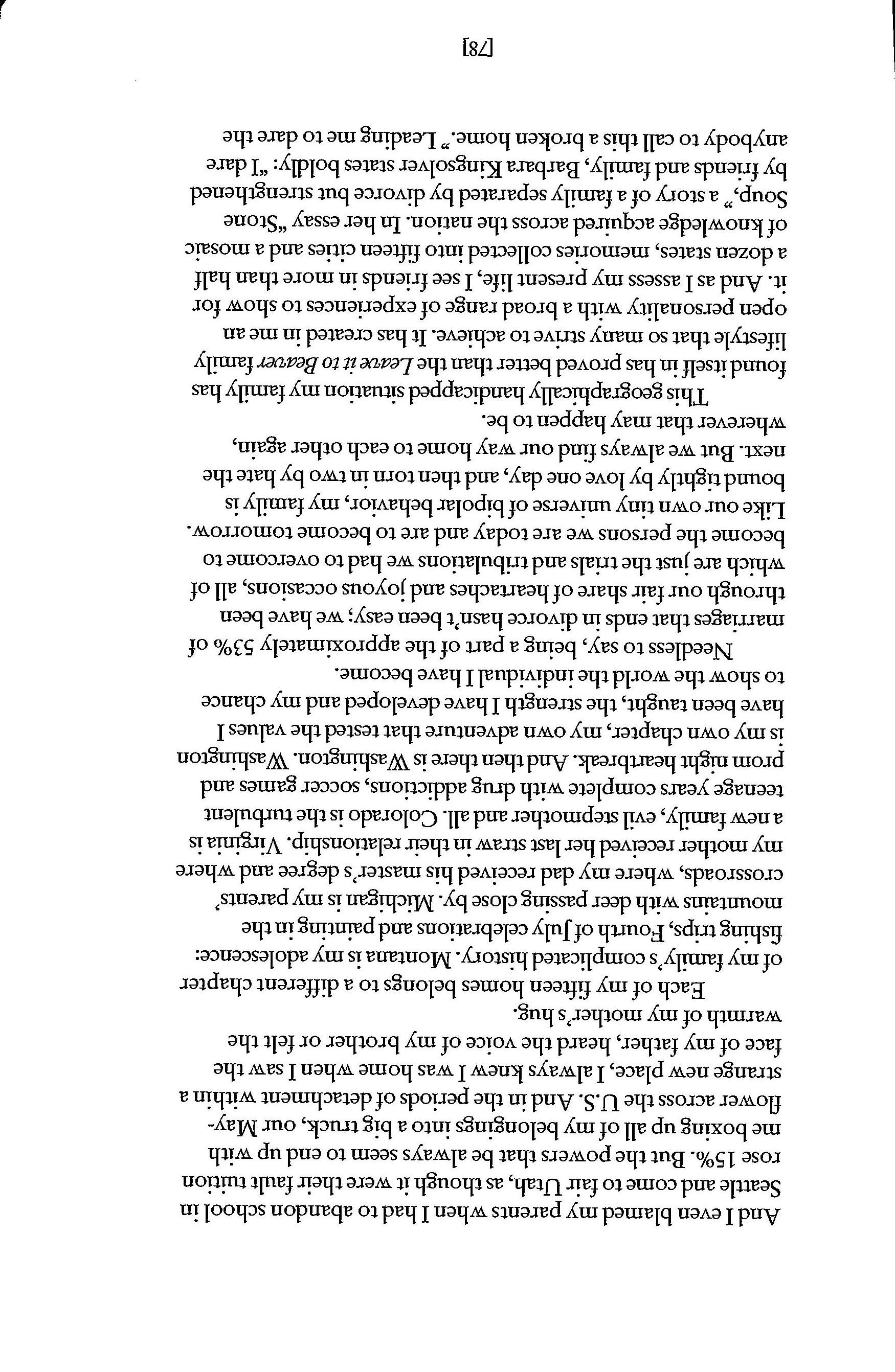
And I even blamed my parents when I had to abandon school in Seattle and come to fair Utah, as though it were their fault tuition rose 15%. But the powers that be always seem to end up with me boxing up all of my belongings into a big truck, our Mayflower across the U.S. And in the periods of detachment within a strange new place, I always knew I was home when I saw the face of my father, heard the voice of my brother or felt the warmth of my mother's hug.
Each of my fifteen homes belongs to a different chapter of my family's complicated history. Montana is my adolescence: fishing trips, Fourth of July celebrations and painting in the mountains with deer passing close by. Michigan is my parents' crossroads, where my dad received his master's degree and where my mother received her last straw in their relationship. Virginia is a new family, evil stepmother and all. Colorado is the turbulent teenage years complete with drug addictions, soccer games and prom night heartbreak. And then there is Washington. Washington is my own chapter, my own adventure that tested the values I have been taught, the strength I have developed and my chance to show the world the individual I have become.
Needless to say, being a part of the approximately 53% of marriages that ends in divorce hasn't been easy; we have been through our fair share of heartaches and joyous occasions, all of which are just the trials and tribulations we had to overcome to become the persons we are today and are to become tomorrow.
Like our own tiny universe of bipolar behavior, my family is bound tightly by love one day, and then torn in two by hate the next. But we always find our way home to each other again, whereverthat may happen to be.
This geographically handicapped situation my family has found itself in has proved better than the Leave it to Beaver family lifestyle that so many strive to achieve. It has created in me an open personality with a broad range of experiences to show for it. And as I assess my present life, I see friends in more than half a dozen states, memories collected into fifteen cities and a mosaic of knowledge acquired across the nation. In her essay "Stone Soup," a story of a family separated by divorce but strengthened by friends and family, Barbara Kingsolver states boldly: "I dare anybody to call this a broken home." Leading me to dare the
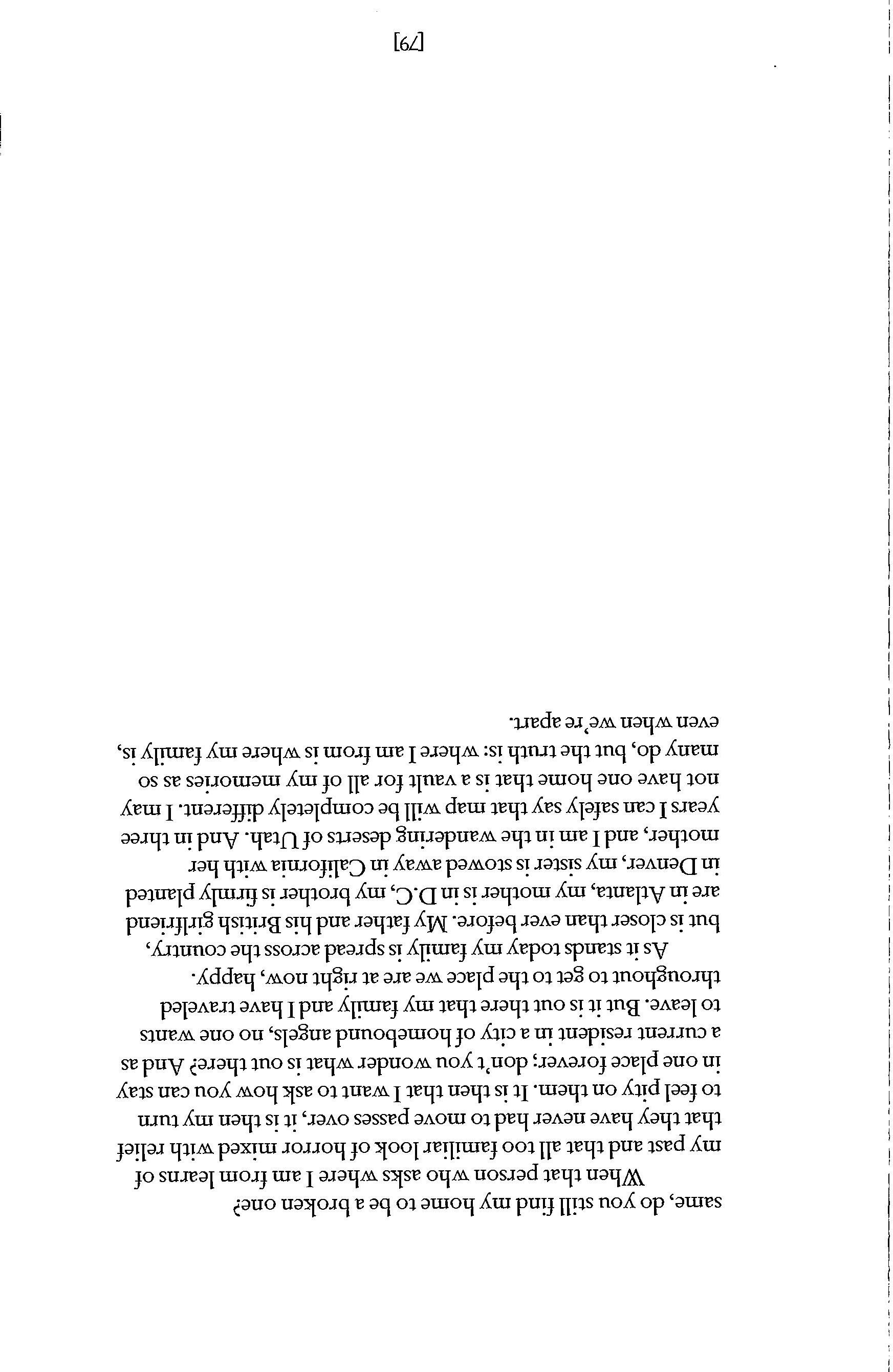
same, do you still find my home to be a broken one?
When that person who asks where I am from learns of my past and that all too familiar look of horror mixed with relief that they have never had to move passes over, it is then my turn to feel pity on them. It is then that I want to ask how you can stay in one place forever; don't you wonder what is out there? And as a current resident in a city of homebound angels, no one wants to leave. But it is out there that my family and I have traveled throughout to get to the place we are at right now, happy. As it stands today my family is spread across the country, but is closer than ever before. My father and his British girlfriend are in Atlanta, my mother is in D.C, my brother is firmly planted in Denver, my sister is stowed away in California with her mother, and I am in the wandering deserts of Utah. And in three years I can safely say that map will be completely different. I may not have one home that is a vault for all of my memories as so many do, but the truth is: where I am from is where my family is, even when we're apart.
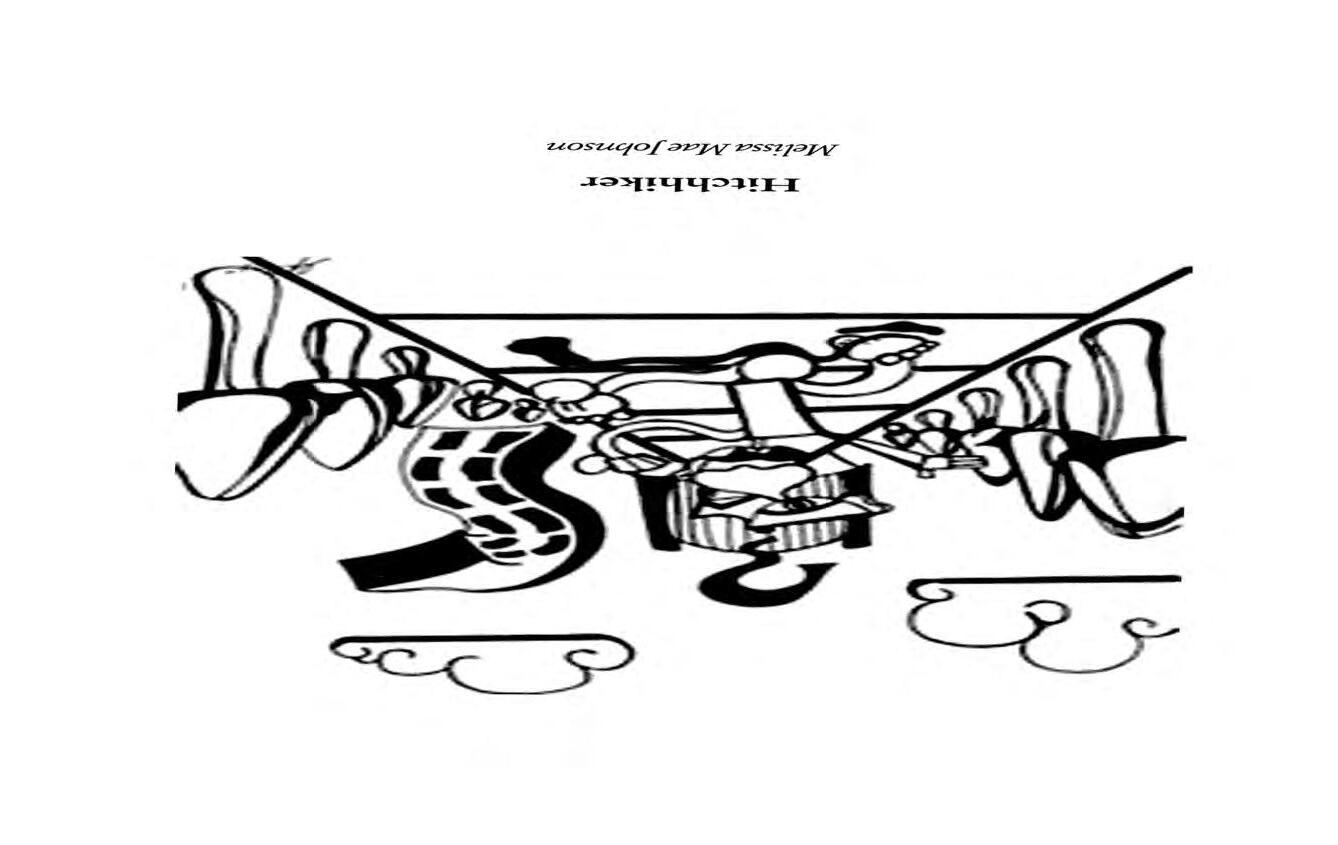
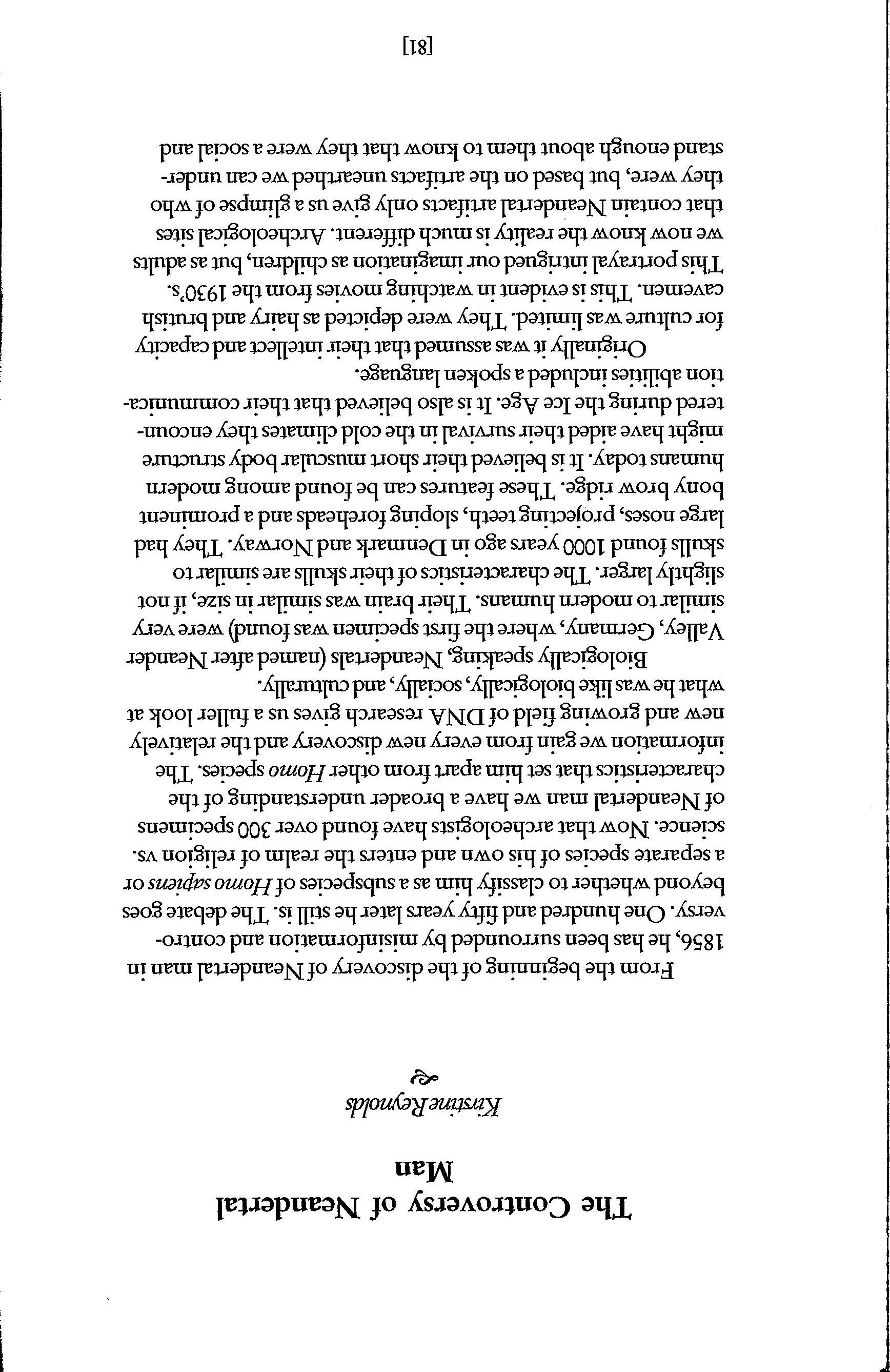
From the beginning of the discovery of Neandertal man in 1856, he has been surrounded by misinformation and controversy. One hundred and fifty years later he still is. The debate goes beyond whether to classify him as a subspecies of Homo sapiens or a separate species of his own and enters the realm of religion vs. science. Now that archeologists have found over 300 specimens of Neandertal man we have a broader understanding of the characteristics that set him apart from other Homo species. The information we gain from every new discovery and the relatively new and growing field of DNA research gives us a fuller look at what he was like biologically, socially, and culturally.
Biologically speaking, Neandertals (named after Neander Valley, Germany, where the first specimen was found) were very similar to modern humans. Their brain was similar in size, if not slightly larger. The characteristics of their skulls are similar to skulls found 1000 years ago in Denmark and Norway. They had large noses, projecting teeth, sloping foreheads and a prominent bony brow ridge. These features can be found among modern humans today. It is believed their short muscular body structure might have aided their survival in the cold climates they encountered during the Ice Age. It is also believed that their communication abilities included a spoken language.
Originally it was assumed that their intellect and capacity for culture was limited. They were depicted as hairy and brutish cavemen. This is evident in watching movies from the 1930's. This portrayal intrigued our imagination as children, but as adults we now know the reality is much different. Archeological sites that contain Neandertal artifacts only give us a glimpse of who they were, but based on the artifacts unearthed we can understand enough about them to know that they were a social and
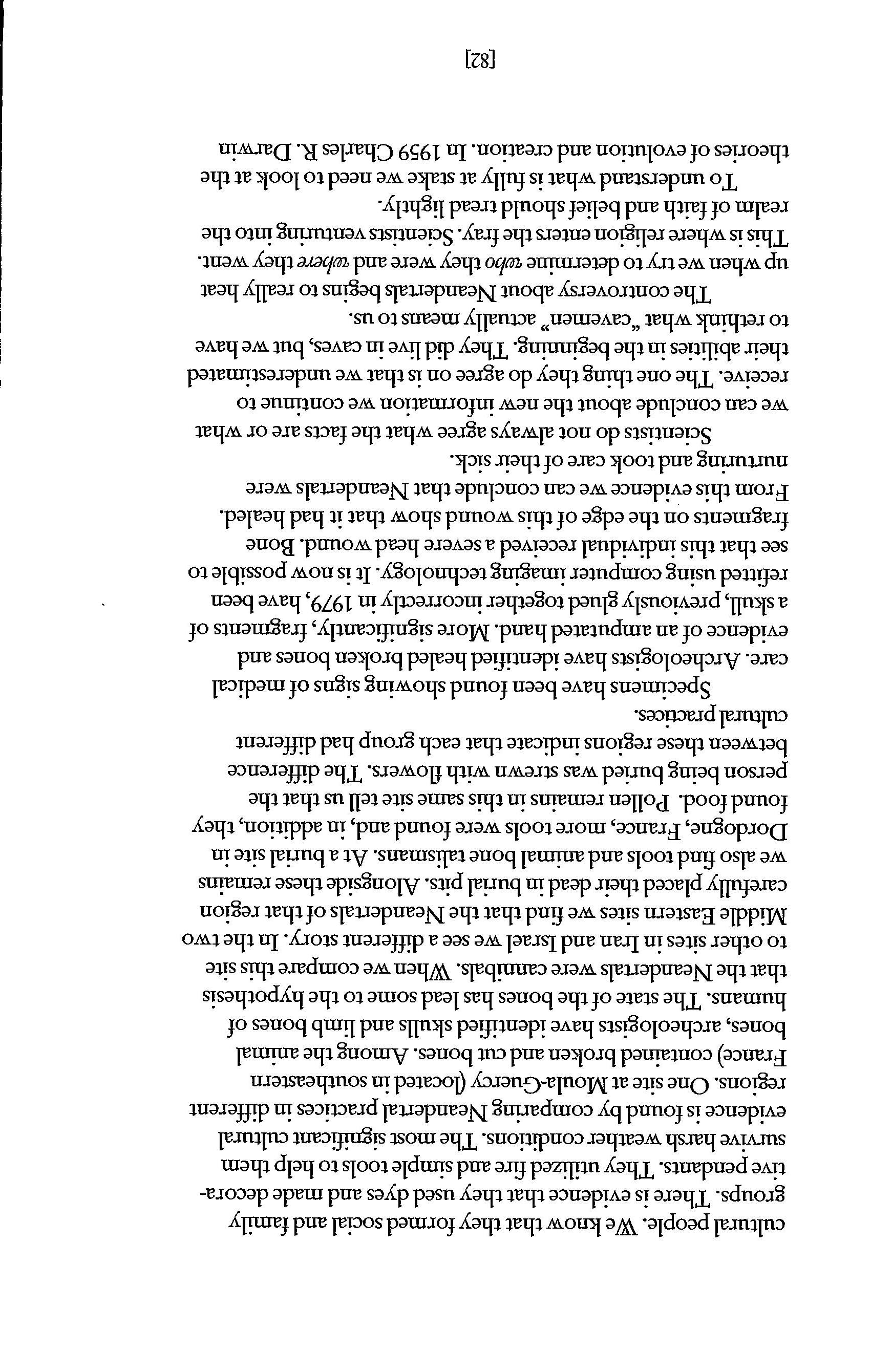
cultural people. We know that they formed social and family groups. There is evidence that they used dyes and made decorative pendants. They utilized fire and simple tools to help them survive harsh weather conditions. The most significant cultural evidence is found by comparing Neandertal practices in different regions. One site at Moula-Guercy Qocated in southeastern France) contained broken and cut bones. Among the animal bones, archeologists have identified skulls and limb bones of humans. The state of the bones has lead some to the hypothesis that the Neandertals were cannibals. When we compare this site to other sites in Iran and Israel we see a different story. In the two Middle Eastern sites we find that the Neandertals of that region carefully placed their dead in burial pits. Alongside these remains we also find tools and animal bone talismans. At a burial site in Dordogne, France, more tools were found and, in addition, they found food. Pollen remains in this same site tell us that the person being buried was strewn with flowers. The difference between these regions indicate that each group had different cultural practices.
Specimens have been found showing signs of medical care. Archeologists have identified healed broken bones and evidence of an amputated hand. More significantly, fragments of a skull, previously glued together incorrectly in 1979, have been refitted using computer imaging technology. It is now possible to see that this individual received a severe head wound. Bone fragments on the edge of this wound show that it had healed. From this evidence we can conclude that Neandertals were nurturing and took care of their sick.
Scientists do not always agree what the facts are or what we can conclude about the new information we continue to receive. The one thing they do agree on is that we underestimated their abilities in the beginning. They did live in caves, but we have to rethink what "cavemen" actually means to us.
The controversy about Neandertals begins to really heat up when we try to determine who they were and where they went. This is where religion enters the fray. Scientists venturing into the realm of faith and belief should tread lightly.
To understand what is fully at stake we need to look at the theories of evolution and creation. In 1959 Charles R. Darwin
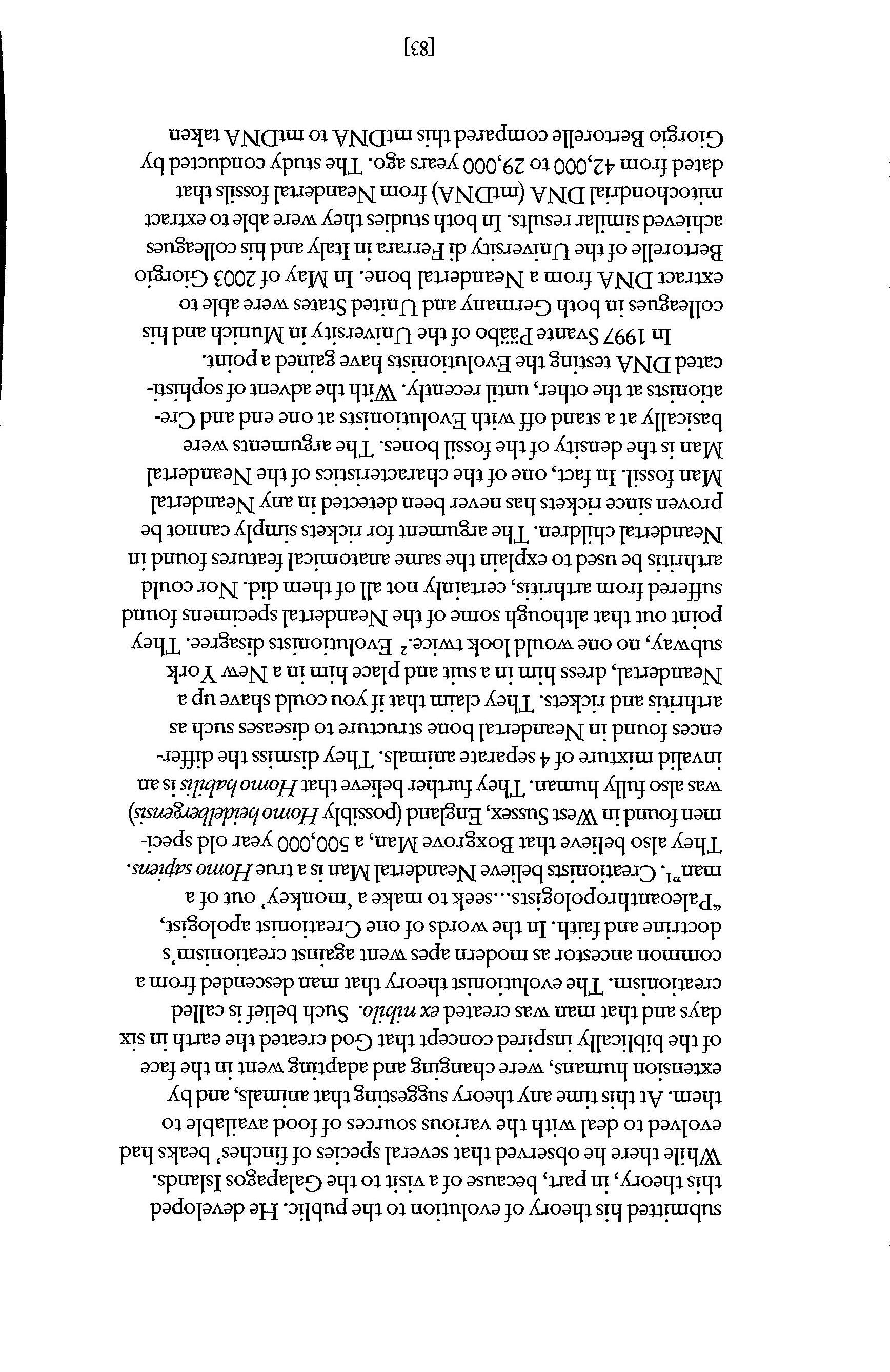
submitted his theory of evolution to the public. He developed this theory, in part, because of a visit to the Galapagos Islands. While there he observed that several species of finches' beaks had evolved to deal with the various sources of food available to them. At this time any theory suggesting that animals, and by extension humans, were changing and adapting went in the face of the biblically inspired concept that God created the earth in six days and that man was created ex nihilo. Such belief is called creationism. The evolutionist theory that man descended from a common ancestor as modern apes went against creationism's doctrine and faith. In the words of one Creationist apologist, "Paleoanthropologists ... seek to make a 'monkey' out of a man" 1• Creationists believe Neandertal Man is a true Homo sapiens. They also believe that Boxgrove Man, a 500,000 year old specimen found in West Sussex, England (possibly Homo heidelbergensis) was also fully human. They further believe that Homo habilis is an invalid mixture of 4 separate animals. They dismiss the differences found in Neandertal bone structure to diseases such as arthritis and rickets. They claim that if you could shave up a Neandertal, dress him in a suit and place him in a New York subway, no one would look twice. 2 Evolutionists disagree. They point out that although some of the Neandertal specimens found suffered from arthritis, certainly not all of them did. Nor could arthritis be used to explain the same anatomical features found in Neandertal children. The argument for rickets simply cannot be proven since rickets has never been detected in any Neandertal Man fossil. In fact, one of the characteristics of the Neandertal Man is the density of the fossil bones. The arguments were basically at a stand off with Evolutionists at one end and Creationists at the other, until recently. With the advent of sophisticated DNA testing the Evolutionists have gained a point.
In 1997 Svante Paabo of the University in Munich and his colleagues in both Germany and United States were able to extract DNA from a Neandertal bone. In May of 2003 Giorgio Bertorelle of the University di Ferrara in Italy and his colleagues achieved similar results. In both studies they were able to extract mitochondrial DNA (mtDNA) from Neandertal fossils that dated from 42,000 to 29,000 years ago. The study conducted by Giorgio Bertorelle compared this mtDNA to mtDNA taken
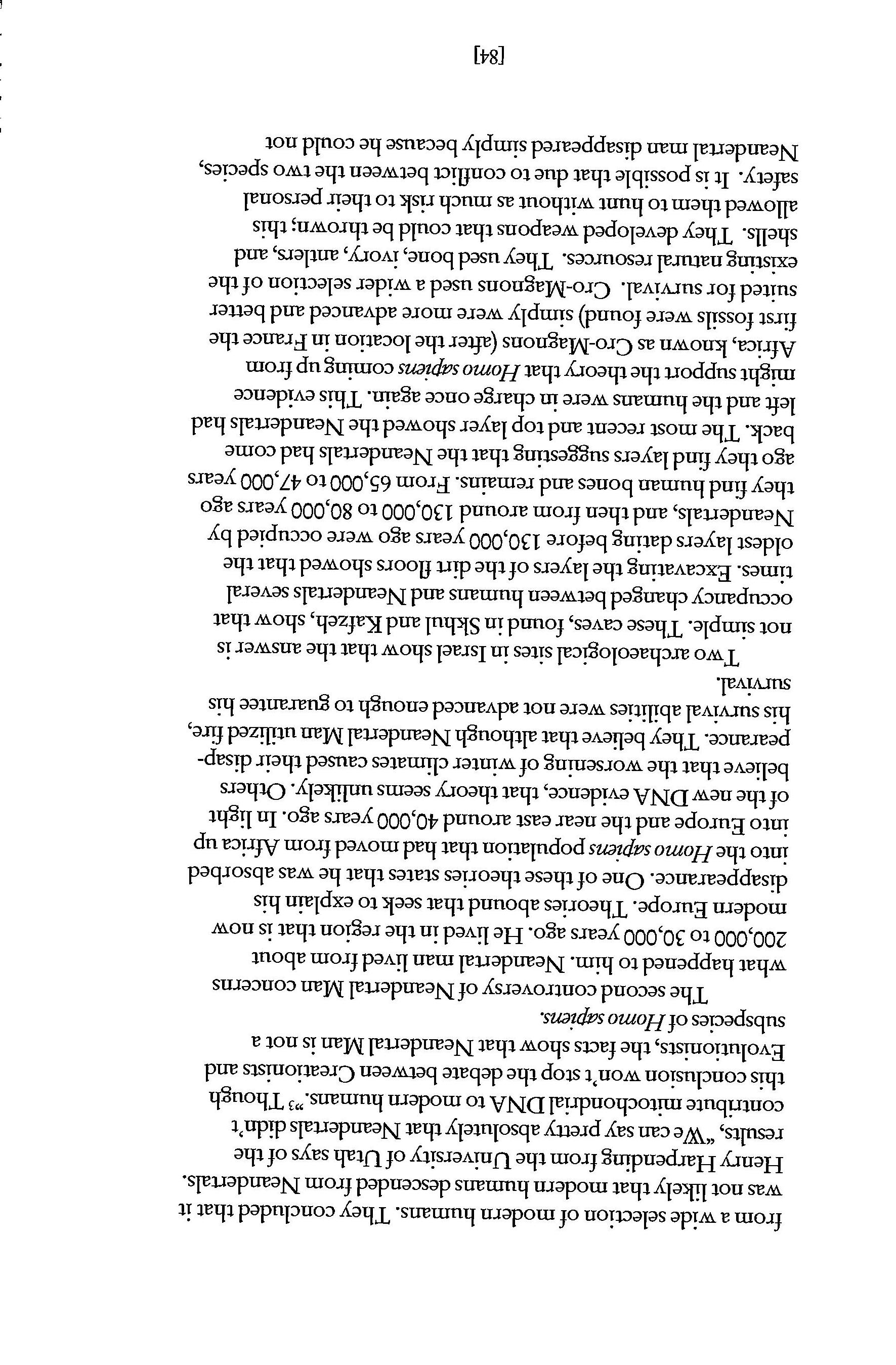
from a wide selection of modern humans. They concluded that it was not likely that modern humans descended from Neandertals. Henry Harpending from the University of Utah says of the results, "We can say pretty absolutely that Neandertals didn't contribute mitochondrial DNA to modern humans." 3 Though this conclusion won't stop the debate between Creationists and Evolutionists, the facts show that Neandertal Man is not a subspecies of Homo sapiens.
The second controversy of Neandertal Man concerns what happened to him. Neandertal man lived from about 200,000 to 30,000 years ago. He lived in the region that is now modern Europe. Theories abound that seek to explain his disappearance. One of these theories states that he was absorbed into the Homo sapiens population that had moved from Africa up into Europe and the near east around 40,000 years ago. In light of the new DNA evidence, that theory seems unlikely. Others believe that the worsening of winter climates caused their disappearance. They believe that although Neandertal Man utilized fire, his survival abilities were not advanced enough to guarantee his survival.
Two archaeological sites in Israel show that the answer is not simple. These caves, found in Skhul and Kafzeh, show that occupancy changed between humans and Neandertals several times. Excavating the layers of the dirt floors showed that the oldest layers dating before 130,000 years ago were occupied by Neandertals, and then from around 130,000 to 80,000 years ago they find human bones and remains. From 65,000 to 47,000 years ago they find layers suggesting that the Neandertals had come back. The most recent and top layer showed the Neandertals had left and the humans were in charge once again. This evidence might support the theory that Homo sapiens coming up from Africa, known as Cro-Magnons (after the location in France the first fossils were found) simply were more advanced and better suited for survival. Cro-Magnons used a wider selection of the existing natural resources. They used bone, ivory, antlers, and shells. They developed weapons that could be thrown; this allowed them to hunt without as much risk to their personal safety. It is possible that due to conflict between the two species, Neandertal man disappeared simply because he could not
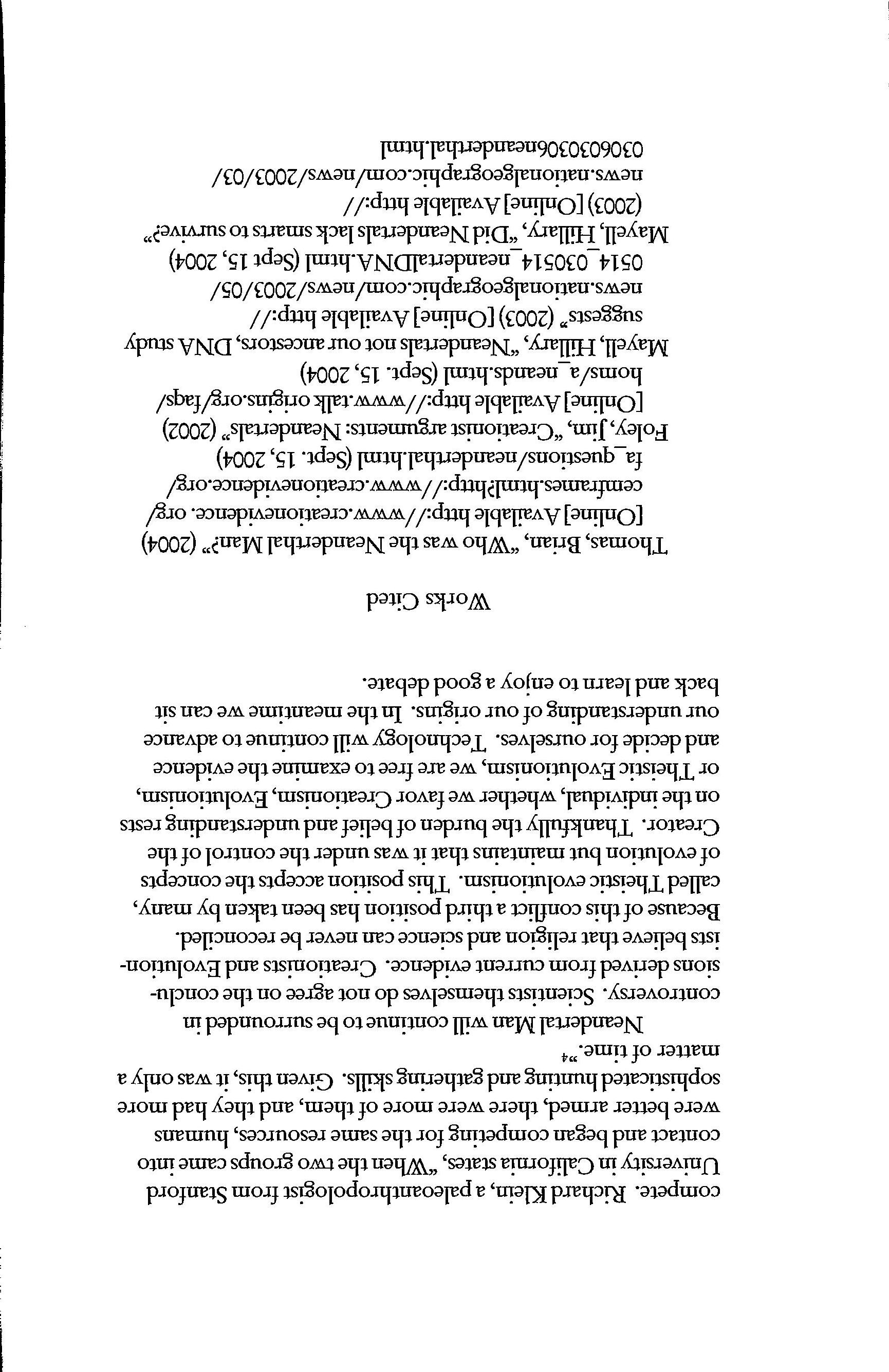
compete. Richard Klein, a paleoanthropologist from Stanford University in California states, "When the two groups came into contact and began competing for the same resources, humans were better armed, there were more of them, and they had more sophisticated hunting and gathering skills. Given this, it was only a matter of time." 4
Neandertal Man will continue to be surrounded in controversy. Scientists themselves do not agree on the conclusions derived from current evidence. Creationists and Evolutionists believe that religion and science can never be reconciled. Because of this conflict a third position has been taken by many, called Theistic evolutionism. This position accepts the concepts of evolution but maintains that it was under the control of the Creator. Thankfully the burden of belief and understanding rests on the individual, whether we favor Creationism, Evolutionism, or Theistic Evolutionism, we are free to examine the evidence and decide for ourselves. Technology will continue to advance our understanding of our origins. In the meantime we can sit back and learn to enjoy a good debate.
Works Cited
Thomas, Brian, "Who was the Neanderthal Man?" (2004) [Online] Available http://www.creationevidence. org/ cemframes.html?http://www.creationevidence.org/ fa_questions/neanderthal.html (Sept. 15, 2004)
Foley,Jim, "Creationist arguments: Neandertals" (2002) [Online] Availablehttp://www.talkorigins.org/faqs/ horns/a_neands.html (Sept. 15, 2004)
Mayell, Hillary, "Neandertals not our ancestors, DNA study suggests" (2003) [Online] Available http:// news.nationalgeographic.com/news/2003/05/ 0514 _ 030514 _ neandertalDNA.html (Sept 15, 2004)
Mayell, Hillary, "Did Neandertals lack smarts to survive?" (2003) [Online] Available http:// news.nationalgeographic.com/news/2003/03/ 0306030306neanderthal.html

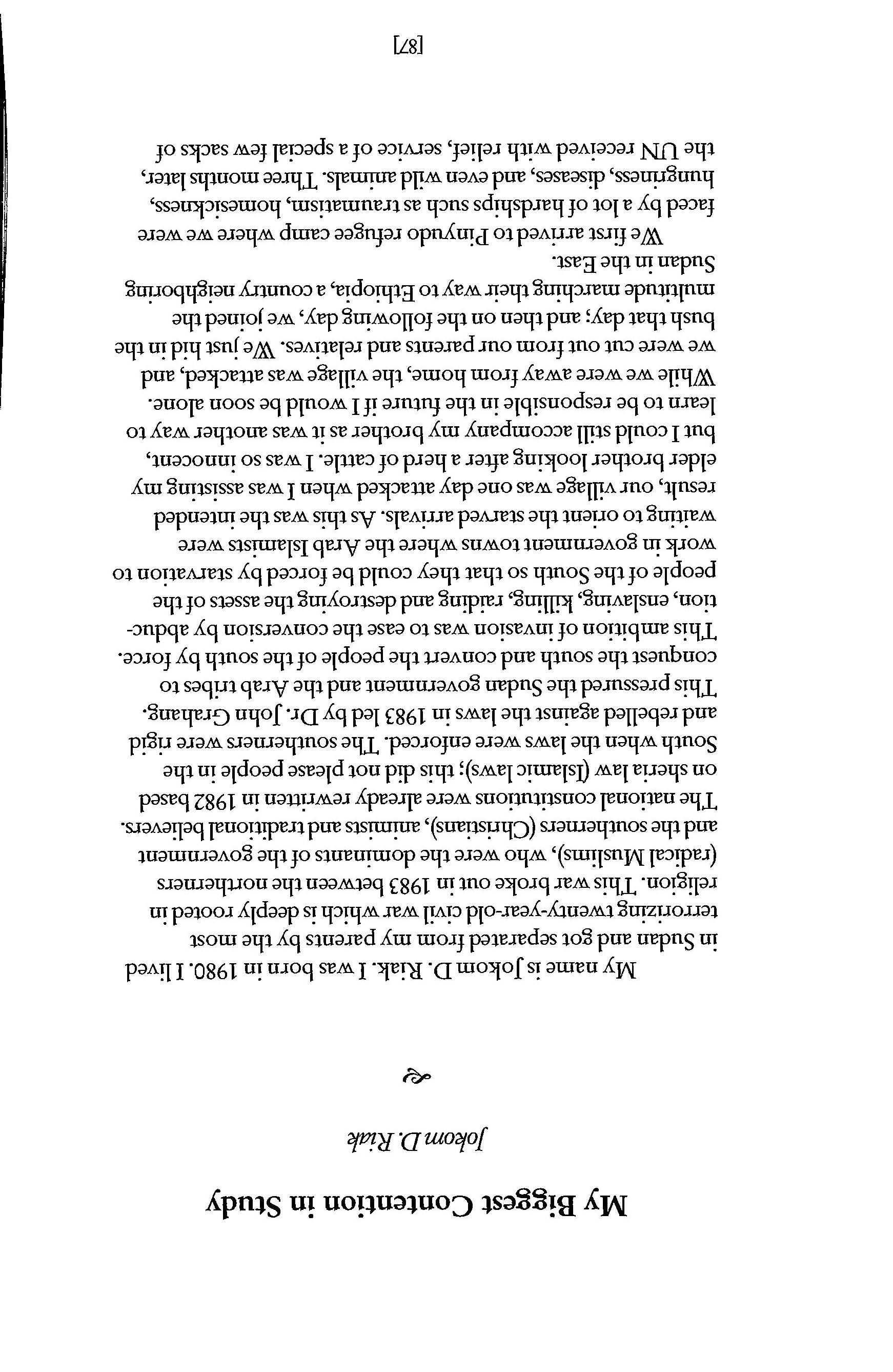
My name is J okom D. Riak. I was born in 1980. I lived in Sudan and got separated from my parents by the most terrorizing twenty-year-old civil war which is deeply rooted in religion. This war broke out in 1983 between the northerners (radical Muslims), who were the dominants of the government and the southerners (Christians), animists and traditional believers. The national constitutions were already rewritten in 1982 based on sheria law (Islamic laws); this did not please people in the South when the laws were enforced. The southerners were rigid and rebelled against the laws in 1983 led by Dr. John Grahang. This pressured the Sudan government and the Arab tribes to conquest the south and convert the people of the south by force. This ambition of invasion was to ease the conversion by abduction, enslaving, killing, raiding and destroying the assets of the people of the South so that they could be forced by starvation to work in government towns where the Arab Islamists were waiting to orient the starved arrivals. As this was the intended result, our village was one day attacked when I was assisting my elder brother looking after a herd of cattle. I was so innocent, but I could still accompany my brother as it was another way to learn to be responsible in the future if I would be soon alone. While we were away from home, the village was attacked, and we were cut out from our parents and relatives. We just hid in the bush that day; and then on the following day, we joined the multitude marching their way to Ethiopia, a country neighboring Sudan in the East.
We first arrived to Pinyudo refugee camp where we were faced by a lot of hardships such as traumatism, homesickness, hungriness, diseases, and even wild animals. Three months later, the UN received with relief, service of a special few sacks of
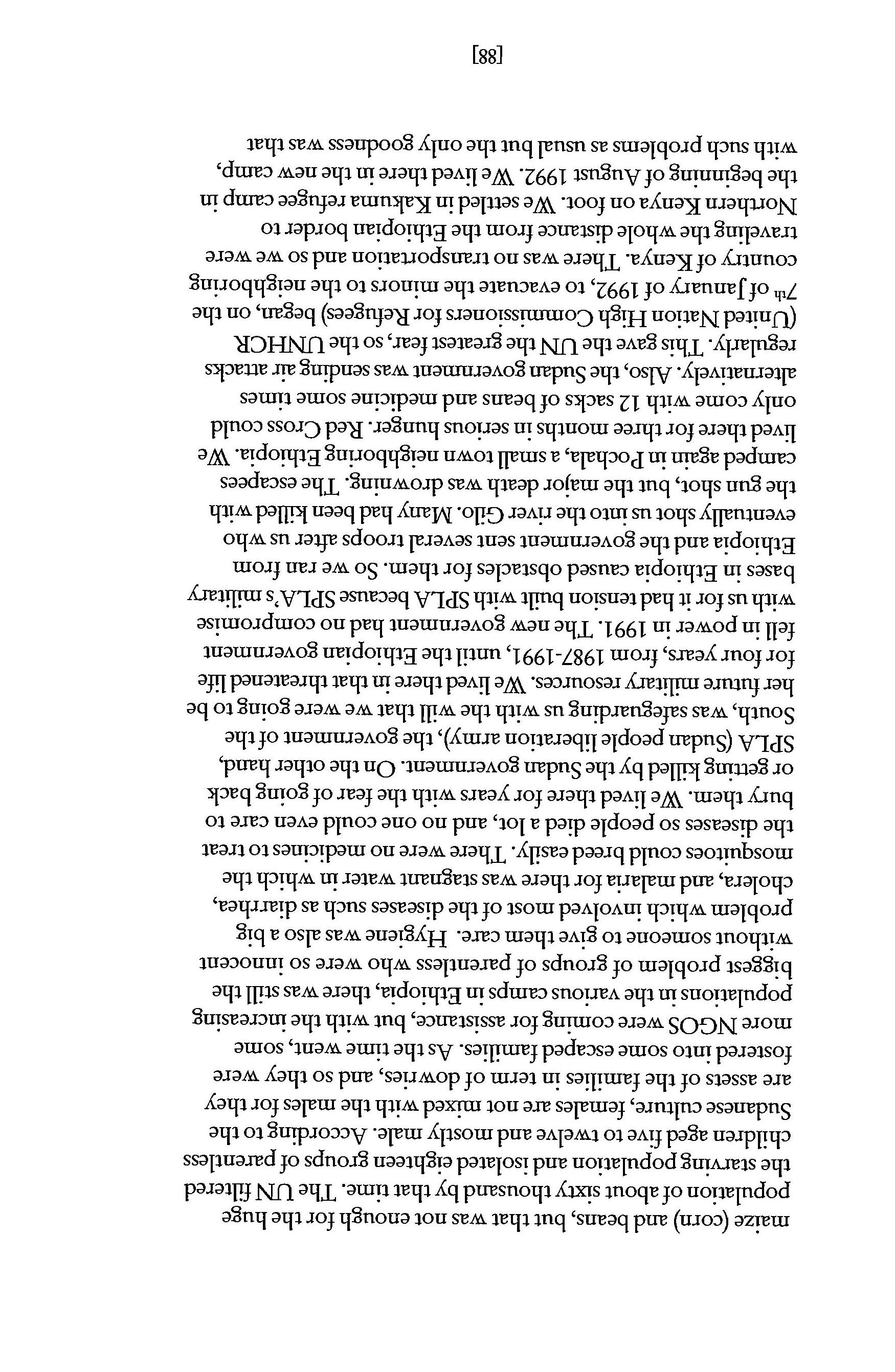
maize {corn) and beans, but that was not enough forthe huge population of about sixty thousand by that time. The UN filtered the starving population and isolated eighteen groups of parentless children aged five to twelve and mostly male. According to the Sudanese culture, females are not mixed with the males for they are assets of the families in term of dowries, and so they were fostered into some escaped families. As the time went, some more NGOS were coming for assistance, but with the increasing populations in the various camps in Ethiopia, there was still the biggest problem of groups of parentless who were so innocent without someone to give them care. Hygiene was also a big problem which involved most of the diseases such as diarrhea, cholera, and malaria for there was stagnant water in which the mosquitoes could breed easily. There were no medicines to treat the diseases so people died a lot, and no one could even care to bury them. We lived there for years with the fear of going back or getting killed by the Sudan government. On the other hand, SPLA {Sudan people liberation army), the government of the South, was safeguarding us with the will that we were going to be her future military resources. We lived there in that threatened life for four years, from 1987-1991, until the Ethiopian government fell in power in 1991. The new government had no compromise with us for it had tension built with SPLA because SPLA's military bases in Ethiopia caused obstacles for them. So we ran from Ethiopia and the government sent several troops after us who eventually shot us into the river Gilo. Many had been killed with the gun shot, but the major death was drowning. The escapees camped again in Pochala, a small town neighboring Ethiopia. We lived there for three months in serious hunger. Red Cross could only come with 12 sacks of beans and medicine some times alternatively. Also, the Sudan government was sending air attacks regularly. This gave the UN the greatest fear, so the UNHCR (United Nation High Commissioners for Refugees) began, on the 7th of January of 1992, to evacuate the minors to the neighboring country of Kenya. There was no transportation and so we were traveling the whole distance from the Ethiopian border to Northern Kenya on foot. We settled in Kakuma refugee camp in the beginning of August 1992. We lived there in the new camp, with such problems as usual but the only goodness was that
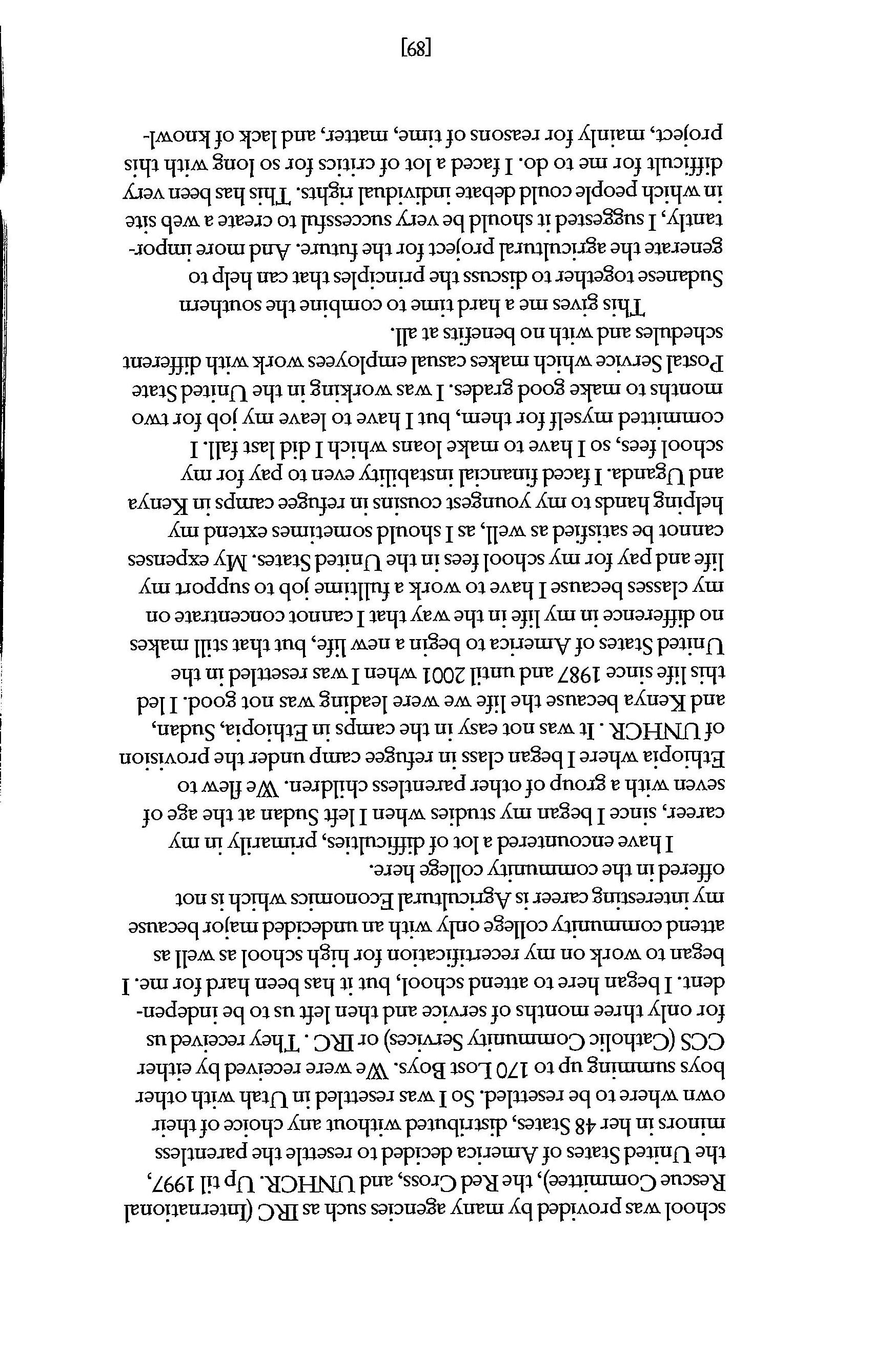
school was provided by many agencies such as IRC {International Rescue Committee), the Red Cross, and UNHCR. Up til 1997, the United States of America decided to resettle the parentless minors in her 48 States, distributed without any choice of their own where to be resettled. So I was resettled in Utah with other boys summing up to 170 Lost Boys. We were received by either CCS (Catholic Community Services) or IRC. They received us for only three months of service and then left us to be independent. I began here to attend school, but it has been hard for me. I began to work on my recertification for high school as well as attend community college only with an undecided major because my interesting career is Agricultural Economics which is not offered in the community college here.
I have encountered a lot of difficulties, primarily in my career, since I began my studies when I left Sudan at the age of seven with a group of other parentless children. We flew to Ethiopia where I began class in refugee camp under the provision of UNHCR. It was not easy in the camps in Ethiopia, Sudan, and Kenya because the life we were leading was not good. I led this life since 1987 and until 2001 when I was resettled in the United States of America to begin a new life, but that still makes no difference in my life in the way that I cannot concentrate on my classes because I have to work a fulltime job to support my life and pay for my school fees in the United States. My expenses cannot be satisfied as well, as I should sometimes extend my helping hands to my youngest cousins in refugee camps in Kenya and Uganda. I faced financial instability even to pay for my school fees, so I have to make loans which I did last fall. I committed myself for them, but I have to leave my job for two months to make good grades. I was working in the United State Postal Service which makes casual employees work with different schedules and with no benefits at all.
This gives me a hard time to combine the southern Sudanese together to discuss the principles that can help to generate the agricultural project for the future. And more importantly, I suggested it should be very successful to create a web site in which people could debate individual rights. This has been very difficult for me to do. I faced a lot of critics for so long with this project, mainly for reasons of time, matter, and lack of knowl-
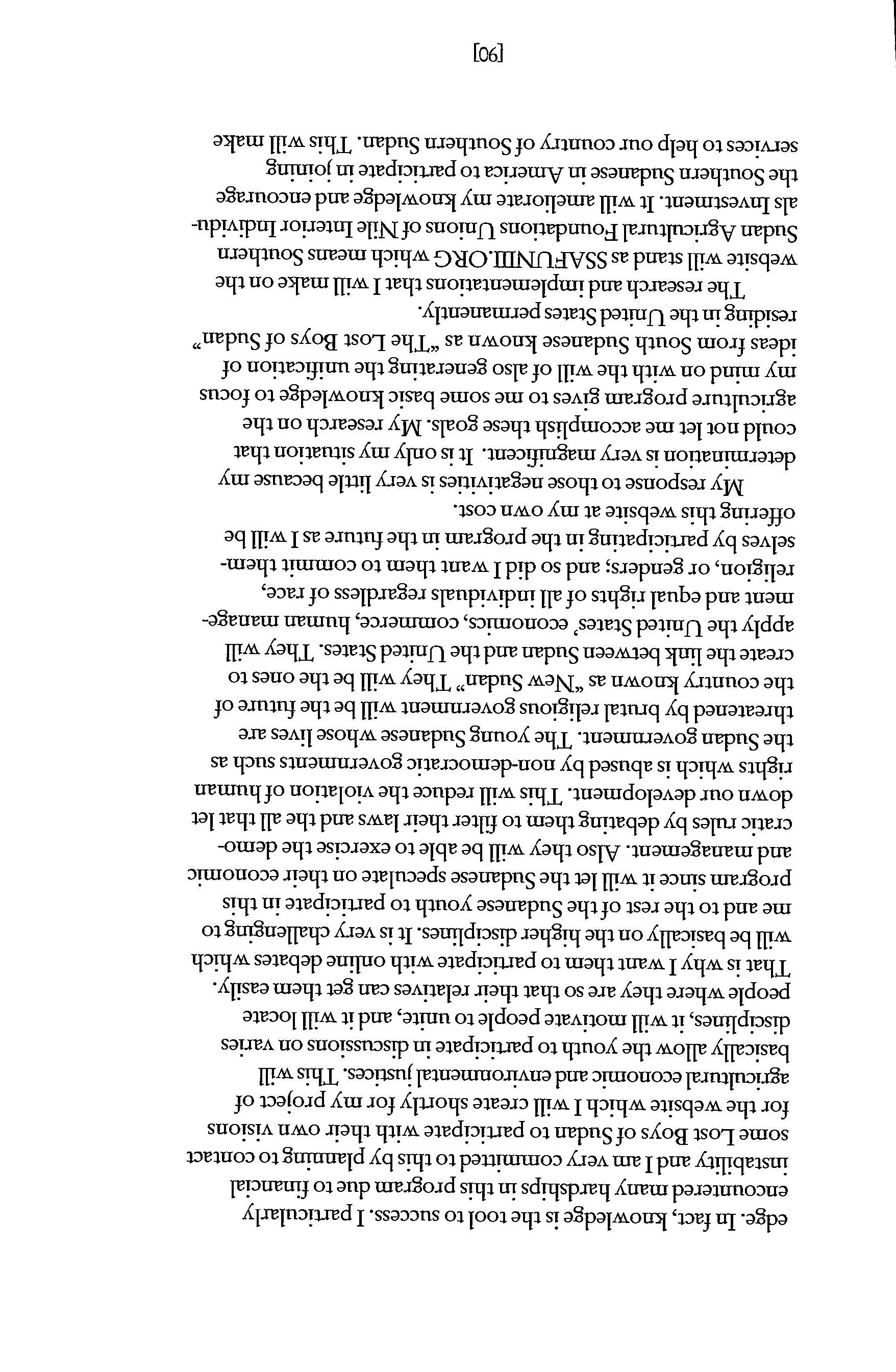
edge. In fact, knowledge is the tool to success. I particularly encountered many hardships in this program due to financial instability and I am very committed to this by planning to contact some Lost Boys of Sudan to participate with their own visions for the website which I will create shortly for my project of agricultural economic and environmental justices. This will basically allow the youth to participate in discussions on varies disciplines, it will motivate people to unite, and it will locate people where they are so that their relatives can get them easily. That is why I want them to participate with online debates which will be basically on the higher disciplines. It is very challenging to me and to the rest of the Sudanese youth to participate in this program since it will let the Sudanese speculate on their economic and management. Also they will be able to exercise the democratic rules by debating them to filter their laws and the all that let down our development. This will reduce the violation of human rights which is abused by non-democratic governments such as the Sudan government. The young Sudanese whose lives are threatened by brutal religious government will be the future of the country known as "New Sudan" They will be the ones to create the link between Sudan and the United States. They will apply the United States' economics, commerce, human management and equal rights of all individuals regardless of race, religion, or genders; and so did I want them to commit themselves by participating in the program in the future as I will be offering this website at my own cost.
My response to those negativities is very little because my determination is very magnificent. It is only my situation that could not let me accomplish these goals. My research on the agriculture program gives to me some basic knowledge to focus my mind on with the will of also generating the unification of ideas from South Sudanese known as "The Lost Boys of Sudan" residing in the United States permanently.
The research and implementations that I will make on the website will stand as SSAFUNIII.ORG which means Southern Sudan Agricultural Foundations Unions of Nile Interior Individuals Investment. It will ameliorate my knowledge and encourage the Southern Sudanese in America to participate in joining services to help our country of Southern Sudan. This will make

us and other interesting groups learn about Southern Sudan Agricultural productivities, and they may want to help this program. Others will be interested to tour Southern Sudan, when there is peace in the country, to study animals, plants, wildlife, and other living things as agriculture consents.
This project will motivate me in my career goal for it gives me courage, fortitude, and confidence. In fact, I will be mindful of what I am doing, why I am dong it, and what will lead me to its success. The project will let me interact with the other world students and understand their cultures. When I join the on-campus studies, I will be engaging to participate with other ethnic students in the school whom we should share their background, and their understanding toward the development. I will understand the ways in which individual dignity is respected in other cultures. Our multi-cultural activities at the university will let me present our African culture in which Dinka will be leading
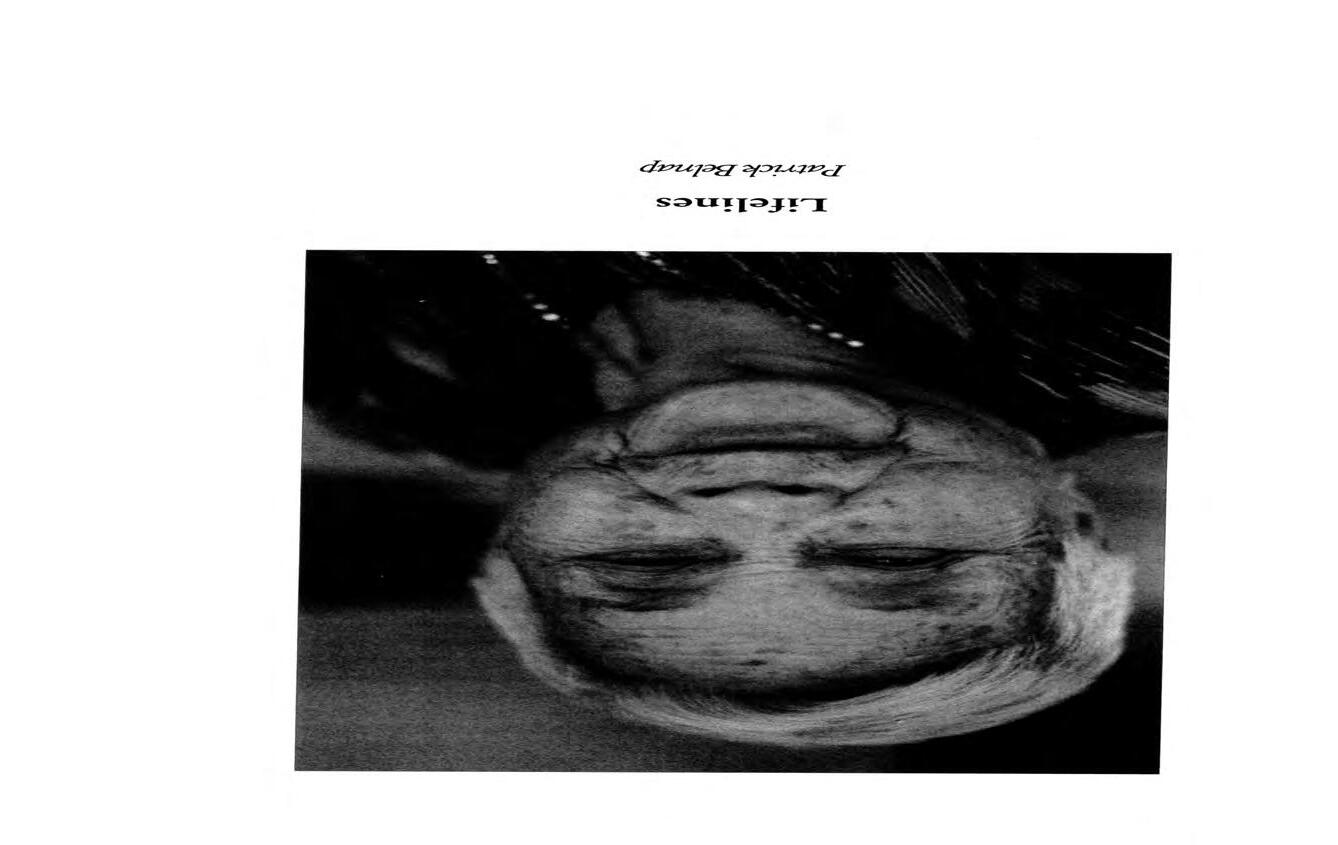
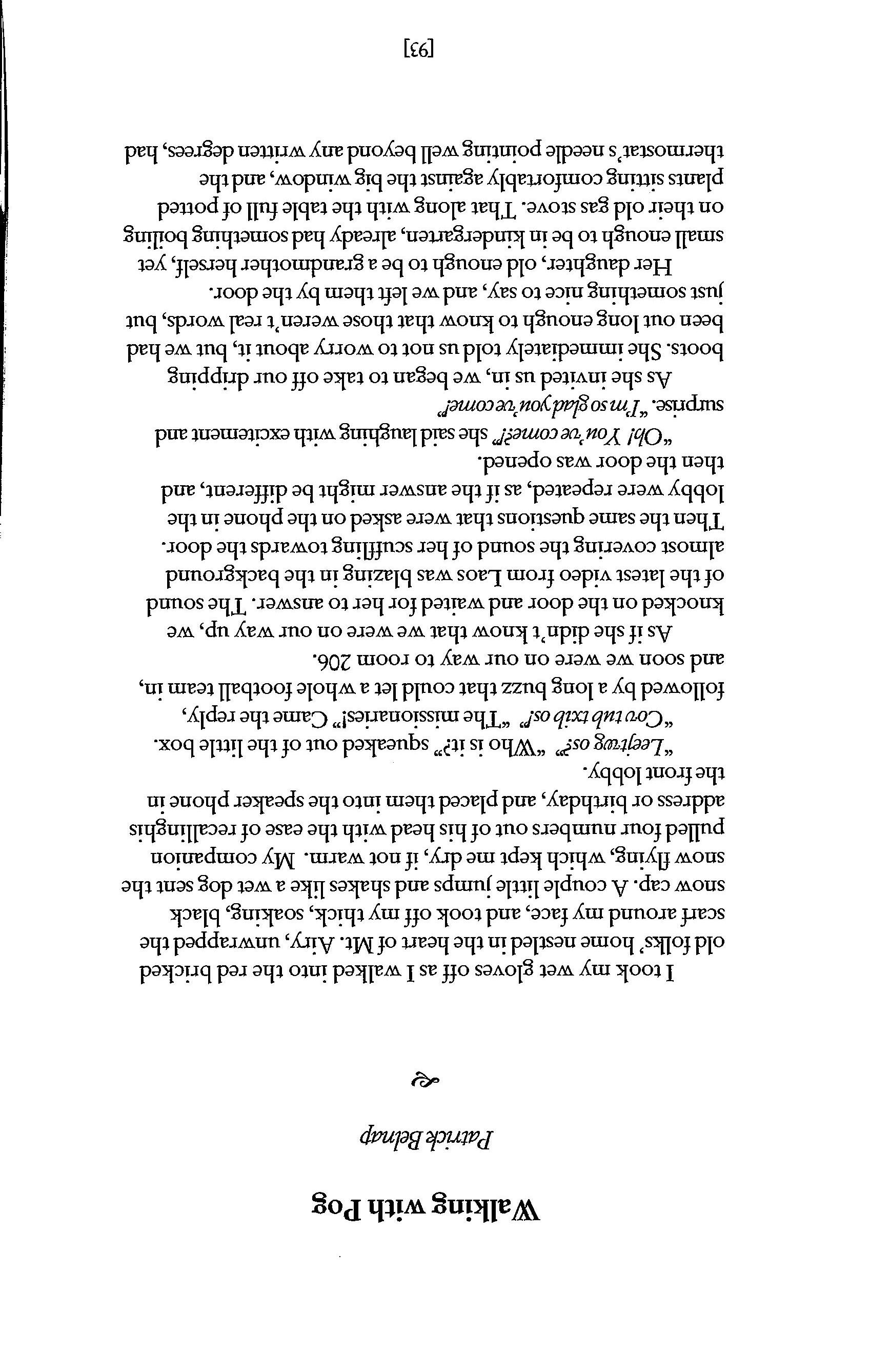
I took my wet gloves off as I walked into the red bricked old folks' home nestled in the heart of Mt. Airy, unwrapped the scarf around my face, and took off my thick, soaking, black snow cap. A couple little jumps and shakes like a wet dog sent the snow flying, which kept me dry, if not warm. My companion pulled four numbers out of his head with the ease of recallinghis address or birthday, and placed them into the speaker phone in the front lobby.
"Leejtwg os?'' "Who is it?" squeaked out of the little box.
"Cov tub txib os!' "The missionaries!" Came the reply, followed by a long buzz that could let a whole football team in, and soon we were on our way to room 206.
As if she didn't know that we were on our way up, we knocked on the door and waited for herto answer. The sound of the latest video from Laos was blazing in the background almost covering the sound of her scuffling towards the door. Then the same questions that were asked on the phone in the lobby were repeated, as if the answer might be different, and then the door was opened.
"Oh! You've come?!' she said laughing with excitement and surprise. "I'msogladyou'vecome!'
As she invited us in, we began to take off our dripping boots. She immediately told us not to worry about it, but we had been out long enough to know that those weren't real words, but just something nice to say, and we left them by the door. Her daughter, old enough to be a grandmother herself, yet small enough to be in kindergarten, already had something boiling on their old gas stove. That along with the table full of potted plants sitting comfortably against the big window, and the thermostat's needle pointing well beyond any written degrees, had
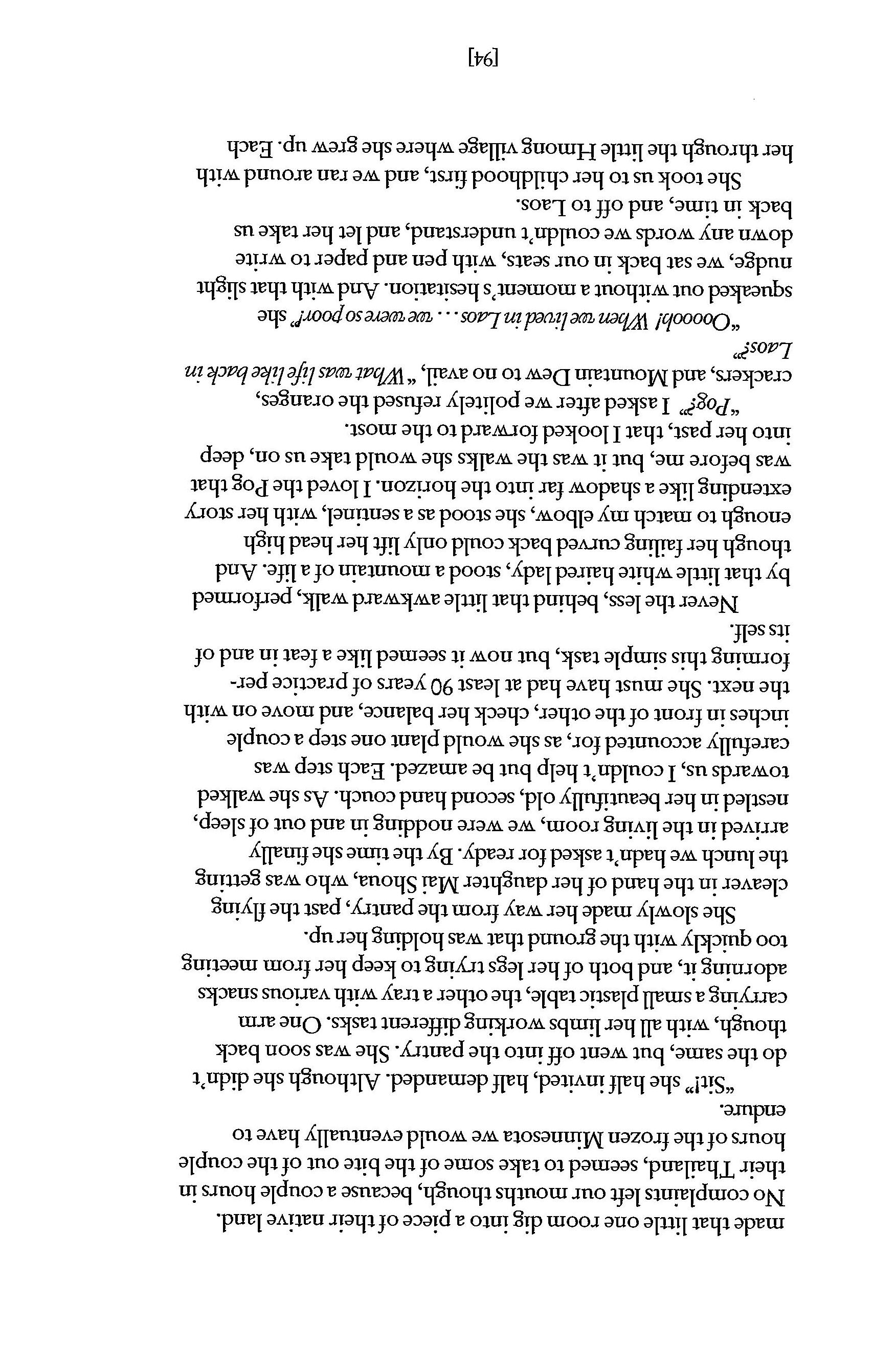
made that little one room dig into a piece of their native land. No complaints left our mouths though, because a couple hours in their Thailand, seemed to take some of the bite out of the couple hours of the frozen Minnesota we would eventually have to endure.
"Sit!" she half invited, half demanded. Although she didn't do the same, but went off into the pantry. She was soon back though, with all her limbs working different tasks. One arm carrying a small plastic table, the other a tray with various snacks adorning it, and both of her legs trying to keep her from meeting too quickly with the ground that was holding her up.
She slowly made her way from the pantry, past the flying cleaver in the hand of her daughter Mai Shoua, who was getting the lunch we hadn't asked for ready. By the time she finally arrived in the living room, we were nodding in and out of sleep, nestled in her beautifully old, second hand couch. As she walked towards us, I couldn't help but be amazed. Each step was carefully accounted for, as she would plant one step a couple inches in front of the other, check her balance, and move on with the next. She must have had at least 90 years of practice performing this simple task, but now it seemed like a feat in and of its self.
Never the less, behind that little awkward walk, performed by that little white haired lady, stood a mountain of a life. And though her failing curved back could only lift her head high enough to match my elbow, she stood as a sentinel, with her story extending like a shadow far into the horizon. I loved the Pog that was before me, but it was the walks she would take us on, deep into her past, that I looked forward to the most.
"Pog?" I asked after we politely refused the oranges, crackers, and Mountain Dew to no avail, "What was life like back in Laos?''
"Oooooh! W'benwelivedinLaos ... we were so poor!' she squeaked out without a moment's hesitation. And with that slight nudge, we sat back in our seats, with pen and paper to write down any words we couldn't understand, and let her take us back in time, and off to Laos.
She took us to her childhood first, and we ran around with her through the little Hmong village where she grew up. Each
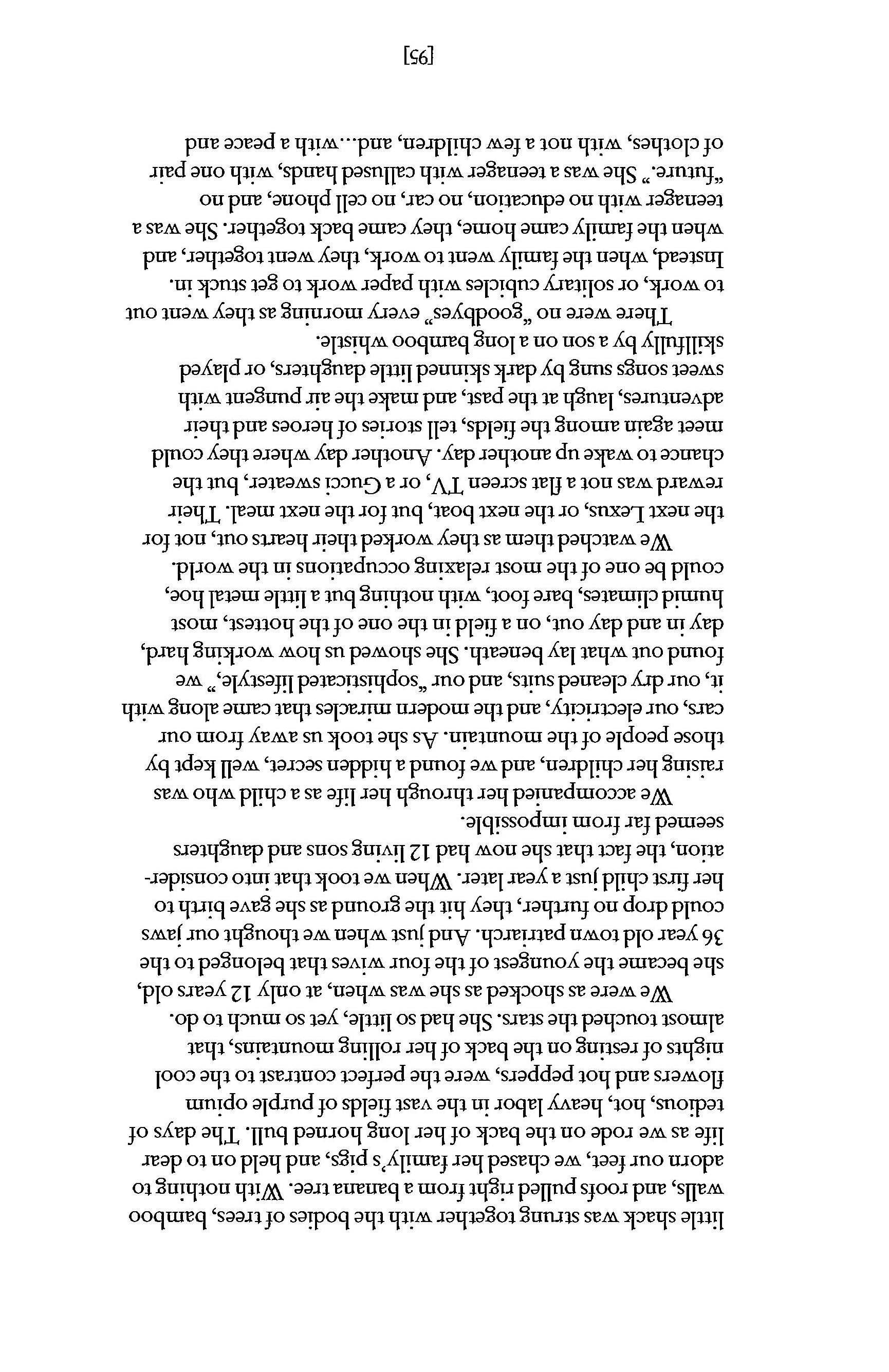
little shack was strung together with the bodies of trees, bamboo walls, and roofs pulled right from a banana tree. With nothing to adorn our feet, we chased her family's pigs, and held on to dear life as we rode on the back of her long horned bull. The days of tedious, hot, heavy labor in the vast fields of purple opium flowers and hot peppers, were the perfect contrast to the cool nights of resting on the back of her rolling mountains, that almost touched the stars. She had so little, yet so much to do.
We were as shocked as she was when, at only 12 years old, she became the youngest of the four wives that belonged to the 36 year old town patriarch. And just when we thought our jaws could drop no further, they hit the ground as she gave birth to her first child just a year later. When we took that into consideration, the fact that she now had 12 living sons and daughters seemed far from impossible.
We accompanied her through her life as a child who was raising her children, and we found a hidden secret, well kept by those people of the mountain. As she took us away from our cars, our electricity, and the modern miracles that came along with it, our dry deaned suits, and our "sophisticated lifestyle," we found out what lay beneath. She showed us how working hard, day in and day out, on a field in the one of the hottest, most humid climates, bare foot, with nothing but a little metal hoe, could be one of the most relaxing occupations in the world.
We watched them as they worked their hearts out, not for the next Lexus, or the next boat, but for the next meal. Their reward was not a flat screen TV, or a Gucci sweater, but the chance to wake up another day. Another day where they could meet again among the fields, tell stories of heroes and their adventures, laugh at the past, and make the air pungent with sweet songs sung by dark skinned little daughters, or played skillfully by a son on a long bamboo whistle.
There were no "goodbyes" every morning as they went out to work, or solitary cubicles with paper work to get stuck in. Instead, when the family went to work, they went together, and when the family came home, they came back together. She was a teenager with no education, no car, no cell phone, and no "future." She was a teenager with callused hands, with one pair of clothes, with not a few children, and with a peace and
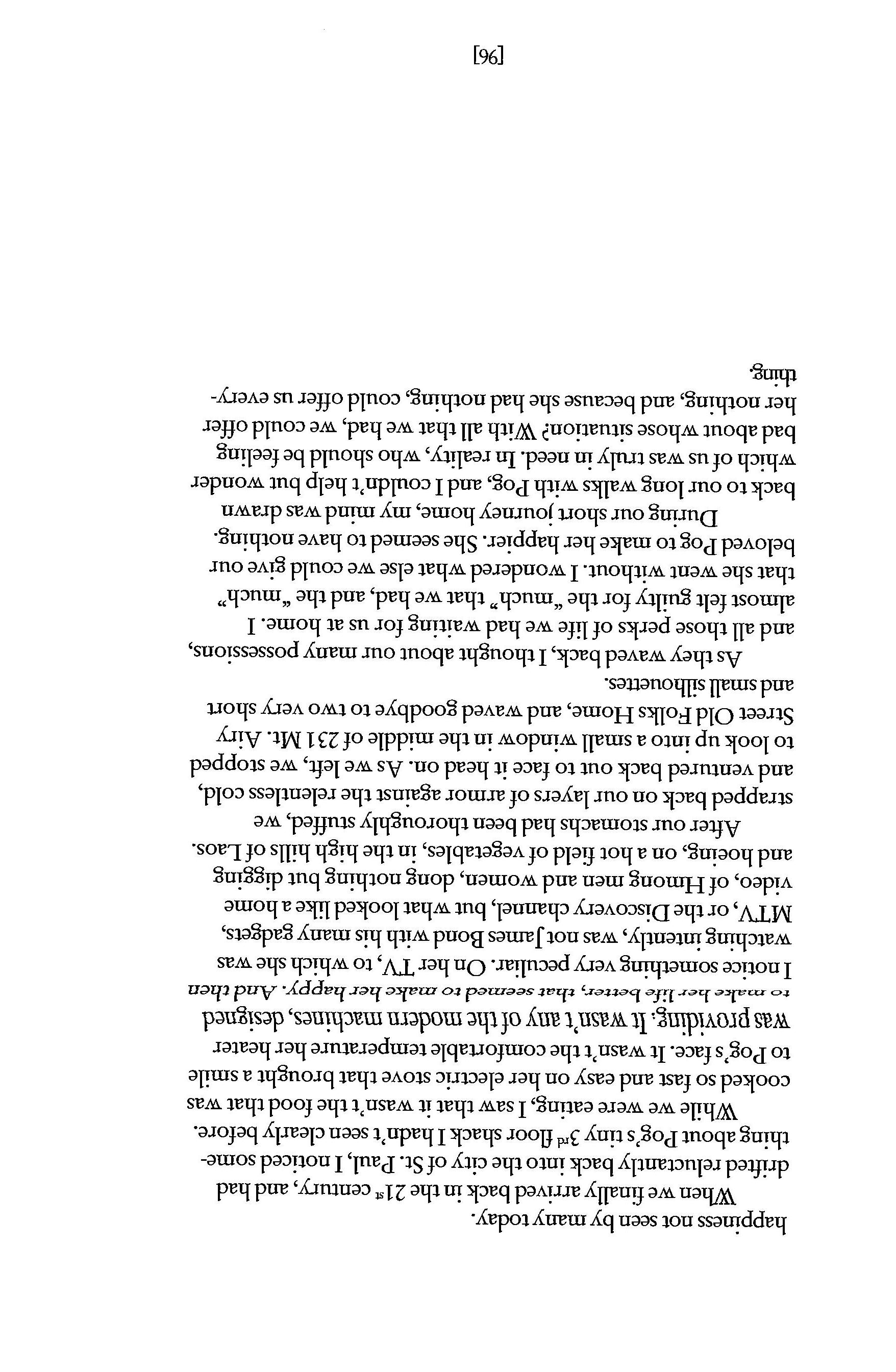
happiness not seen by many today.
When we finally arrived back in the 21 st century, and had drifted reluctantly back into the city of St. Paul, I noticed something about Pog' s tiny 3rd floor shack I hadn't seen clearly before.
While we were eating, I saw that it wasn't the food that was cooked so fast and easy on her electric stove that brought a smile to Pog' s face. It wasn't the comfortable temperature her heater was providing, It wasn't any of the modern machines, designed ,-.-, make her J;Je beuer, that seerned to rnake her happy. And then I notice something very peculiar. On her TV, to which she was watching intently, was not Jarnes Bond with his many gadgets, MTV, or the Discovery channel, but what looked like a home video, of Hmong men and women, dong nothing but digging and hoeing, on a hot field of vegetables, in the high hills of Laos.
After our stomachs had been thoroughly stuffed, we strapped back on our layers of armor against the relentless cold, and ventured back out to face it head on. As we left, we stopped to look up into a small window in the middle of 231 Mt. Airy Street Old Folks Horne, and waved goodbye to two very short and small silhouettes.
As they waved back, I thought about our many possessions, and all those perks of life we had waiting for us at home. I almost felt guilty for the "much" that we had, and the "much" that she went without. I wondered what else we could give our beloved Pog to make her happier. She seemed to have nothing.
During our short journey home, my mind was drawn back to our long walks with Pog, and I couldn't help but wonder which of us was truly in need. In reality, who should be feeling bad about whose situation? With all that we had, we could offer her nothing, and because she had nothing, could offer us everything.
